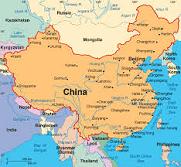
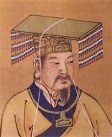
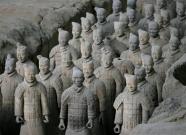
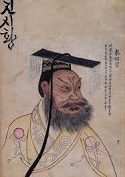
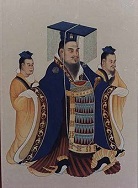





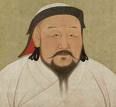

























TLW's Chinascope™ (China Historyscope) |
By T.L. Winslow (TLW), the Historyscoper™ |
© Copyright by T.L. Winslow. All Rights Reserved. |
Original Pub. Date: Mar. 16, 2017. Last Update: Jan. 2, 2023. |






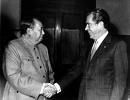



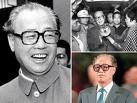






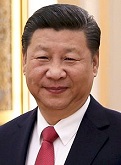
Westerners are not only known as history ignoramuses, but double dumbass history ignoramuses when it comes to China and Chinese history. Since I'm the one-and-only Historyscoper (tm), let me quickly bring you up to speed before you dive into my Master Historyscope.
China in E Asia has always enjoyed a splendid isolation that made it a closed society, which eventually gave it the mindset that it's the center of the world and of civilization itself, and that everything outside it is barbarian land. Their very name for China (Junggwo) means Center Country. Their mindset also favors the insect mentality, with individuality being discounted in favor of being a member of the hive, even the emperors. Too bad, Asia is the biggest continent, and eventually the teeming hordes found their way in via the north, wherever there's cheese there's always mice, which they partially fixed by building the Great Wall of China. Meanwhile a N-S split developed, with one side or the other trying to rule all. As the millennia went by, China and the West became more and more like polar opposites, especially with regard to religion, with a red dragon representing the Devil to Westerners, but good luck to the Chinese, and so on down the line, like mirror images. Too bad, failure to develop alphabetic writing, combined with their Twilight Zone 5th Dimension tone system of language enforced their isolation and increasing backwardness, compounded by overpopulation and inbreeding, it takes 1.x billion to make one 7 ft. 6 in. Yao Ming.
Until the West leaped ahead in Science and Technology and busted in with guns blazing, China was a closed society. "East is East, and West is West, and never the twain shall meet, till Earth and Sky stand presently at God's great Judgment Seat" - Rudyard Kipling (1865-1936). The good news is that China never wanted to take over the world, but just to be left alone, and in recent decades after the death of Mao Tse-tung, to trade with it, and as it catches up daily, it's enhancing its trading position, mixing Capitalism with Communism the Chinese Way. Since 2000 the advent of the Internet broke the barrier and allowed China to rocket ahead in Science and Technology, while the West got mired in interminable wars with resurgent Islam, draining it economically and causing it to turn to China for loans, let's face it, Chinese might own your company one day, if they already don't own your home.
Yes, China is also pumping up its military, but knowing er, history, I think they just want to make sure their trade and property are protected. It's mainly Westerners who long for some kind of misty union, on their terms, no tones or ideograms please, while others fear China for no specific reason. If there is going to be more closeness, it's the Internet that will carry the burden, and yes, it is shrinking the world, but Kipling's prophesy seems like it will continue to hold true for a century or three, we shall see.
China's origins are shrouded in mystery, and the earliest emperors are perhaps legendary, but there is no question of great antiquity.
According to geologists, the Yangtze River, 3rd longest in the modern world began to cut the Three Gorges area 45M years ago. Homo erectus Peking Man (Sinanthropus pekinensis) allegedly lived 500K years ago, at the same time as Heidelberg Man (Homo erectus sapiens heidelbergensis), the first homo sapiens. So the East-West split goes back to the origin of humanity itself, which even Bible-thumpers agree with, although they trace their divergence to the Tower of Babel a mere 4K years ago.
About 5000 B.C.E. the Neolithic Yangshao Culture along the Yellow River (Huang He) in China begins (ends -3000), growing millet, nuts, fruit, and vegetables, and raising pigs and dogs.
In 4000 B.C.E. domesticated millet is raised in N China. In 4000 B.C.E. domesticated animals incl. pigs, chicken, and dogs are domesticated in China. In 4000 B.C.E. the Chinese make Cheese and Yogurt using mold.
About 3000 B.C.E. theSan Huang (Three Emperors) (Three Sovereigns and Five Emperors) Dynasty is founded, ruling China for the next three cents.; the earliest known silk comes from Henan about this time?
In 3000 B.C.E. Nail Polish is invented in China. In 3000 B.C.E. Ma Huang, containing Ephedrine, closely resembling amphetamine is used by Chinese doctors. In 3000 B.C.E. the earliest writing in China is in the E province of Zhejiang.
In -2953 Fu Xi Shi (d. -2852) becomes the first San Huang emperor of China.

In -2852 Fu Xi decrees the use of surnames (family names), causing each Chinese person to have three names, the surname listed first and coming from one of the 438 words in the sacred poem Po-Chia-Hsing, then the generation name taken from a poem of 30 characters adopted by each family, followed by the given name; Fu Xi dies, and Shen Nong (Nung) Shi (Yan Di) (d. -2737) becomes San Huang emperor #2, the alleged father of Chinese agriculture and first herbal doctor, writing Shen Nong's Herbal Classic, the first Chinese herbal, declaring the five sacred plants to be rice, wheat, barley, millet, and soybeans.
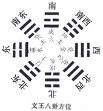
In -2737 tea is allegedly discovered when some leaves accidentally blow into Chinese emperor Shen Nong's pot of boiling water; Shen Nong dies, and Sui Ren Shi (d. -2697) becomes San Huang emperor #3, the alleged inventor of Chinese cooking along with Shen Nong. The N Chinese don't begin to practice tea drinking bigtime until the mid-8th cent. C.E. Tang Dynasty?
About -2700 the Sumerians invent the Abacus, followed by the Persians in -600, the Greeks in -500, and the Chinese in -200; the earliest known abacus dates to -300, the Salamis Tablet, discovered on the Greek island of Salamis in 1846.

In -2697 Sui Ren Shi dies; beginning of the reign of Huang Di (Ti) (Gongsun) (Xuan Yuan Shi) (d. -2597), AKA the Yellow Emperor, who allegedly founds the nation of China; he makes his capital at You Xiong; he orders his officer Can Ji to create Chinese Characters (kanji).
In -2640 Chinese Empress Hsi-ling Chi (Shi) allegedly discovers Sericulture after a cocoon falls from a mulberry tree into her tea cup, and it unravels as she tries to remove it; divulging the secret of sericulture becomes a treasonable death penalty offense, and the Chinese monopoly eventually makes it worth its weight in gold; the best silk comes from Bombyx mori moths, which each lay up to 500 pinhead-sized eggs, which hatch in 20 days, and begin munching mulberry leaves, growing 70X in 18 days after shedding their skin 4X and increasing their weight by 10KX; they then begin spinning secreting double strands of fibroin which are coated with gumlike sericin before coming out of the spinneret at the rate of 10-15 in. per min., or up to 1 mi. in 48 hours; it takes 100 cocoons to make a silk scarf, 140 to make a tie, and 9K to make a kimono - ooh, bite your tongue?
In -2640 Chinese royal astronomers Hsi and Ho are executed for dereliction of duty when they get drunk and fail to predict a solar eclipse; luckily, the dragon eating the Sun gets his fill and departs, even though the required noisemakers with gongs are not assembled to drive it away.
In -2597 Huang Di dies, and Shao Hao (Jin Tian Shi) (d. -2513) becomes Wu Di king of China; his capital is at Qiu Fu.
In -2513 Shao Hao dies, and Zhuan Xu (Gao Yang Shi) (d. -2435) becomes Wu Di king of China; his capital is at Diqiu.
In -2435 Zhuan Xu dies, and Di Ku (Gao Xin Shi) (d. -2365) becomes Wu Di king of China, making Haojing his capital in the Yanshi country of Henan.
In -2365 Di Ku dies, and Zhi Di (d. -2357) becomes Wu Di king of China.
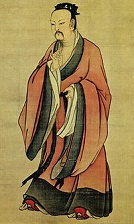
In -2357 Zhi Di dies, and Yao Di (Tang Yao) (d. -2255) becomes Wu Di king of China, making his capital at Qi, and allegedly inventing the game of Weiqi (Go) for his son Dan Zhu.
In -2255 Yao Di dies, and Shun Di (Yu Shun) (d. -2205) becomes Wu Di king of China, making his capital at Qi.

In -2205 Shun Di dies, and Xia Yu Di (Yu the Great) (d. -2197) founds the Xia (Hsia) Dynasty in China (ends -1783) (-2070 to -1600?) after he becomes a hero by controlling a catastrophic flooding of the Yellow River by dredging.
About -2200 iron anchor chains on ships are first used by the Chinese under Emperor Yu, two fore and two aft.
In -2197 Xia Yu Di dies, and his son Xia Qi (d. -2188) becomes Xia king #2 of China.
In -2188 Xia Qi dies, and his son Xia Tai Kang (d. -2159) becomes Xia king #3 of China, ruling from Zhen Xun (Gong Xian, Henen); the throne becomes hereditary.
In -2159 Xia Tai Kang dies, and Xia Zhong Kang (d. -2146) becomes Xia king #4 of China.
In -2146 Xia Zhong Kang dies, and Xia Xiang (d. -2079) becomes Xia king #5 of China, moving his kingdom to Shang.
In -2079 Xiao Xiang is assassinated by Han Zu, who is executed by Xia Shao Kang (d. -2057), who becomes Xia king #6 of China, awarding the Kingdom of Zeng to his youngest son Qu Lia.
In -2057 Xia Shao Kang dies, and Xia Zhu (d. -2040) becomes Xia king #7 of China.
In -2040 Xia Zhu dies, and Xia Huai (d. -2014) becomes Xia king #8 of China.
In -2014 Xia Huai dies, and Xia Man (d. -1996) becomes Xia king #9 of China.
In -1996 Xia Man dies, and Xia Xie (d. -1980) becomes Xia king #10 of China.
In -1980 Xia Xie dies, and Xia Bu Jiang (d. -1921) becomes Xia king #11 of China.
In -1921 Xia Bu Jiang dies, and Xia Pian (d. -1900) becomes Xia king #12 of China.
In -1900 Xia Pian dies, and Xia Li (d. -1879) becomes Xia king #13 of China.
In -1879 Xia Li dies, and Xia Kung Jia (d. -1848) becomes Xia king #14 of China.
In -1848 Xia Kung Jia dies, and Xia Bo (d. -1837) becomes Xia king #15 of China.
In -1837 Xia Bo dies, and Xia Fa (d. -1818) becomes Xia king #16 of China.
In -1818 Xia Fa dies, and Xia Jie (Hsia Chieh) (the Tyrant) becomes Xia king #17 of China; the first cruel Chinese king, he amuses himself by having 3K people drowned in a lake of wine - cruel, or euthanasia?
In -1783 the army of Shang Tang (d. -1753) surrounds decadent king Xia Jie (Hsia Chieh) at Xia Tai, and he is captured and exiled to Nanchao; the Hsia Dynasty (begun -2205) ends, and the Shang Dynasty begins (ends -1050), with capital at Anyang in the N Henan province, building walled cities with temples, and known for priest-kings who use elaborate bronze containers with bowed handles in their religious ceremonies - ah, you're no rich prince?
In -1753 Shang Tang dies, and Shang Tai Jia (d. -1720) becomes Shang king #2 of China.
In -1720 Shang Tai Jia dies, and Shang Wo Ding (d. -1691) becomes Shang king #3 of China.
In -1691 Shang Wo Ding dies, and Shang Tai Kang (d. -1666) becomes Shang king #4 of China.
In -1666 Shang Tai Kang dies, and Shang Xiao Jia (d. -1649) becomes Shang king #5 of China.
In -1649 Shang Xiao Jia dies, and Shang Yong Ji (d. -1637) becomes Shang king #6 of China.
In -1637 Shang Yong Ji dies, and Shang Tai Wu (d. -1562) becomes Shang king #7 of China.
In -1562 Shang Tai Wu dies, and Shang Zhong Ding (d. -1549) becomes Shang king #8 of China, moving the capital from Hao to Xico, and bringing an end to the Deng Kingdom.
In -1549 Shang Zhong Ding dies, and Shang Wai Ren (d. -1534) becomes Shang king #9 of China, dealing with a revolt by the Huai and Xian tribes.
In -1534 Shang Wai Ren dies, and Shang He Tan Jia (d. -1525) becomes Shang king #10 of China, moving the capital from Xico to Xiang.
In -1525 Shang He Tan Jia dies, and Shang Zu Yi (d. -1506) becomes Shang king #11 of China, moving the capital from Xiang to Geng to Xing.
In -1506 Shang Zu Yi dies, and Shang Zu Xing (d. -1490) becomes Shang king #12 of China.
Aout -1500 Bells are made in China.
In -1490 Shang Zu Xing dies, and Shang Wo Jia (d. -1465) becomes Shang king #13 of China.
In -1465 Shang Wo Jia dies, and Shang Zu Ding (d. -1433) becomes Shang king #14 of China.
In -1433 Shang Zu Ding dies, and Shang Nan Geng (d. -1408) becomes Shang king #15 of China.
In -1408 Shang Nan Geng dies, and Shang Yang Jia (d. -1401) becomes Shang king #16 of China.
In -1401 Shang Yang Jia dies, and Shang Pan Kang (d. -1372) becomes Shang king #17 of China, moving the capital from Yan to Beimeng.
In -1372 Shang Pan Kang dies, and Shang Xiao Xing (d. -1352) becomes Shang king #18 of China.
In -1349 Shang Ziao Sing dies, and Shang Xiao Yi (d. -1324) becomes Shang king #19 of China.
In -1324 Shang Xiao Yi dies, and Shang Wu Ding (d. -1265) becomes Shang king #20 of China.
In -1265 Shang Wu Ding dies, and Shang Zu Geng (d. -1258) becomes Shang king #21 of China.
In -1258 Shang Zu Geng dies, and Shang Zu Jia (d. -1235) becomes Shang king #22 of China.
In -1235 Shang Zu Jia dies, and Shang Bing Xing (d. -1219) becomes Shang king #23 of China.
In -1219 Shang Bing Xing dies, and Shang Geng Ding (d. -1198) becomes Shang king #24 of China.
In -1198 Shang Geng Ding dies, and Shang Wu Yi (d. -1194) becomes Shang king #25 of China (until -1194), becoming known for his cruelty and arrogance, playing a game of Liubo against God - on the last day of his life?
In -1194 Shang Wu Yi dies, and Shang Tai Ding (d. -1192) becomes Shang #26 king of China.
In -1192 Shang Tai Ding dies, and Shang Di Yi (d. -1154) becomes Shang king #27 of China.
In -1154 Shang Di Yi dies, and Shang Zhou (d. -1134) becomes Shang king #28 of China; the cruelest king in Chinese history?; known for the invention of chopsticks (kuaizi) (bad luck to leave them standing in food straight up?) - ouch that must hurt?
In -1134 Shang Zhou dies, and Chou-hsin (d. -1122) becomes Shang king #29 of China, becoming known as an evil debauched despot who is into tasty aphrodisiacs, incl. Hunting Lion (bear paws, rhino horn, human urine), Celestial Thunder (peacock tongues, chili powder, sperm from teen boys), and Three-Day Glory (soy beans, ginseng, ox penis, dried human placenta). About this time the first cast copper coins are produced in China under the Shang Dynasty.

In 1,122 B.C.E. Zhou Wu Wang (d. -1119) (-1046 to -1043?) and his father Wen revolt against Chou-hsin, ending the Shang Dynasty and founding the Xi (Northern) Zhou (Chou) Dynasty (China's 3rd dynasty) (ends -256), awarding Korea to Chinese prince-scholar Qi Zi (Ji-zi) (Ki Tse), who founds the independent Kingdom of Choson (Chosen) (Joseon) (ends -194/-108). about this time the city of Peiping (later Peking and Beijing) ("northern capital") (modern pop. 18.6M/24.9M) in NE China 90 mi. NE of the Gulf of Pohai and 12 mi. W of the Pei River is founded as a frontier outpost; it is walled about 1045 B.C.E.
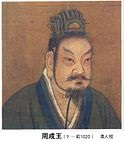
In -1043 Zhou Wu Wang dies, and next year his son Zhou Cheng Wang (d. -1006) becomes Xi Zhou king #2 of China, with his uncle the Duke of Zhou as his regent, going on to establish the capital in Luoyang, defeat several barbarian tribes along the border, and defeat a rebellion by his uncles Cai Shu, Guan Shu, and Huo Shu.
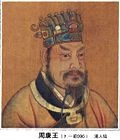
In -1006 (1020?) Cheng dies, and next year his son Kang of Zhou (d. -978) becomes Zhou king #3 of China.
By the 10th cent. B.C.E. the Chinese use moldy soybean curd as an antibiotic on wounds.
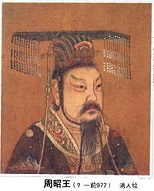
In -978 Zhou Kang Wang dies, and next year his son Zhou Zhao Wang (Ji Xia) (d. -957) becomes Xi Zhou king #4 of China, going on to wage a disastrous war with the Chu confederation, ending his dynasty's expansion and starting its decline.
In -957 Zhou Zhao Wang dies, and in -956 his son Zhou Mu Wang (d. -918) becomes Xi Zhou king #5 of China.


We're up to 1000 B.C.E., and don't say it, my head is swimming with Chinese alphabet soup too. Guess what, it only gets worse.
In -936 Zhou Mu Wang dies, and Zhou Gong Wang (d. -934) becomes Xi Zhou king #6 of China.
In -934 Zhou Gong Wang dies, and Zhou Yi Wang (d. -909) becomes Xi Zhou king #7 of China.
In -909 Zhou Yi Wang dies, and Zhou Xiao Wang (d. -894) becomes Xi Zhou king #8 of China, ordering the Duke of Shen to attack the Quan Rong in NW China.
On Apr. 21, -899 there is a solar eclipse, causing a "double dawn" over Zheng, China.
In -894 Zhou Xiao Wang dies, and Zhou Yi Wang (d. -878) becomes Xi Zhou king #9 of China.
In -878 Zhou Yi Wang dies, and Zhou Li Wang (d. -827) becomes Xi Zhou king #10 of China.
In -827 Zhou Li Wang dies, and Zhou Xuan Wang (d. -781) becomes Xi Zhou king #11 of China.
In -800 the Axial (Axis) Age of Karl Jaspers begins (ends -200), when "the great world traditions that have continued to nourish humanity came into being: Confucianism and Daoism in China; Hinduism and Buddhism in India; monotheism in Israel; and philosophical rationalism in Greece", and where "What mattered was not what you believed but how you behaved", and the concept of kenosis (Greek for emptying), "spirituality of self-surrender" is the goal.
In -781 Zhou Xuan Wang dies, and Zhou You Wang (d. -771) becomes Xi Zhou king #12 of China.
In -771 northern barbarians overrun the Western Chou Dynasty; Zhou You Wang dies, ending the Xi Zhou Dynasty, and Zhou Ping Wang (d. -720) founds the Dong (Western) Zhou Dynasty in China; the capital is moved to the capital is moved to Luoyang (Loyang) at the confluence of the Luo and Yellow Rivers, beginning the Spring and Autumn Period of the Xi Zhou (Chou) Dynasty (ends -401); dukes become powerful and establish their own kingdoms.
In June -770 the first Dragon Boat Race is held at Dongting Lake on the banks of the Yangtze River.
In -753 the Old Guo Kingdom is reestablished in China.
In -722 the Chun Qiu (Ch'un-Ch'iu) (Chin. "spring and autumn") chronological record is started in China, recording events of the reigns of 12 rulers of Lu till just before Confucius' death in -479.
In -720 Zhou Ping Wang dies, and Zhou Huan Wang (d. -697) becomes Dong Zhou king #2 of China.
In -697 Zhou Huan Wang dies, and Zhou Zhuang Wang (d. -682) becomes Dong Zhou king #3 of China.
In -685 Guan Zhong (Yiwu) (-725 to -645) of Yingshang is appointed PM of China by Duke Huan of Qi, going on to modernize the state, switch from hereditary to prof. administrators, and create state monopolies on salt and iron.
In -682 Zhou Zhuang Wang dies, and Zhou Xi Wang (d. -676) becomes Dong Zhou king #4 of China.
In -676 Zhou Xi Wang dies, and Zhou Hui Wang (d. -651) becomes Dong Zhou king #5 of China.
In -661 the Jin eliminate the Wei Kingdom and the Huo Kingdom, followed in -655 by the Guo Kingdom and the Yu Kingdom.
In -651 Zhou Hui Wang dies, and Zhou Xian Wang (d. -619) becomes Dong Zhou king #6 of China.
In -632 the Duke of Jin unites the remaining Chinese kingdoms and defeats the Chu in the Battle of Cheng Pu.
In -619 Zhou Xian Wang dies, and Zhou Qing Wan (d. -612) becomes Dong Zhou king #7 of China.
In -612 Zhou Qing Wang dies, and Zhou Kuang Wang (d. -606) becomes Dong Zhou king #8 of China.
In -606 Zhou Kuang Wang dies, and Zhou Ding Wang (d. -585) becomes Dong Zhou king #9 of China.
In -585 Zhou Ding Wang dies, and Zhou Jian Wang (d. -571) becomes Dong Zhou king #10 of China.
In -571 Zhou Jian Wang dies, and Zhou Ling Wang (d. -544) becomes Dong Zhou king #11 of China.
In -551 the period of the One Hundred Schools of Thought begins in China (ends -23), in which all the major schools of Chinese thought are founded - compare, bundle, and save?
In -544 Zhou Ling Wang dies, and Zhou Jing Wang (d. -519) becomes Dong Zhou king #12 of China.
In -519 Zhou Jing Wang dies, and Zhou Jing Wang (d. -476) becomes Dong Zhou king #13 of China.
In -476 Zhou Jing Wang dies, and Zhou Yuan Wang (d. -468) becomes Dong Zhou king #14 of China.
In -468 Zhou Yuan Wang dies, and Zhou Zhen Ding Wang (d. -441) becomes Dong Zhou king #15 of China.
In -441 Zhou Zhen Ding Wang dies, and Zhou Ai Wang (d. -441) becomes Dong Zhou king #16 of China; he dies, and Zhou Si Wang (d. -440) becomes Dong Zhou king #17 of China.
In -440 Zhou Si Wang dies, and Zhou Kao Wang (d. -425) becomes Dong Zhou king #18 of China.
In -431 the Chu Kingdom eliminates the Lu Kingdom.
In -425 Zhou Kao Wang dies, and Zhou Wei Li Wang (d. -401) becomes Dong Zhou king #19 of China.
In -403 the state of Jin in Shanxi in NE China is partitioned among three landholding families, and the state of Chao (Zhao) (ends -222) in NE and C Shanxi and SW Hopeh is founded by Chao Chi, while Confucian marquis Wen of Wei (d. -387) becomes ruler of the state of Wei.
In -401 Zhou Wei Li Wang dies, and his son Zhou An Wang (d. -376) becomes Dong Zhou king #20 of China (until -376); the Spring and Autumn Period (begun -771) ends, and the Warring States Period begins among the seven states in the Zhou (Chou) Dynasty in China (ends -221).
About -400 the Shun-Hai Ching (Sun-Hai King) (Classic of Mountains and Seas) (Mountain-Sea Classic) is written by a group of Chinese scholar-explorers, becoming the oldest secular book on Earth, describing 550 mountains and 300 channels in 18 sections; it describes fantastic creatures such as a 1-armed tusked ("spears of pearl") red giant as tall as three men, and a small grey pig with a white collar and teeth of pearls; did they visit America and see woolly mammoths and peccaries?
In -375 the Zheng Kingdom in China is eliminated by the Han Jingdom, er, Kingdom. In -375 Zhou An Wang dies, and Zhou Lie Wang (d. -368) becomes Dong Zhou king #21 of China.
In -368 Zhou Lie Wang dies, and Zhou Xian Wang (d. -320) becomes Dong Zhou king #22 of China. In -350 he makes Xiangyang in Hubei Province his capital, and institutes an agricultural tax. Also in -350 Shang Yang becomes PM of Qin under Duke Xiao, going on to standardize weights and measures, and build the Shang Yang Canal.
In -320 Zhou Xian Wang dies, and Zhou Shen Ling Wang (d. -314) becomes Dong Zhou king #23 of China.
In -314 Qi Xuan Gong invades and almost conquers the Yan Kingdom in N China until the Qi troops commit so much misconduct that a revolt drives tham out; Zhou Shen Ling Wang dies, and Zhou Nan Wang (Ji Yan) (d. -255) becomes Dong Zhou king #24 of China.
In -305 the earliest known Multiplication Tables are inscribed on bamboo strips in China.
About -300 the Magnetic Compass first appears in China, but it is used to determine propitious burial of the dead, not navigation until 1119 C.E..
In -278 discredited Chinese statesman Qu Yuan (b. -348) commits suicide by jumping into the Mi Luo (Miluo) River in Hunan Province; the Chinese Autumn Festival is established to commemorate him.
In -265 Tian Dan uses the Fire Cattle Columns military tactic to reestablish the Qi (Chi) Kingdom in W China.
In -255 Zhou Bao Wang dies, and Zhou Hui Wang (d. -249) becomes Dong Zhou king #25 (last) of China.
About -250 the port of Shanghai ("upon the sea") (modern-day pop. 24M/34M) in the Yangtze River Delta in C China on the East China coast is greatly improved by the excavation of the Huangpu (Chunshen) River on the orders of Lord Chunshen (d. -238), PM of the Kingdom of Chu during the Warring States Period of China, causing Shanghai to be nicknamed Shencheng ("City of Shen").
In -246 13-y.-o. Ying Zheng (-259 to -210) becomes emperor of Qin (Ch'in) (until -210) under regent Lu Buwei (until -237).
In -225 the Chinese state of Qin (Ch'in) in China conquers the Kingdom of Wei.

In -221 Ying Zheng conquers the last pesky state of Ch'i (Qi), proclaiming himself emperor Qin Shi Huang Di (Shih Huang-ti) (Shih Hwang-ti) (-259 to -210) of the new think-happy-thoughts Qin (Ch'in) Dynasty (ends -206), ending the Warring States Period in China (begun in -401); all weights and measures are unified; from now until ? China lives in splended isolation, surrounded by sea, malarial jungles, deserts, and mountains, with no agrarian city-possessing neighbor to compete with it.
In -214 the city of Guangzhou (Canton) (originally Panyu) (modern-day pop. 14M/25M) is founded on the E bank of the Pearl River 75 mi. NNW of Hong Kong and 90 mi. N of Macau by the Qin as a military base for their first unsuccessful invasion of the Baiyue lands of S China; in 226 C.E. after being incorporated into the Han Empire, it becomes the seat of Guang Prefecture, becoming known as the Rice City, City of the Immortals, City of the Five Rams, and City of Flowers.

In -214 Chinese emperor Qin Shi Huang Di conquers N Vietnam, dividing it into three commandaries; he then orders construction of the the 1.4K-mi.-long Great Wall of China (Wanli Changcheng) (not really visible from space?) to protect Ch'in from the Huns of C Asia, who have advanced the art of war with ironware, stirrups, the long-range bow, and stiff military discipline.

Do the math and save? In -210 Chinese emperor Qin Shi Huang Di (Ch'in Shih Huang Ti) (b. -259) dies suddenly on an inspection tour, and his son Hu Hai becomes Qin emperor #2 of China under the name Qin Er Shi Huang Di (Ch'in Er Shih Huang Ti) (Qin Shihuang) (d. -207); to protect him in the afterlife the Terracotta Army of Emperor Qin Shi Huang Di of 7K lifesize figures (soldiers and horses in military rank) (discovered in 1974) is built in the capital of Xi'an in NW China (at the E end of the Silk Road) in the first emperor's memorial; it takes 700K conscripts 38 years to build; it really belonged to his ancestor Empress Xuan, who died in -314?; Qin Er Shi Huang Di orders his daddy's childless concubines to be buried with him (a "very great" number of people).
In -209 Chinese PM Zhao Gao (d. -207) plots to seize the throne, forcing emperor Qin Er Shi Huang Di to commit suicide in -207; the first peasant rebellion in Chinese history is led by Chen Sheng and Wu Guang Xing, but they are killed.
In -209 Mongolian-born Modu Chanyu (Maodun) (-234 to -174) founds the Hun Confederacy (Xiongnu Empire) in the C Asian borderlands of China among the Xiongnu, which threatens the Hans and dominates C Eurasia (until 100 C.E.).
In -207 Qin Er Shi Huang Di commits suicide, and his nephew Zi Ying (d. -206) becomes Qin emperor #3 (last) of China (until Jan. -206), ordering Zhao Gao's death.

In -206 the unpopular Ch'in (Qin) Dynasty (founded -221) is overthrown by the Han Dynasty (ends 220 C.E.); Zi Ying is executed; Liu Bang (d. -194) and Xiang Yu (-232 to -202) become the first rival emperors of the Xi (Western) Han Dynasty in China under the titles Han Gao Zu and Chu Ba Wang.
In -200 Emperor Han Gao Zu of China makes Chang'an (Changan) in Shaanxi Province near Xi'An at the E terminal of the Silk Road his capital.
In -194 Han Gao Zu (Liu Bang) dies, and weak 17-y.-o. Han Hui Di (-211 to -188) becomes Xi Han emperor #3 of China (until -188); Queen Han Lu Hou takes over the admin., and kills Prince Zho (Zhao) and his concubine Qi.
In -188 Han Hui Di (b. -211) dies, and Han Lu Hou (d. -179) becomes Xi Han emperor #4 of China; Queen Lu Hou stays in charge of the admin., and appoints Chen Ping and Shen Shi Qi as her left and right ministers.
In -179 Han Lu Hou dies, and after the Lu Clan Extermination, prince of Dai Han Wen Di (Liu Heng) (d. -157) (son of Consort Bo, who has no powerful relatives and is known for humility and thoughtfulness) becomes Xi Han emperor #5 of China, appointing Chen Ping (d. -178) and Zhou Bo (d. -169) as his left and right ministers.
In -156 Han Wen Di dies, and Prince Liu Sheng becomes Han Jing Di (-181 to -141), Xi Han emperor #6 of China (until -141).
In -154 the Rebellion of the Seven Kings of Wu and Chu, led by Duke Wu takes place in China after Emperor Han Jing Di kills Wu's son Prince Xian (the emperor's cousin) over a game of Liubo.

On Mar. 9, -141 Han Jing Di dies, and Liu Che becomes Han Wu Di (-156 to -87), Xi Han emperor #7 of China (until Mar. 29, -87); Han Jing Di is buried in a tomb 95 mi. from Peking in a fabulous jade suit, with 2K plates sewn together with gold wire, along with 2.8K expensive funeral offerings; his wife Tou Wan has to wait until -104 to get her jade immortality suit. In -130 Han Wu Di establishes an admin. with scholars and a civil system; meanwhile Zhang Du's expedition helps open the 4K-mi. Silk Road, stretching from E China through Edessa to the Mediterranean Sea (finished -115).
In -111 China conquers Nam Viet AKA Viet Nam, ending the Trieu Dynasty (begun -208), and renaming the country Giao-Chi (Jiaozhi), ruling Vietnam for 1K years (until 938 C.E.).
In -109 to -91 Sima Qian (-145 to -85) writes Records of the Grand Scribe (130 vols.), becoming first universal history of China, covering from the Yellow Emperor to his time.
In -108 China conquers Korea.
In -104 Princess Tou Wan (Douwan) dies, and joins her hubby in her own 208-piece jade suit, which is discovered in 1968; the immortality thing doesn't work, and she crumbles to dust?
About -100 the first Chinese ships reach the E coast of India.
In -86 Han Wu Di (b. -156) dies, and Han Zhao Di (d. -74) becomes Xi Han emperor #8 of China.
In -74 Han Zhao Di dies without an heir, and Prince Liu He of Changyi (d. -59) becomes Xi Han emperor #9 for 47 days before being deposed and labelled the Marquess of Haihun (Chin. "maritime incompetence") by minister Huo Guang (d. -68) for the good of the state (first deposition in Chinese history), and rags-to-riches commoner Xuan (-91 to -49), whose grandfather Liu Ju committed suicide after being accused of witchcraft in -91 becomes Xi Han emperor #10 of China (until -49), going on to lower taxes and open up the govt. and fill it with capable ministers.
In -49 Han Xuan Di (b. -91) dies, and Han Yuan (Chin. "discerning") Di (Liu Shi) (-75 to -33) becomes Xi Han emperor #11 of China (until -33), going on to promote Confucianism as the official creed of the govt. while the inlaws of empress Wang Zhengjun (-69 to 13) become powerful.
In -33 Han Yuan Di (b. -75) dies, and his son Prince Ao becomes Chengdi (-51 to -7), Xi Han emperor #12 of China (until -7), going on to let the Wang clan close its grip on power while corruption and greed plague his govt.
In -7 Cheng (b. -51) dies childless, and his nephew Ai (Chin. "lamentable") Di (Xin Liu) (-27 to 1) becomes Xi Han emperor #13 of China (until 1).
In 1 C.E. Ai Di (b. -27) dies childless, and his 9-y.-o. cousin Ping Di (-9 to 6) becomes Xi Han emperor #14 of China (until 5), with learned Confucian scholar Wang Mang (-45 to 23) as regent.
In 5 C.E. teenie Han emperor Ping (b. -9) is poisoned by his regent Wang Mang, who puts infant Han Ruzi Ying (Ying the Kid) (Liu Ying) (5-25) on the throne (until 9), becoming the last emperor of the Western Han (Xi Han) Empire (founded in -206).
In 9 C.E. Wang Mang finally usurps the throne from the Liu family, deposing and killing young emperor Ruzi (b. 5), and founding the Xin (Hsin) (New) Dynasty (ends 23), attempting to found a truly Confucian society by dissolving the large tax-free estates and distributing the land to peasants, and abolishing the sale of slaves and fields, causing many Han families to flee to Vietnam, changing the govt. from bilaterial kin to patriarchal control; too bad, the radical reforms alienate the establishment and are plagued by a string of natural disasters; Wang Mang has a scout bound with bird feathers and launched from a tower, sailing 100m.
In 18 C.E. the Rebellion of Chimei (Red Eyebrows), led by Liu Xuan (d. 25) begins (ends 27) as the Red Eyebrows rebel band of vagrants raises Hell. in 22 members of the Han royal house join the rebels.
In Oct. 23 C.E. a large peasant army attacks Wang Mang's capital of Chang'an, causing him and his 1K courtiers to fight to the last man, after which the imperial palace is sacked.

In 25 C.E. Liu Xuan dies, and Green Woodsmen rebel prince Liu Xiu of Huaiyang goes on to defeat the peasant Chimei (Red Eyebrows) army by 27, reunifying China and becoming Guangwu (Guang Wudi) (Chin. "military restorer") (-5 to 57), emperor #1 of the Dong (Later or Eastern) Han Dynasty; he goes on to institute some land and other reforms to correct the problems that caused the old Xi (Western) Han Dynasty to disintegrate, giving the Han Dynasty another 200-year lease of life; Buddhism is introduced to China, and mild state policies allow the economy to recover; the Yin School of Taoism produces bestselling works, incl. Yu Fang Mi Chueh (Secret Codes of the Jade Room), claiming to be able to visualize a woman's private parts from her facial features - the nose corresponds to what?

In 39 C.E. after a Chinese cmdr. rapes Trung Trac and kills her hubby, Vietnamese sister-queens Trung Trac and Trung Nhi AKA the Trung Sisters rebel against China, forming an army of 80K men and women, setting up their own independent kingdom next year (until 42) extending from the Hue River N to S China, with court at Me-linh on the Hong (Red) River, abolishing the hated Chinese tribute taxes.
In 42 C.E. the Chinese under Gen. Ma Yuan "the Wave Tamer" (-14 to 49) invade pesky Vietnam and conquer sisters Trung Trac and Trung Nhi, along with their female comrade Phung Thi Chinh (who delivers a baby while leading an army, never skipping a beat), who all commit suicide by jumping into a river, becoming symbols of Vietnamese resistance to the Chinese; Vietnam remains under Chinese control until 938.
By 57 C.E. famine has caused the pop. of China to decrease drastically, from 59M in 1 C.E. to 21M. On Mar. 29, 57 C.E. Han Guan Wu Di (b. -5) dies, and his 2nd son Han Ming Di (Ming Ti) (28-75) becomes Dong (Eastern) Han) emperor #2 of China (until 75).
In 66 C.E. Chinese emperor Ming Di orders the construction of the White Horse Temple 3 li (7 mi.) W of Luoyang, named for the horse that carried back the Buddhist sutras, becoming the first Buddhist temple in China; this year or last the emperor's half-brother Prince Liu Ying of Chu (-71) (son of emperor Guangwu of Han) becomes the first noble Chinese Buddhist. Meanwhile in 64 C.E. the first Christians allegedly arrive in China.
In 75 C.E. Han Ming Di (b. 28) dies after ordering that no separate temple to worship him be built (a good money-saving idea, adopted by later Dong Han emperors), and his son Crown Prince Da Liu succeeds as Zhang Di (Chang-ti) (Chin. "polite") (Da Liu) (57-88), Dong Han emperor #3 of China (until 88), going on to reduce taxes and govt. spending, promote Confucianism, and bring a golden age; Ban Chao is sent to explore the Wild West, reaching as far as Persia and Rome.
In 82 C.E. dowager empress Dou ("polite and virtuous") Xin (Zhangde) (-97) (not to be confused with the other empress Dou who dies in 135) alters the Han succession in favor of her brothers Dou Xian and Dou Du, becoming the first time that the clan of the empress rules, setting a precedent; when emperor Zhang Di gets pissed-off at her arrogance, she apologizes for not wearing concubine clothes.
In 88 C.E. Han Zhang Di (b. 57) dies, and his 9-y.-o. son Crown Prince Zhao Liu succeeds as Han He (Chin. "moderate") Di (79-105), Dong Han emperor #4 of China (until 105), presiding over the beginning of the decline of the empire as his adoptive mother dowager empress Dou Xin (widow of Zhang Di) promotes her family into govt. positions and corrupts the govt.
In 92 C.E. He Di overthrows and kills dowager empress Dou Xin's brother Dou Xian (Tou Hsien), and defangs her; too bad, he uses the help of eunuch Zheng Zhong (-107) and his brother Prince Liu Qing of Qinghe (78-106), setting a precedent for future eunuchs to get involved in politics that ends up bringing the Han Dynasty down in 220.
In 97 C.E. Chinese Han gen. Ban (Pan) Chao (32-102) crosses the Tian Shan and Pamir Mts. with a 70K-man army and campaigns against the Huns (Xiongnu), who are harassing the Silk Road; after making an alliance with Parthian king Pacorus II and establishing a base on the shores of the Caspain Sea and another in Antiochia Margiana (Merv) (E outpost of the Parthian Empire), Ban Chao sends envoy Kan (Gan) Ying to Rome (Chin. "Daqin"), but he only makes it as far as the Black Sea before being convinced to turn back by Parthian traders, becoming the Chinese to travel the farthest West in antiquity, later writing the first Chinese account of Europe.
About 100 C.E. the Chinese begin using crushed chrysanthemum flowers (active ingredient pyrethrum) to kill insects, becoming the first Insecticide.
On Feb. 13, 105 Han He Di (b. 79) dies, and his 3-mo.-old son Han Shang (Chin. "short-lived") Di (-106) becomes Dong Han emperor #5 of China (until 106), with dowager empress Deng Sui (Hexi) (Chin. "moderate and pacifying empress") (81-121) (He Di's 2nd wife) as regent, becoming the last effective ruler of the crumbling Dong (Eastern) Han Dynasty.

In 105 Chinese eunuch Cai Lun (T'sai-lun) (50-121) invents felted sheeted fiber paper made of tree bark, hemp, cloth rags, and fishing nets, replacing bamboo and silk tablets - this gives the Jesus Christ scam away, since if he really was the Son of God, and needed his message spread fast, he would have invented papermaking, printing presses, and maybe copyright and trademark protection for his new world-domination church instead of relying on godless heathens to do it for him, and blind luck to transmit the knowledge to his believers?
In Aug.-Sept., 106 Shang Di dies, and 12-y.-o. Prince Hu Liu (grandson of emperor Zhang Di) succeeds as Han An (Chin. "peaceful") Di (94-125), Dong Han emperor #6 of China (until 126), with his stepmother dowager empress Deng Sui remaining as regent until her death in 121; Japan sends an ambassador.

In 120 C.E. Chinese astronomer Zhang (Chang) Heng (78-139) pub. Ling Xian, which describes solar and lunar eclipses, and supports the theory that the Moon reflects sunlight; "The Sun is like fire and the Moon like water: the fire gives out light and the water reflects it." In 132 C.E. he invents the first Seismograph, a bronze urn with dragon mouths that drop a ball in the direction of the earthquake into the mouth of a bronze frog.

In 121 dowager empress Deng Sui dies, and her stepson An Di immediately purges the govt. of her relatives, making many commit suicide; too bad, he prefers women and drinking to affairs of state, leaving the govt. to his corrupt eunuchs and his wife empress Yan Ji (Ansi) (Chin. "peaceful and deep-thinking empress") (-126) and her corrupt family (first Han emperor to encourage corruption?); meanwhile droughts cause peasant revolts.
In 126 10-y.-o. Prince Bao Liu (only son of An Di) becomes Shun (Chin. "serene") Di (115-44), Dong Han emperor #7 of China (until 144), turning over the govt. to the corrupt eunuchs, who get good eunuch Sun Cheng removed from the capital for trying to stop them. In 128 Sun Cheng returns to the Chinese capital, but never gets anywhere in attempting to reform all the bad eunuchs running the govt. into the ground.

In 132 after being talked out of drawing lots to let the gods decide, 19-y.-o. Chinese Han emperor Shun Di picks his 16-y-o. consort Liang Na (Shunlie) (Chin. "kind and achieving") (116-50) as empress, who goes on to earn a good rep.
In 135 the Dong Han Chinese govt. permits eunuch marquesses to pass their marches to their adopted sons; meanwhile Liang Na's father Liang Shang, Marquess of Chengshi (-141) becomes CIC of the armed forces, beginning the rise of the Liang family. In 136 govt. corruption causes a number of rebellions in S China (until 138); many rebel gens. surrender willingly if the corrupt officials are replaced by Shung Di.
In 138 a eunuch conspiracy against Shun Di is discovered, and Liang Shang intercedes to advocate leniency. In 144 Shun Di (b. 115) dies, and his only son Prince Liu Bing (by Consort Yu) Chong (Chin. "young-ruling") Di (143-5) becomes Dong Han emperor #8 of China, with dowager empress Liang Na as regent; too bad, army CIC Liang Ji is trusted too much, giving him his big chance to do the quick step.
In 145 3-y.-o. Chinese emperor Chong (b. 143) dies after reigning less than 6 mo., and his 7-y.-o. 3rd cousin Zhi (Chin. "upright") Di (138-46) becomes Dong Han emperor #9 of China (until 146).
In summer 146 Zhi Di (b. 138) is poisoned by Liang Ji for blinking at him and calling him "an arrogant general", giving him poisoned soup then refusing his request for water to ease the pain; he then pressures his sister, dowager empress Liang Na to make 14-y.-o. Liu Zhi, Marquess of Liwu (great-grandson of Zhang Di) (fiancee of Liang Ji's younger sister Lian Nuying) the new emperor, and he is crowned Huan (Chin. "diligent") Di (132-68), Dong Han emperor #10 (until 168).
In 166 Chinese univ. students protest govt. corruption and call on Huan Di to remove corrupt officials, but he instead orders their arrest; meanwhile the First Roman Embassy to China is sent along a sea route, and is greeted by Huan Di in Luoyang (2nd in 284) - the original Richard Nixon and Mao?
In 168 Huan Di (b. 132) dies, and 12-y.-o. Ling (Chin. "inattentive") Di (156-89), great-great-grandson of Zhang Di becomes Dong Han emperor #11 of China, with Dowager empress (Huan Di's 3rd wife) Dou Miao (Huansi) (Chin. "diligent and deep-thinking") (-172) as regent; too bad, her Confucian scholar father Dou Wu (-168) and fellow scholar Chen Fen (-168) attempt to curb the eunuchs and install Confucian scholars in govt. posts, and are defeated in battle and commit suicide, and the eunuchs dominate again, with Zhang Rang (-189) as leader of the Ten Eunuchs (Ten Regular Attendants).

In 184 the Yellow Turban Revolt (Yellow Scarves Rebellion) by Taoist (Daoist) leader Zhang Jue (Chang Chueh) (Zhang Jiao) (-184) against the eunuch-controlled Dong Han Dynasty begins (ends 204), causing poor-but-clever (with royal blood in his veins) Liu Bei (Xuande) (161-223) to see his chance and raise a volunteer army to fight the rebels, obtaining the backing of two wealthy horse merchants and gaining several Vs, then being rewarded with appointment as prefect of Anxi in Zhongshan, which he resigns after refusing to work for a corrupt inspector, the fighting more rebels in Jiangsu, which gets him appointed as prefect of Gaotang, after with the 14th cent. novel "Romance of the Three Kingdoms" portrays him as the ideal benevolent human ruler.


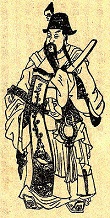
In 189 Ling Di (b. 156) dies, and after #2 eunuch Jian Shuo (-189) sets a trap to kill He Jin (-189), elder brother of empress He (Lingsi) (Chin. "unattentive and deep-thinking") (-189) (Ling Di's 2nd wife) and make Ling Di's younger son Prince Xie Liu the emperor, He Jin learns of it and declares Lang Di's elder son Prince Liu Bian of Hong as Dong Han emperor #12 Shao (Chin. "young") Di (176-90) (until 189), with He and He Jin as regents; too bad, the eunuchs get He Jin assassinated, causing warlord Dong Zhuo (-192) to seize control of the capital Luoyang; hearing the good news, a mob led by pissed-off officials He Jin, Yuan Shao (Benchu) (-202) and Cao Cao (155-220) invades the capital of Liuyang to dispose of the Ten Eunuchs, who get He Jin beheaded in the palace courtyard then kidnap the new emperor and his brother, future emperor Xian Di, but get surrounded, after which head eunuch Zhang Rang jumps in the Yellow River and drowns, and the other eunuchs are executed; Dong Zhuo gains control over the Han Dynasty and moves the capital to Changan, removing Shao Di and making his brother Liu Xie into Dong Hong emperor #13 (last) Xian (Chin. "wise") Di (181-234) (until 220).
On May 22, 192 Dong Zhuo is assassinated by his adoptive son Lu Bu (-198), "the Flying General" (the Chinese Achilles) (master of horseback riding and archery, known for wielding his Sky Piercer atop his steed Red Hare) after a plot by interior minister Wang Yun; Xian Di becomes a puppet of the feuding warlords. In 196 Cao Cao of Wei (155-220) rises to power in China and moves emperor Xian Di to Xu as his puppet, using him to issue edicts as he tries to unify China (until 220). In 198 Chinese Achilles Lu Bu is defeated and captured by Cao Cao in Xiapi, then hanged at the suggestion of Liu Bei.
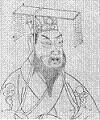
In 204 the Yellow Turban Revolt in China (begun 184) is ended by the generals, who begin to fight among themselves for control. In 208 to stop his southern expansion, Chinese warlords Sun Quan of Wu (182-252) and Liu Bei of Shu (161-223) form a coalition and lead their 25K-50K troops against the 220K-300K troops of Cao Cao of Wei (155-220) at the Battle of Red Cliffs NW of modern-day Chibi (N of Wulin), Hubei, taking advantage of the lack of acclimatization of the northern troops, who suffer a plague, then firing their chained-together ships, burning or drowning most them and defeating Cao Cao.
On Mar. 15, 220 Cao Cao (emperor Wu of Wei) (b. 155) dies of illness, and his son Cao Pi crowns himself as Wei Wen Di (-227), emperor of Wei; Dong Han emperor Xian Di abdicates in favor of warlord Liu Bei (Xuan De) (Xuande) (161-223), who becomes emperor #1 of the Shu Han Dynasty in China (until 223), which rules Sichuan, Guizhou, and parts of Hubei and Gansu; the Han Dynasty, which ruled since 206 B.C.E. collapses, plunging China into 350 years of chaos and disunity, and the Three Kingdoms Period (Wei, Shu, Wu) begins (ends 280) - the Shu's on the other foot? Also in 220 the first known depiction of the preparation of tofu is made in N China - "I love tofu" is no longer obscene on license plates?
In 225 Chinese PM Zhuge Kongming (-234) conquers S Shu - does that include Seoul?
In 227 Wei Wen Di dies, and Wei Ming Di (Cao Rui) (205-39) becomes emperor of Wei (until 239); Japan sends ambassadors; too bad, he goes on to spend excessive amounts on palaces and temples.
In 230 the Wheelbarrow with Sails is invented in China.
In 234 Zhuge Kongming dies, and Fei Wei becomes PM of Shu.
In 239 Wei Ming Di dies, and Wei Fei Di (Cao Fang) (Ts'ao Fang) (231-74) becomes emperor of Wei (until 274), sending an ambassador to Japan.
In 256 Wei Fei Di dies, and Cao Pi's grandson Wei Gao Gui Xian Gong (Yanshi) (Cao Mao) (242-60) becomes emperor of Wei (until 260); Jiang Wei of the Shu unsuccessfully attacks Wei.
In 265 Cao Huan abdicates in favor of Sima Yan, who is crowned Jin Wu Di (236-90) (until 290), founding the Xi (Western) Jin Dynasty in China (ends 420).
In 281 the Bamboo (Ji Tomb) Annals are found in the grave of a Chinese prince, telling about Emperor Yao, who named the 12 signs of the Chinese Zodiac and divided the sky into 28 mansions of the Moon.
In 284 the 2nd Roman Embassy to China is sent by Emperor Diocletian (first 166).
In 290 Jin Wu Di dies, and his retarded son Jin Hui Di (259-307) becomes Xi Jin emperor #2 of China (until Jan. 8, 307).
In 291 the Rebellion of the Eight Kings
In the 4th cent. (3rd?) (5th?) C.E. Chinese mathematician Sun Tzu (Sun Zi) flourishes, leaving Sun Tzu Suan Ching (Sun Tzu's Calculation Classic), containing the how-many-eggs-in-my-basket Chinese Remainder Theorem. Early in the 4th cent. C.E. the Chinese invent the Stirrup.
In 300 C.E. the Rebellion of the Eight Kings (Princes) in China begins (ends 306).
In 301 Sima Lun, Duke of Zhao rebels and deposes his grand-nephew Jin Hui Di, then is killed later in the year, and Jin Hui Di restored.
In 304 the Hun Liu Yuan establish the Han Kingdom, beginning the chaotic Sixteen Kingdoms (States) Period in N China (ends 439).
In 307 Jin Hui Di (b. 259) is poisoned by regent Sima Yue, who becomes Jin Huai Di (Fengdu) (284-313), Xi Jin emperor #3 of China (until 313).
In 311 after forming the Han (Former) Zhao (Northern Han) kingdom in the S part of the the nomadic tribal confederation of the Xiongnu (Hsiun-nu) (Chionites) (Huns?) (a Turkic people?) of the E Eurasian Steppe under Liu Cong (Xuanming) (Emperor Zhaowu of Han/Zhao) (-318), they conquer Leyang and capture Jin Huai Di.
In 313 Jin Huai Di is executed by order of Liu Cong, and Jin Min Di (300-18) becomes Xi Jin #4 (last) emperor of China (until 318).
In 318 Jin Ming Di is executed by emperor Liu Cong of Hang Zhao, ending the Xi Jin Dynasty (founded 265), and Jin Yuan Di (Sima Rui) (Jingwen) (276-323) becomes emperor #1 (until 323) of the Dong (Eastern) Jin Dynasty (ends 420).
In 323 Jin Yuan Di dies, and Jin Ming Di (299-325) becomes Dong Jin emperor #2 of China (until 325), fighting warlord Wang Dun (Chuzhong) (266-324).
In 325 Jin Ming Di dies, and his 4-y.-o. eldest son Jin Cheng Di (Sima Yan) (Shigen) (321-42) becomes Dong Jin emperor #3 of China, with a succession of regents, facing a revolt by gen. Su Jun (-328).
In 342 Jin Cheng Di dies, and Jin Kang Di (322-44) (son of Jin Ming Di and younger brother of Jin Cheng Di) becomes Dong Jin emperor #4 of China (until 344).
On Nov. 17, 344 Jin Kang Di (b. 322) dies, and next year Jin Mu Di (343-61) becomes Dong Jin emperor #5 of China (until 361), with his mother empress Chu Suanzi (Kangxian) ("joyful and wise empress") (324-84) holding real power.
On July 10, 361 Jin Mu Di (b. 343) dies, and Jin Ai Di (Sima Pi) (341-65) becomes Dong Jin emperor #6 of China (until 365), with his granduncle Sima Yu, Prince of Kuaiji holding the real power; the Yan kingdom attacks Leyang, and gen. Heng Wen sends rescuing troops.
On Mar. 30, 365 after becoming obsessed with immortality, Jin Ai Di (b. 341) dies of pills given him by magicians, and his younger brother Jin Fei Di (Sima Yi) (Yanling) (342-86) becomes Dong Jin emperor #7 of China (until 371).
In 371 Jing Fei Di is deposed by gen. Huan Wen (Yuanzi) (312-73) (Duke Xuanu of Nan), and Jin Ming Di's younger brother Jin Jian Wen Di (Sima Yu) (Daowan) (320-72) becomes Dong Jing emperor #8 of China (until 372), spending all of his time in philosophical discussions of Taoism.
In 372 Jin Jian Wen Di (b. 312) dies before proclaiming himself emperor, and Jin Xiao Wu Di (Sima Yao) (Changming) ("filial martial emperor") (362-96) becomes Dong Jin emperor #9 of China (until 396).
In 386 Dao Wu Di (Tuoba Gui) (Tuoba Shegui) (371-409) becomes emperor #1 (until 409) of the Northern Wei Dynasty (ends 534).
In 386 Chinese astronomers witness a supernova.
In 396 Jin Xiao Wu Di (b. 362) is killed by his concubine Consort Zhang after he insults her, and retarded Jin An Di (Sima Dezong) (382-419) becomes Dong Jin emperor #10 of China (until 419), with his uncle Sima Daozi, Prince of Kuaiji (364-403) holding real power; Nanliang and Beiling establish empires.
In the 5th cent. C.E. steel is made in China from wrought iron and cast iron; also the Umbrella is invented, and the Chinese print full pages of characters using a single woodblock; they also invent true ink made from lampblack.
In 409 Dao Wu Di dies, and his eldest son Ming Yuan Di (Tuoba Si) (392-423) becomes emperor #2 of the Northern Wei in China (until 423).
In 419 Jin An Di (b. 382) is killed by regent Liu Yu, and Jin Gong Di (-420) becomes Dong Jin emperor #11 of China (until 420), with Liu Yu holding real power.
In 420 Liu Yu forces Ji Gong Di to abdicate, ending the Dong Jin Dynasty (founded 318), and proclaims himself emperor Song Wu Di (Dexing) (Jinu) (363-422) (until 422), founding the Liu Song Dynasty in China (ends 479).
In 421 the Western Liang Kingdom in 16-kingdom China (founded 400) ends.
In 422 Song Wu Di (b. 363) dies, and his son Liu Yifu becomes Song Shao Di (406-24), Liu Song emperor #2 of China (until 424).
In 423 Ming Yuan Di dies, and his son Tai Wu Di (Tuoba Tao) (Foli) (408-52) becomes emperor #3 of the Northern Wei in China (until 452), going on to unite all of N China and double the size of his kingdom, ending the Sixteen Kingdoms Period (begun in 304), and beginning the Southern and Northern Dynasties Period with the Southern Liu Song (ends ?).
In 424 oncompetent Song Shao Di (b. 406) is deposed and killed by his regents, who make his younger brother Liu Yilong into Song Wen Di (Che'er) (407-53), Liu Song emperor #3 of China (until 453), going on to create a period of prosperity.
In spring 452 Tai Wu Di (b. 408) is assassinated by eunuch Zong Ai, and Tai Wu's 2nd son Tuoba Han becomes Northern Wei emperor #4, but Zong has him assassinated and installs Tuoba Yu, who makes him army CIC, after which he assassinates him; too bad, in the fall Zong is overthrown and cruelly executed along with his clan by a coup led by his former lt. Dugu Ni, who gets Wen Cheng Di (Tuoba Jun) (440-65) installed as emperor #5 of the Northern Wei in China (until 465), reforming the laws to make them more lenient.
In 453 after losing battles against the Northern Wei Kingdom, Song Wen Di (b. 407) is assassinated by his son, crown prince Liu Shao, who becomes Song Liu Shao (Xiuyan) (Yuanxiong) ("prime murderer") (426-53), Liu Song emperor #4; after less than a year his younger brother Liu Jun, prince of Wuling defeats him and becomes Song Xiao Wu Di (Xiulong) (Daomin) (430-64), Liu Song emperor #5 of China (until 464), becoming known for his capable but harsh rule, sexual immorality, and curtailing of the powers of imperial princes and officials.
In 455 the first Christian Persian embassy reaches N China.
In 458 Buddhist priest Hui Shun (Fusang) sails from China to Alaska accompanied by four Afghan disciples, then journeys on foot down the North Am. Pacific Coast, reaching Mexico, where he teaches Buddhism to the Indians and Mayans, naming Guatemala for Gautama Buddha; he stays for over 40 years, then returns to China, reporting his travels to Lord Yu Kie and Emperor Wu in 502.
In 464 Song Xiao Wu Di (b. 430) dies, and Song Qian Fei Di (Ziye Liu) (449-65) becomes Liu Song king #6 of China, going on to stink himself up with sex and violence, and end up assassinated next year.
In 465 Song Qian Fei Di (b. 449) is assassinated, and his uncle Song Ming Di (Liu Yu) (Xiubing) (Rongqi) (439-72) becomes Liu Song king #7 of China (until 472), at first ruling wisely, then stinking himself up by killing off all his nephews and brothers, causing the Liu Song Dynasty to totter on the brink. In 465 Wen Cheng Di dies, and his son Xian Wen Di (Tuoba Hong) (454-76) becomes emperor #6 of the Northern Wei in China (until 471).
On Sept. 20, 471 Xian Wen Di (d. 476) retires in favor of his son Xiao Wen Di (Tuoba Hong) (467-99), who becomes emperor #7 of the Northern Wei in China (until Apr. 26, 499); Xian Wen retains power, becoming the first retired emperor in Chinese history; Xiao Wen introduces forced Sinicization, forcing the pop. to speak Chinese, adopt Chinese surnames, and wear Chinese clothes, changing his family surname in 496 from Tuoba to Yuan and encouraging intermarriage between his Xianbei people and the Han.
In 479 Xiao Daocheng seizes power, assassinating Song Shun Di (b. 467) and ending the Liu Song Dynasty, becoming Qi Gao Di (Shao Doujian) (Xiao Daocheng) (427-82), emperor #1 (until 482) of the Song (Southern) Qi Dynasty (ends 502).
In 482 Qi Gao Di dies, and Qi Wu Di (Xiao Ze) (Xuanyuan) (Long'er) (440-93) becomes Song (Southern) Qi emperor #2 of China (until 493), going on to rule wisely although a bit wastefully, and forbidding marriage between families of the same tribe - that way Chinese won't all look alike?
In 493 Qi Wu Di (b. 440) dies, and his son the prince of Yulin becomes Qi Xiao Zhaoye (Yuanshang) (Fashen) (473-94), Song (Southern) Qi emperor #3 of China (until 494).
In 494 Qin Xiao Zhaoye (b. 473) is assassinated by his granduncle (nephew of Qi Gao Di) Xiao Luan, who makes his brother Price Gong of Hailing into Qi Xiao Zhaowen (Jishang) (480-94), Song (Southern) Qi emperor #4 of China, then has him poisoned and becomes Qi Ming Di (Jingqi) (Xuandu) (452-98), Song (Southern) Qi emperor #5 of China (until 498), going on to kill all the surviving sons of Qi Gao Di and Qi Wu Di, and practice frugality. In 494 Xiao Wen Di moves the Northern Wei capital from Pingcheng to Luoyang, causing a split between his new Sinicized officials and the military establishment centered in the old capital.
In 498 Qi Ming Di dies, and Qi Dong Hun Hou Di (-501) becomes Song (Southern) Qi emperor #6 of China (until 501).
In 499 Xiao Wen Di dies, and avid Buddhist Xuan Wu Di (Tuoba Ke) (Yuan Ke) (483-515) becomes emperor #8 of the Northern Wei in China (until 515); during his reign the kingdom reaches its peak, and Buddhism becomes the state religion.
In 501 Qi Xiao Baojuan (b. 483) is overthrown and killed by gen. Xiao Yan, marquess of Donghun, who puts his younger brother Xiao Baorong on the throne as Qi He Di (Zhizhao) (488-502), Song (Southern) Qi emperor #7 (last) of China (until 502).
In 502 Qi He Di (b. 488) is overthrown and killed by Xiao Yan, ending the Song (Southern) Qi Dynasty (founded 479); Xiao Yan becomes Liang Wu Di (Shuda) (Lian'er) (464-549), emperor #1 (until 549) of the Song (Southern) Liang Dynasty (ends 587), becoming the most stable and prosperous of the southern dynasties; Liang Wu Di becomes known as "the Bodhisattva Emperor", founding univs., patronizing the arts, and embracing both Confucianism and Buddhism, while extending the Confucian civil service; he also bans animal sacrifice and executions.
In 515 Xuan Wu Di dies, and 5-y.-o. Xiao Ming Di (510-28) becomes emperor #9 of the Northern Wei in China (until 528), with his mother dowager empress Hu (Ling) ("unattentive empress") (-528) as regent.
In 527 Buddhist monk Bodhidharma (Damo) "the Blue-Eyed Barbarian" begins the physical training of the monks of the Shaolin Monastery in Henan Province, leading to the creation of Shaolin Kung Fu, and transmits Chan Buddhism to China, become its first Chinese patriarch.
In 528 Xiao Ming Di is poisoned by his mommy Empress Hu for trying to have her lover Zheng Yan executed, causing gen. Erzhu Rong (Tinbao) (493-530) (AKA Prince Wu of Jin) to capture the capital Luoyang and throw her into the Yellow River, then install Xiao Zhuang Di (Yuan Ziyou) (507-30) as emperor #10 of the Northern Wei in China (until 530) while retaining actual power for himself, going on to rebuild the country.
In 530 Xiao Zhuang Di ambushes and kills gen. Erzhu Rong in the royal palace, after which Rong's cousin Erzhu Rong (Rongzong) (500-32) and nephew Ezhu Zhao (Wanren) (-533) defeat and kill him, installing the prince of Guangling as Jie Min (Jiemin) Di (Qianfei) (498-532), emperor #11 of the Northern Wei in China (until 532).
In 532 Gen. Gao Huan defeats and kills Erzhu Rong and his clan and imprisons and kills Jie Min Di, installing Xiao Wu Di (Xiaoze) (Chu) ("the emperor who fled") (510-535) as emperor #12 of the Northern Wei in China (until 535), with Gao Huan wielding actual power.
In 534 Xiao Wu Di rebels against gen. Gao Huan and allies with Gen. Yuwen Tai (Heita), Duke of Anding (507-56), and is chased S into Yuwen's territory, splitting Northern Wei in two, leaving the old Xi (Western) Wei, and the new Dong (Eastern) Wei Dynasty (ends 550), with Xiao Jing Di (Yuan Shanjian) (524-52) (son of Wen's cousin Yuan Dan) as emperor #1 (last).
In 535 the Krakatoa Volcano in Malaysia at 105 deg. E, 5 deg. S explodes, splitting the island of Sumatra asunder and creating the islands of Java and Sumatra separated by the Sunda Strait, reducing daylight to four hours and affecting crop growth for 10 years; did this accelerate the coming of the Dark Ages by encouraging fleas in Africa to multiply, bringing the plague? On Feb. 3, 535 Xiao Wu Di is poisoned to death by Xanbei gen. Yuwen Tai, and his son Wen Di (Yuan Baoju) (507-51) becomes emperor #1 (until 551) of the Xi (Western) Wei in N China (ends 556).
In 540 Vietnam begins a revolt against the Chinese, which is quashed by the end of the cent., causing the Chinese to begin calling it Annam ("pacified south").
In 549 Liang Wu Di (b. 464) is deposed by gen. Hou Jing (Wanjing) (-552), who captures the capital of Jiankang and holds him and his son Jianwen under house arrest, then starves Liang Wu Di to death and places Jianwen on the throne as Liang Jianwen Di (503-51), Song (Southern) Liang emperor #2, then after 10 weeks has him strangled, and his grandnephew the prince of Yuzhang installed as Liang Xiao Dong (Yuanji) (-552), Song (Southern) Liang emperor #3 of China (until 552).
In 551 Wen Di dies, and his son Fei Di (Yuan Qin) (-554) becomes emperor #2 of the Xi (Western) Wei in N China (until 554), struggling under the bootheel of gen. Yuwen Tai.
In 552 Chinese gen. Wang Sengbian (Juncai) (-555), working for Xiao Dong's granduncle (youngest son of Liang Wu Di) Xiao Yi captures Jiankang and has gen. Zhu Maichen throw Liang Xai Dong into the Yangtze River, and Xiao Dong becomes Liang Xiao Ji (Shixun) (Taotie Ji) (508-53), Song (Southern) Liang emperor #4 of China (until 553).
In 553 Liang Xiao Ji (b. 508) is sandwiched between Xiao Ji in the front and Xi (Western) Wei forces in the rear, then defeated and killed, and Liang Yuan Di (Xiao Yi) (Shicheng) (Qifu) (508-555) becomes Song (Southern) Liang emperor #5 of China (until 555).
In 554 Fei Di is deposed and killed by gen. Yuwen Tai, and his younger brother Gong Di (Tuoba Kuo) (537-557) becomes emperor #3 of the Xi (Western) Wei in N China (until 556), a puppet of gen. Yuwen Tai.
In 555 Liang Yuan Di (b. 508) is captured and executed by the Xi (Western) Wei after offending their gen. Duke Yuwen Tai (Heita) (507-56) of Anding, who installs his nephew Xiao Chao as Liang Xuan Di (Lisun) (519-62), Song (Southern) Liang emperor #6 of China (until 562).
In 556 Gong Di is deposed by Yuwen Tai's nephew Yuwen Hu (Sabao) (515-78) (AKA Duke Dang of Jin), ending the Xi (Western) Wei Dynasty (founded 535); Yuwen Hu then installs Yuwen Tai's son Xiao Min Di (Yuwen Jue) (Tuoluoni) (542-57) as emperor #1 (until 557) of the Northern (Bei) Zhou Dynasty (ends 580); Gong Di is disposed of next year.
In 557 Xiao Min Di is deposed and killed by Xianbei gen. Yuwen Hu, who installs his brother Ming Di (Yuwen Yu) (Tongwantu) (534-60) as emperor #2 of the Northern (Bei) Zhou Dynasty in N China (until 560).
In 560 Ming Di is poisoned to death by gen. Yuwen Hu, and his brother (Yuwen Hu's cousin) Wu Di (Yuwen Yong) (Miluotu) (534-72) becomes emperor #3 of the Northern (Bei) Zhou in China (until 572); in 567 he invents Chinese Chess.
In 562 Liang Xuan Di (b. 519) dies, and his son Liang Ming Di (Renyuan) (542-85) becomes Song (Southern) Liang emperor #7 (last) of China (until 585).
In 572 Wu Di is ambushed and captured by gen. Yuwen Hu (-578), who rules as emperor #4 of the Northern (Bei) Zhou in China (until 578).
In 577 Northern (Bei) Zhou Dynasty women in China invent Matches, pyrotechnic chemical-tipped wood sticks ignited by friction.
In 578 Yuwen Hu (b. 515) dies, and his son Xuan Di (Yuwen Yun) (Qianbo) (559-80) becomes emperor #5 of the Northern (Bei) Zhou Dynasty in China (until 580), becoming known for erratic and wasteful rule, and finally going totally insane.

In 580 Xuan Di (b. 559) dies after going looney tunes (forbidding women outside the palace from using cosmetics, and ordering that all wheels be made from a single block of wood), and his Buddhist father-in-law Yang Jian seizes power from his boy son Jing Di (Yuwen Yan) (Yuwen Chan) (573-81), becoming emperor Sui Wen Di (Puliuru Jian) (Naluoyan) (541-604), ending the Northern (Bei) Zhou Dynasty (founded 556), and founding the Sui Dynasty in China (ends 618), which spreads Buddhism while also supporting Confucianism, and creates the greatest period of Chinese prosperity since the Han Dynasty, storing a 50-year supply of food - incl. Elvis Presley bacon-banana-peanut butter sandwiches?
In 589 the first written record of Toilet Paper in China by Buddhist scholar Yan Zhitui (531-91); "Paper on which there are quotations or commentaries from Five Classics or the names of sages, I dare not use for toilet purposes"; in 851 an Arab Muslim traveler disses them for using paper instead of water after going to the bathroom - not that kind of record, a written record?
In 585 Liang Ming Di (b. 542) dies, and his son Liang Jing Di (Xiao Cong) (Wenwen) becomes Song (Southern) Liang emperor #8 (last) of China until 587, when Mace Windu, er, Sui Wen Di abolishes the Song (Southern) Liang Dynasty (founded 502) and seizes its territory, making Liang Jing Di one of his officials.
In 600 the world's largest cities incl. Constantinople (500K), Chang'an and Lyang in China, Ctesiphon in Persia, Alexandria in Egypt (200K), and Teotihuacan in Mexico (50K). In the 7th cent. C.E. Chinese from Fukien and Kwangtong begin settling Taiwan ("beautiful island"), gradually displacing the native Malaysian aborigines of Polynesian descent, who call the island Pakan. Also in the 7th cent. C.E. the Chinese begin producing the Dibao (Pao), the world's first printed newspaper.

On Aug. 13, 604 emperor (since Mar. 4, 581) Sui Wen Di (b. 541) dies, and on Apr. 11 his 2nd son Sui Yang Di (Yang Guang) (Amo) (569-618) (AKA Emperor Ming) (original name Yang Ying, which is changed when the oracles nix it) becomes Sui emperor #2 of China (until Apr. 11, 618), going on to open relations with Japan and build China's first Grand Canal between the Yellow (Huang Ho) and Yangtze Rivers (20x the length of the Panama Canal?) with 2M workers (finished 610), and also rebuild the Great Wall at the cost of 6M insect worker lives, and the capital Luoyang with another 2M; his three expeditions to Korea each take 1M soldiers, so no wonder the tyrant leaves the empire bankrupt and in revolt.
In 605 the Anji Bridge in Zhao County, Hebel Province, China (begun 595) is finished, becoming the world's oldest segmented arch bridge, surviving to modern times; Europe doesn't build one until the 14th cent.
On Mar. 11, 617 after rebels capture the capital Chang'an, Sui Yang Di (b. 569) is strangled in a coup led by gen. Li Yuan, and on Dec. 18 Gen. Li Yuan installs his puppet Sui Gong Di (Yang You) (605-19) as Sui emperor #3 (last) of China (until June 12, 618); meanwhile his brother Yang Tong claims the throne.

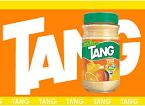
On Apr. 11, 618 after he bankrupts the empire with several military expeditions against Champa (S Vietnam), Koguryo (Goguryeo) (Korea) et al., and loses 6M workers reconstructing the Great Wall of China, a coup led by Gen. Yuwen Huaji (-619) overthrows and strangles Sui emperor #2 (since Aug. 2, 604) Yang Guang (b. 569), declaring Yang You's nephew Yang Hao (586-618), prince of Qin as emperor; on June 12 Gen. Li Yuan overthrows puppet emperor (since Dec. 18, 617) Sui Gong Di (Yang You), ending the Sui Dynasty (founded in 580), and on June 18 becomes Tang Gao Zu (Chin. "high founder") (566-635), emperor #1 (until Sept. 4, 626) of the Tang (T'ang) Dynasty (ends 906) (in which the emperors prefer orange-colored robes?), with capital in Chang'an (Changan) in Shaanxi Province near Xi'An at the E terminal of the Silk Road (founded -200); he goes on to copy Sui Wen Di and redistribute land equally, lower taxes, and reform the judicial system; on June 22 officials in Luoyang declare Yang Tong (Renjin) (604-19), prince of Yue as Sui emperor (until May 23, 619), who is then repeatedly defeated by rebels under Li Mi (Liu Zhiyuan) (Xuansui) (582-619) et al., causing him to get desperate, poison Yang Tong, and declare himself emperor, until he is captured and killed next year by agrarian rebel leader Dou Jiande (573-1621).
On May 23, 619 after Wang Shichong seizes power, Sui emperor (since June 22, 618) yields the throne to him, ending the Sui Dynasty permanently, after which he is killed on Wang's orders.

On Sept. 4, 626 Tang Gao Zu resigns his throne, and his 2nd son Li Shimin becomes Tang Tai Zong (Taizong) (T'ai Tsung) (599-649), Tang emperor #2 of China (until 649), launching a golden age of art and lit. marked by the perfection of the civil service system and the standardization of the you're-so-funny Chinese classics, and becoming known as the #1 emperor in all of Chinese history; cultivation of sugar cane begins after envoys are sent to King Harsha in N India in 647; the southern Chinese are absorbed into the empire, calling themselves the Men of Tang - Lost Boys: The Tribe, buy it today on DVD?
I warned ya, right? Or, Is that you, Santa Claus? In 628 the courts of Byzantine emperor (610-41) Heraclius I in Constantinople, Persian shah (628) Kavadh II in Ctesiphon, and Tang emperor (626-49) Tai Zong (Tai Tsung) in Canton are visited by Arab envoys of the new kid on the block, "the prophet of God, Muhammad", currently residing in the squalid trading town of Medina in deodorant-challenged Arabia, who sends them Aslim Taslam Letters ("accept Islam and you will be saved"), telling them to acknowledge the one true Alpha (with him as Omega?) and submit, or else, with the typical Muslim threat soundbyte "I invite you to Islam, and if you become a Muslim you will be safe and Allah will double your reward, but if you reject this invitation of Islam you will be committing a sin by misguiding your people (Arisiyin = peasants)"; as the story goes, Heraclius, busy with restoring order in Persia shrugs it off; Kavadh, hearing of how he had dechristianized and Muslimized Yemen, tears it up, throws it in the envoy's face and orders Muhammad to bug off, causing the latter to cry to Allah to rend his kingdom from him; only emperor Tai Zong treats his envoys with respect, and allows them to build a mosque for Arab traders in Canton - the origin of the priest, minister and rabbi joke?

In 629 C.E. Chinese Buddhist monk Xuanzang (Hiuen Tsang) (Tang Sanzhang) (602-63) defies an imperial edict forbidding foreign travel, and escapes from the capital of Sian-fu (Signan) on a 16/17-year journey to India (Cambodia) to fetch Buddhist scriptures (ends 1645); he is entertained by N Indian emperor Harshavardhana; his journey is recorded in the Great Tang Records on the Western Regions (646), which inspires the 16th cent. Ming Dynasty novel Journey to the West by Wu Cheng'en.
In 635 Nestorian monk Alopen (Olopen) (Olopan) (Olopuen) (Chin. pronunciation of "Rabban") arrives in China with a delegation to Emperor Tsai-Tung, who receives them with respect, hears their yim yam out, and orders the Christian scriptures trans. into Chinese for further study; Alopen founds the first Nestorian Christian mission in China (until the 13th cent.) - we'll take it under, ahem, advisement and get back with you later? In 638 Tai Zhong finishes his examination of Christian scriptures and announces them satisfactory for preaching in his empire, granting Nestorian missionary Alopen the right to preach, and allowing the Qing Jiao (Da Qin) Temple and a monastery to be built in Yining Fang (burnt 845) - it must have been a bad translation?
On July 10, 649 Tang Tai Zong (b. 599) dies, and his son (by empress Zhangsun) Tang Gao Zong (Li Zhi) (628-83) becomes Tang emperor #3 (until 683); the lavish Tomb of T'ai Tsung (Taizong) of Tang is built (626-49); 24-y.-o. empress Wu Zetian is sent to a nunnery, but soon makes a comeback by framing new empress Wang and her head concubine for strangling her infant daughter in 654, getting her deposed in 655 and marrying the new emperor herself, then having their hands and feet cut off and drowned in a well.
In 650 Tang Gao Zong has a stroke, allowing his manly concubine Wu Zetian (-705) to take over, improving farming techniques, reducing taxes and introducing social reforms in a scheme to become the only empress in Chinese history.
On Dec. 27, 683 Tang Gao Zong (b. 628) dies, and after his son Tang Zhong Zong (Li Xian) (Li Zhe) (Wu Xian) (656-710) becomes Tang emperor #4 of China, Gao Zong's 2nd wife Empress Wu deposes and exiles him in less than 2 mo. in favor of his younger brother (her son) Tang Rui Zong (Ruizong) (Jui Tsung) (Li Dan) (Li Xulun) (Li Lun) (Wu Lun) (Wu Dan) (662-716), who becomes Tang emperor #5 of China (until 690), while she wields the real power.

The original Chinese So You Think You Can Dance? In 690 Empress Wu Zetian (Wu Zhao) (625-705) deposes her son Tang Rui Zong, and becomes Tang emperor #6 of China (until 705), becoming the first no-holds-barred Chinese empress, pissing off zillions of male chauvinists, and doubling the aggravation by changing the Tang Dynasty to the Zhou Dynasty; too bad for them, she's more than capable of outgunning the men, so they're in for a long wait for a pair, er, male to sit on the heavenly throne again. Meanwhile in 698 Empress Wu begins persecuting Chinese Christians.
In the 8th cent. C.E. there is a pop. explosion in China, which begins the first large urban developments and becomes aware of the opium poppy via the Middle East and India; Changan (Ch'ang-an), capital city of China is the largest city on Earth; Constantinople is #2; Teotihuacan in Mexico is at its zenith with a pop. of 200K.
In the 8th cent. Gunpowder is invented in Tang Dynasty China, with the formula 15-3-2 parts saltpeter-charcoal-sulfur; it is first used for insect fumigants and skin disease treatments, then fireworks, after which it takes a cent. or two to use it in warfare? - the first manmade cis boom bah? Also in the 8th cent. Porcelain is invented in Tang Dynasty China.
On Oct. 8, 701 16-y.o. Chinese princess Yung-T'ai (granddaughter of Emperor Gao Zong), who married the Tang cmdr. of the 2nd rank of imperial carriages, has a son, and seemingly has it made, until she and her husband and brother are overheard by an informer of mean jealous Empress Wu laughing at something, causing the latter to accuse them of a conspiracy and order their death commit suicide.
On Dec. 16, 705 after former emperor #4 (684) Tang Zhong Zong (656-710) returns from exile, regains power from his mean old mother Empress (since 690) Wu Zetian (b. 625), forces her to abdicate, changing the dynasty back to Tang, she dies, and the emperor, sorrowful over the 701 murder of his daughter Yung-T'ai, his son, and son-in-law orders their reburial in a magnificent tomb in the Tang cemetery near Sian, which is rediscovered in 1960, filled with priceless Tang pottery, along with an inscription lying that the princess died in childbirth.
In 706 wall paintings in the Tomb of Prince Zhang Huai in China show the earliest documented proof of Bonsai.
On July 3, 710 Tang Zhong Zong (b. 656) is poisoned by Empress Wei, who puts her youngest son Tang Shang Di (Li Chongmao) (695-714) on the throne as Tang emperor #5, but Zhong Zong's sister Princess Taiping (-713) and nephew Prince Li Longji of Linzi stage a coup, killing Empress Wei, and forcing Shang to abdicate on July 25 in favor of former emperor #5 (683-90) (Li Longji's father) Tang Rui Zong (Ruizong) (Jui Tsung) (Li Dan) (Li Xulun) (Li Lun) (Wu Lun) (Wu Dan) (662-716) (until 712); formal marriage takes place between Tibet and China.
In 712 after consulting astrologers, Tang Rui Zong abdicates in favor of his son Li Longji, who becomes Tang Xuan Zong (685-762), Tang emperor #6 of China (until 756), going on to bring Buddhist China to its pinnacle. In 733 Tang Xuan Zong divides China into 15 sections. In 748 the first printed newspaper appears in Peking - China Today?
The 750s is a time of darkness in Europe and Byzantium, while China enjoys its Golden Age of Poetry and everything else; the Chinese royal stables contain 40K horses for use mainly in polo games? In May-Sept. 751 the Battle of the Talas River (Artiakh) in C Asia is a V by the Arab Abbasids and their Tibetan allies over the Chinese Tang Dynasty under Emperor Xuanzong, giving Muslims control of Transoxiana (W Asia) for the next four cents.; Chinese POWs allegedly teach the Arabs papermaking, resulting in a book and learning explosion after paper manufacture spreads W through the Muslim world, with factories in Samarkand, Baghdad (c. 800), Morocco (c. 1100), and Spain (c. 1150); the Arabs also learn the secrets of sericulture (silk); pesky Bukhara finally becomes Muslim; China begins to fragment into five northern dynasties and 10 southern kingdoms over the next half-cent.
Too bad, China's fortunes begin reversing in the 760s. In 753 a census in China gives the pop. as 52,880,488; in 764 another census after the An Lushan Rebellion gives a pop. of 16.9M - a loss of 36M (70%) in 11 years?; two-thirds still live in N China, but after this the S pop. in the Yangzi Delta begins to catch up.
On Dec. 16, 755 An Lushan (703-57) rebels against the Tang Dynasty, starting the An Lushan (An Shi) (Tianbao) Rebellion (ends 763), causing Jacob, son of the Christian king of the Uighurs to join with Kuang, son of Chinese emperor Hsuan-tsung to put them down; Tang emperor Tang Xuan Zong (Ming Huang) resigns and flees to Sichuan in Shu; poet Tu Fu is captured by the rebels (until 757).
In 756 after fleeing in the opposite direction from his father Tang Xuang Zong (to Lingwu in modern-day Yinchuan, Ningxia), Tang Su Zong (Li Heng) (Li Sisheng) (Li Jun) (Li Yu) (Li Shao) (711-62) is proclaimed Tang emperor #7 (until 762) by the army, going on to quell the An Lushan Rebellion with help from Arab caliph al-Mansur, while beginning the tradition of naming eunuchs to top official positions, starting with Li Fuguo (Li Jingzhong) (Li Huguo) (704-62) (AKA Prince Chou of Bolu), who becomes cmdr. of the imperial guards and rises to #2 in powah. In 757 An Lushan is killed; Tu Fu escapes, is recalled by the new emperor, and becomes a censor, but defends an official from the emperor, and is banished to a small town in Shensi Province as a sub-prefect.
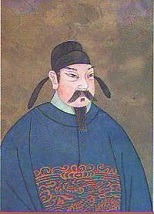
On May 16, 762 Tang Su Zong (b. 711) dies, and on May 18 his devout Buddhist son Tang Dai Zong (Li Chu) (Li Yu) (727-79) becomes Tang emperor #8 of China (until May 23, 779), having pesky eunuch Li Fuguo (b. 704) assassinated on Nov. 8, and forbidding the use of the swastika on silk fabrics; too bad, he spends too much on temples and shrines, bankrupting the empire.
In 762 Chinese poet Li Po (Bo) (Bai) (b. 701) goes out on a boat while drunk, sees his reflection in the water, tries to kiss it, and drowns.
In 779 Lu Yu writes Ch'a Ching, the first definitive book on tea, and the source of the tea service which Chinese Zen Buddhist missionaries later introduce into Japan; wait until the boiling water has bubbles resembling crystal beads rolling in a fountain before pouring over the leaves.
In 779 Tang Dai Zong (b. 726) dies, and his son Tang De Zong (-805) becomes Tang emperor #9 of China (until 805), going on to establish taxes in summer and autumn.
In 781 Chinese monks are invited into Tibet, laying the foundation for Tibetan Buddhism. Also in 781 Tang De Zhong erects the Da Qing Monument in Hsi-an-fu to commemorate Alopen and the Christian Nestorian faith, settled in China since 635, which was allowed to develop missionary activities and build monasteries free of the pesky Roman and Byzantine papacies; the Siganfu Inscription at Singanfu, capital of the Tang Dynasty is created by Iezdbouzid, priest and chorepiscopus of Chumdan, chronicling the Nestorian mission in 636-781 (rediscovered in 1623).
In 793 a tea tax is introduced.
In 805 tea is introduced from China into Japan by Buddhist saint Dengyo Daishi; in 815 Japanese Emperor Saga samples tea at a monastery and likes it so much that he has it cultivated in provinces near the capital, and by the end of the cent. Japan doesn't need to import it from China - how to do the clothes, how to do the hair?
In 805 Tang De Zong dies, and Tang Sun Zong (-806) becomes Tang emperor #10 of China.
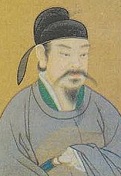
On Sept. 5, 805 Tang Sun Zong dies, and Tang Xian Zong (778-820) becomes Tang emperor #11 of China (until Feb. 14, 820), allowing the eunuchs to seize control.
On Feb. 14, 820 Tang Xian Zong is murdered by eunuchs, who on Feb. 20 install Muzong's eldest son Tang Mu Zong (Li Heng) (Li You) (795-824) as Tang emperor #12 of China (until Feb. 25, 824); after Li Zhongwen is demoted, a rebellion begins.
On Feb. 25, 824 Tang Mu Zong dies, and on Feb. 29 Tang Jin (Jing) Zong (Li Zhan) (809-27) becomes lucky Tang emperor #13 of eunuch-dominated China (until Jan. 9, 827), living in decadence while the eunuchs wield the real power.
On Jan. 9, 827 17-y.-o. Tang Jin Zong (b. 809) is murdered by eunuchs, after which most emperors are installed by eunuchs, starting on Jan. 13 with his younger brother Tang Wen Zong (Li Ang) (Li Han) (809-40), who becomes Tang emperor #14 of China (until Feb. 10, 840) - my emotions are something I just can't tame?
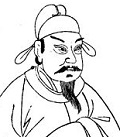
On Feb. 10, 840 Tang Wen Zong dies, and on Feb. 20 the eunuchs install Taoist (Daoist) Tang Wu Zong (814-46) as Tang emperor #15 of China (until Apr. 22, 846), who begins persecuting Buddhists, Manicheans, Mazdeans, and Nestorians.
In 845 the use of paper money in China leads to printing press inflation and state bankruptcy; Tang Wu Zong issues an imperial edict ordering the destruction of all Buddhist temples in China, exiling all monks and nuns, incl. Japanese monk Ennin (794-864); Nestorians are also persecuted.

On Apr. 22, 846 Tang Wu Zong dies, and on Apr. 25 Tang Xuan Zong (II) (Hsuan-tsung) (810-59) becomes Tang emperor #16 of China (until Sept. 7, 859), the last capable one, forbidding Christians to preach in China.
On Sept. 7, 859 Tang Xuan Zong dies, and on Sept. 13 devout Buddhist Tang Yi Zong (Li Wen) (Li Cui) (833-73) becomes Tang emperor #17 of China (until Aug. 15, 873), going on to live in decadence and squander the treasury while levying heavy taxes, resulting in famines that lead to cannibalism and agrarian rebellions.

On May 11, 868 the 16-ft.-long scroll Diamond Sutra, the world's first dated printed book is pub. in Tang China by Wang Jie; opening "Thus I have heard"; ending "Thus shall you think of this fleeing world: A star at dawn, a bubble in a stream, a flash of lightning in a summer cloud, a flickering lamp, a phantom, a dream"; discovered in the Magao Caves of the Thousand Buddhas near Dunhuang in NW China by Hungarian-British archeologist Sir Marc Aurel Stein (1862-1943), who purchases it from a monk guarding the caves - automatically makes the bestseller list?
On Aug. 15, 873 Tang Yi Zong dies, and on Aug. 16 Tang She Zong (Xi Zong) (Li Yyan) (Li Xuan) (862-88) becomes Tang emperor #18 of China (until Apr. 20, 888).
After the govt. fails to help victims of droughts and floods while increasing taxes and wallowing in luxury, the Huang Chao Rebellion in Heian begins (ends 884), becoming the biggest revolt against the Chinese Tang Dynasty, seriously weakening it and setting it up for dissolution within a few decades - there are time deadlines to file your claim?
In 877 rebel chief Biachu captures Canfu, center of the Chinese silk trade, and destroys it, stopping foreign commerce in silk for 60 years; the West has already learned to make silk and doesn't need to throw a pity party? In 878 was the last written reference to Christians in China before the Mongol era.
On Apr. 20, 888 Tang She Zong (Xi Zong) dies, and his younger brother Tang Zhao Zong (Li Jie) (Li Min) (Li Ye) (867-904) becomes Tang emperor #19 (penultimate) of China (until Dec. 1, 900, then 901-4).
In 895 the Fujiwaras become the ruling family in Japan (until 1192), and Japan and China begin drifting apart politically and culturally.
In the 10th cent. the moldboard plow is invented in China.
About 900 about this time the Lingchi (death by a thousand cuts) form of executed is instituted in China, spreading to Vietnam; it is outlawed in 1905.
In 901 Wang Chien (-918) establishes a centralized monarchy in China.
In 903 Zhu Wen (Qiang) (852-912), an ally of dead rebel leader Huang Chao (-884) takes over the Tang capital of Chang'an.On Sept. 22, 904 Zhu Wen deposes Chinese emperor (since Apr. 20, 888) Tang Zhao Zong, and installs boy emperor Tang Zhao Xuan (Ai) (Li Zuo) (Li Zhu) (892-908) (son of Zhao Zong) as Tang emperor (#19) (last) on the Tang throne in Luoyang (until May 12, 907).
In 905 the Khitan (Qitan) Empire of Mongolians from S Manchuria is founded in NE China, going on to rule Mongolia, NE China, and portions of the Russian Far East and North Korea in 916-1125.
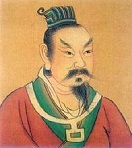
A country that was getting thin is getting fat? In 906 northern invaders end the Tang Dynasty (begun 618), beginning the Five Dynasties Period in China (ends 960); the dynasties (all short-lived military regimes) are Later Liang (907-23), Later Tang (923-34), Later Jin (936-47), Later Han (947-51), and Later Zhou (951-60), ruling the Yellow River Basin; there are also 10 kingdoms in C and S China: Wu, Nantang, Wuyue, Chu, Min, Nanhan, Qianshu, Houshu, Jingnan, and Beiban; on June 1, 907 Zhu Wen (Zhu Quanzhong) (852-912) founds the Later Liang Dynasty (ends 923) after seizing the throne in Kaifeng in his own name, later calling himself Emperor Tai Zu (until July 18, 912); about this time foot binding (lotus feet) catches on?
In 916 Yelu Abaoji (872-926) declares himself emperor of the Mongolian Khitans in NE China, founding the Liao Dynasty (ends 1125); during this dynasty the Guyaju Caves near modern-day Dongmenying, Yanqing District, Beijing are built by a tribe of Kumo Xi Mongolic steppe people from NE China?
In 932 Chinese minister Feng Tao (882-954) orders the printing of the Confucian classics using movable wood blocks, making him the Gutenberg of the East.
In 932 Chinese minister Feng Tao (882-954) orders the printing of the Confucian classics using movable wood blocks, making him the Gutenberg of the East.
In 936 with help from Khitan, Shi Jing Tang crowns himself king in Kaifeng, founding the Later Jin (Hou-Chin) Dynasty in China (ends 947). In 938 the Chinese-speaking Mongolian Annamese defeat the S Han Chinese at the Battle of Bach Dang, freeing Annam (Vietnam) from Chinese control for 1K years (until 1940, except 1407-1428), adopting the name Dai Co Viet (Great Viet State); the Annamese begin driving the aboriginal Caucasoid Chams to the S. In 938 the Khitans leave the old Chinese capital on the Liaotung Peninsula, and establish a new capital at Yanjing (Yenching) (Nanking) ("southern capital") on the site of modern-day Beijing (until 1153). In 939 Ngo Quyen (898-944) declares himself king of Annam (Vietnam).
In 942 Arab poet Abu Dalaf from Bukhara who visited China refers to visiting Christians and Christian churches there.
In 947 Liao Si Zhong becomes king #1 of the Later Han Dynasty (ends 951). In 947 the Mongolians of Khitan take Kaifeng and N China, ending the Later Jin Dynasty (begun 936). In 947 Jews begin settling in China - so that's how they learned to run those family restaurants and laundries?
In 951 the Later Han Dynasty ends, and the Later Zhou Dynasty is founded in China (ends 960).

In 953 the 5.78m (19 ft.) high x 6.5m (21 ft. 4 in.) long x 3.17m (10 ft. 5 in.) wide 45-ton Buddhist Cangzhou Lion (Sea Guard Howler) is cast in China, becoming the largest iron casting in history (until ?).
In 960 Zhao Kuang Yin takes over the Zhou Kingdom, becoming Song Tai Zu (Tai Tsu) (Great Founder) (927-76), emperor #1 of the Bei (Northern) Song (Soon) (Sung) Dynasty (ends 1127), defeating the Tartars; the Golden Era of China begins; the capital is the SE Chinese city of Hangzhou; the Tai Tzu Chang Chuan (great ancestor's long fist) system of martial arts is perfected; the great watercolor painters of the Bei (Northern) Song era flourish.
In 968 Dinh Bo Ling (925-79) founds the Red River, Black River kingdom of Dai Co Viet near the S rim of the Red River plain in Vietnam, with capital at Hoa-lu. In 972 Dinh Bo Ling of Vietnam sends his son to China to establish relations and obtain recognition.
In 972 Dinh Bo Ling of Vietnam sends his son to China to establish relations and obtain recognition.

In 975 the Thunder Pagoda in China is built.
On Nov. 14, 976 emperor (since Feb. 960) Song Tai Zu (b. 927) dies, and Song Tai Zong (Guang Yi) (939-97) becomes Bei (Northern) Song emperor #2 of China (until May 8, 997).
In 978-84 the 1000-vol. Chinese Encyclopedia (Taiping Quangji) is written.
In 979 Le Hoan (941-1005), CIC of the armies of Emperor Dinh Bo Linh hooks up with the queen mother, detrones and assassinates him and his son, and proclaims himself king of Annam (Vietnam), then defeats a Chinese expeditionary force, promising them a tribute every three years in exchange for peaceful relations, and founding the Early Le Dynasty (ends 1009), becoming the first attempt to consolidate Vietnam incl. a new road network.
About 980 Canal (Pound) Locks are invented in China by Ciao Wei-Yo (Qiao Weiyo), who builds double dams between Anbei and Huaishi in 984.
In 981 Nestorian monks visit China, and find no traces of a Christian community remaining.
In 989 the Kai-Bo Pagoda is built in Kaifeng, China; in 1040 it burns down after a lightning strike, and is replaced by the red brick Iron Pagoda in 1049.
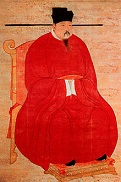
On May 8, 997 emperor (since Nov. 15, 976) Taizong dies, and next Dec. 23 his 3rd son Song Zhen Zong (968-1022) becomes Bei (Northern) Song emperor #3 of China (until Mar. 23, 1022).
In 999 the grip of Millennium Fever (MF) in Christendom is at full strength, with the faithful believing that the world will end in the Big Year 1K (Y1K), and many leaving their homes and giving all their belongings to the poor; the hysteria doesn't die down for at least four years; HRE Otto III stays close to the con in Rome; meanwhile China doesn't give a fart - maybe only after China is Christianized will the world have to worry about Christ coming back? The first German pope is followed by the first French pope as the approach of the big 1000 causes the Italians to hide behind them?
In the 11th cent. C.E. the port city of Quanzhou, China becomes China's major port for foreign traders until the 14th cent., becoming known for its mosques incl. the 13th cent. Qingjing Mosque.
In 1000 world pop. is 200M-300M; Constantinople: 300K, Rome: 35K, Paris: 20K; the thriving Chinese Bei (Northern) Song Dynasty (960-1127) is the world's most populous empire; the Muslim Abbasid Caliphate (750-1258) and remnants of the Umayyad Caliphate (661-) thrive in Spain, N Africa, the Middle East, and C Asia.
In 1004 China becomes tributary to the Tungusic Khitans, paying 100K oz. of silver and 200K bolts of silk.
In 1009 Le Long Dinh dies, and the Le Dynasty (begun 980) in Vietnam comes to an end after Buddhist monk-raised Ly Cong Uan (Ly Thai-To) (974-1028), cmdr. of the palace guard seizes the throne supported by the Buddhist establishment, founding the Ly Dynasty (ends 1225).
In 1023 Song Zhen Zong dies, and Song Ren Zong (Jen Chung) (-1064) becomes Bei (Northern) Song emperor #4 of China.
In the 1040s Bi Sheng (990-1051) of China invents movable type printing, made of baked clay, and prints calendars.
In 1044 after Emperor Renzong orders it, Chinese Song Dynasty statesman-historian-poet Ouyang Xiu (Ou Yang Hsiu) (Yongshut) (1007-72) leads the creation of the New History of the Tang Dynasty.
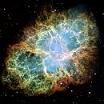
On July 4, 1054 Chinese astronomers note a "guest star" in the constellation Taurus, the star Zeta Thauri in the Crab Nebula (later known as a source of gamma rays); it is visible in daylight for 23 days and at night for two years; American aborigines see it, along with Arab astronomers, but no European records it, they're too busy with the Roman-Greek Catholic Church Schism, and King Macbeth's D at the hands of Duncan's son Malcolm - maybe this is a sign that a new country will be born on July 4 halfway to China in America, which will never be ruled by the ever-split Church?
In 1054 Ly Thai-tong dies, and his son Ly Nhat Ton (Ly Thanh-Tong) (1023-72) becomes emperor of Vietnam, adopting the ritual trappings of a Chinese emperor, which worries the real one.
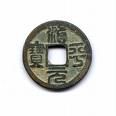

In 1064 Song Ren Zong dies, and Song Ying Zong (Tsung) (-1067) becomes Bei (Northern) Song emperor #5 of China; Chinese scholar Ssu-ma Kuang (Sima Guang) (1019-86) presents him with the 5-vol. Chart of Successive Years (Liniantu), a history of China from the start of the Warring States Period (403 B.C.E.) to the end of the Five Dynasties and Ten Kingdoms Period (959 C.E.); in 1066 he adds 8 more vols., covering from -403 to -207 (end of the Qin Dynasty), turning on the emperor, who orders all imperial libraries opened to him, and provides him with assistants; the next emperor Song Shen Zong changes the title to Comprehensive Mirror to Aid in Government (Zizhi Tongjian), and he completes it in 1084 (10 vols.).
In 1066 China's Khitan (Qi Dan) tribe changes its name to Liao.

In 1068 Song Ying Zong dies, and Song Shen Zong (She-tsung) (-1086) becomes Bei (Northern) Song emperor #6 of China - is that like a Song Shen Blue? In 1069 Chinese chancellor Wang Anshi (1021-86) comes to power, promulgating the New Policies, stressing the well-being of the common people (farmers), and seeking to break up the monopolies and speculators; too bad, after a famine in 1074 his court enemies get him removed in 1075.
In 1072 Ly Can Duc (1066-1127) becomes emperor of Vietnam (until 1127), beginning border enroachments with China that piss-off Chinese emperor Wang Anshi.
In 1075 Vietnamese troops attack China, defeating the Song navy and sacking several towns; meanwhile Vietnam institutes its first exams for bureaucratic office, and found a nat. Confucian college next year, but abandon the exams in 1077 when the students prove they need more time (and/or the Chinese invasion stops them)?
In 1086 Song Shen Zong dies, and Song Zhe Zong (-1101) becomes Bei (Northern) Song emperor #7 of China.
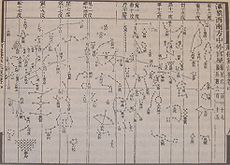
On Jan. 16, 1089 Chinese superbrain Su Song (1020-1101) finishes construction of the world's first astronomical clock.
In 1090 the first Water-Driven Mechanical Clock Tower is built in Peking, China.
In the 12th cent. the rocket is invented in China - that's why it has a red glare?
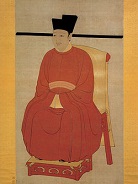
On Feb. 23, 1100 Song Zhe Song dies, and his younger brother Song We Zong (Huizong) (Zhao Ji) (1082-1135) becomes Bei (Northern) Song emperor #8 of China (until Jan. 18, 1126), going on to become an arts lover and the top tea expert in Chinese history.
In 1111 Sung Dynasty Emperor Huizong, a fervent Taoist, in an attempt to establish Taoism as the state religion orders over 1K Buddhist monasteries in the Shandong capital of Kaifeng to be destroyed.
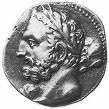
In 1113 Suryavarman II (-1150) becomes king of Angkor; under him the Khmer Empire in modern-day Cambodia/Vietnam reaches its peak, and he conducts diplomatic relations with China.
In 1115 the Wanyan clan of the Jurchen (ancestors of the Manchus) found the Jin (Jinn) (Jurchen) Dynasty in Manchuria in NE China (ends 1234).
In 1119 the Chinese first use the compass for navigation.
In 1124 the Tungusic Juchen Manchurians invade China and drive the Mongol Liao Dynasty of Khitan (begun 916) from China, founding the Qara-Khitai (Kara-Khitai) Kingdom in Semirechye (ends 1214).
In Sept. 1125 the Jingkang Incident (Humiliation of Jingkang) begins (ends Mar. 1127) when the Jurchen-led Jin Dynasty sieges and sacks Bian Jing (Bianjing) (modern-day Kaifeng), capital of the Song Dynasty, capturing Emperor Qinzong along with his father Emperor Huizong and many members of the imperial court, causing the Song Dynasty to cede all territories N of the Huai River.
On Jan. 18, 1126 Chinese Song emperor (since Feb. 23, 1100) Huizong (b. 1082) is captured by the Jin Dynasty, going on to spend the last nine years of his life in captivity, dying on June 4, 1135 after Jurchen emperor Taizong gives him the title Duke Hunde (Besotted Duke).
In 1126 Song Wei Zong dies, and Song Qin Zong (-1127) becomes Bei (Northern) Song emperor #9 of China.

On June 12, 1127 after the Manchurians kidnap Song Qin Zong and his father, Gao Zhong crowns himself Song Gao Zong (11007-7), Nan Song emperor #1 of China (until July 24, 1162), with Nan Jing (Najing) (Chin. "southern capital") as the capital; the Northern (Bei) Song Dynasty (founded 960) is replaced by the Southern (Nan) Song Dynasty (ends 1279). Also in 1127 Ly Can Duc dies, leaving no heir, causing Vietnam to degenerate into civil wars for the rest of the cent. (until 1225).
On Jan. 28, 1132 the Southern (Nan) Song Chinese under gen. Han Shizhong (1089-1151 siege and capture a city in Fujian, becoming the first known use of gunpowder cannons.

In 1163 Song Gao Zong dies, and Song Xiao Zong (1127-94) becomes Southern (Nan) Song emperor #2 of China (until 1189).
In 1188 Shen Kuo (1031-95) pub. Dream Pool Essays (Meng Xi Bi Tan), a collection of scientific essays incl. the first description of the magnetic needle compass and its use in navigation; it takes Europe four cents. to catch up with China's #1 scientist.

On Feb. 18, 1189 emperor (since 1162) Song Xiao Zong is forced to abdicate by Zhao Dun, who becomes Southern (Nan) Song emperor #3 Song Guang Zong (1147-1200) (until 1194).
In the 1190s Jayavarman VII of Angkor (Cambodia) raids and takes over Champa, ruling until 1220.


On July 24, 1194 Song Guan Zong is forced to abdicate by Song Ning Zong (Zhao Kuo) (1168-1224), who becomes Chinese Southern (Nan) Song emperor #4 (until Sept. 17, 1224), going on to foster cultural and intellectual achievements by Zhu Xi (1130-1200) et al., while dealing with the pesky Jurchen people in the N and also dealing with inflation. In 1194 the Yellow River in China drastically changes its course from N to S of the Shantung Peninsula.

On Apr. 23, 1200 Chinese philosopher Zhu Xi (Chu Hsi) (1130-1200) dies, leaving Commentaries on the Four Books of Confucius, which forms the basis of Chinese civil service exams in 1313-1905.


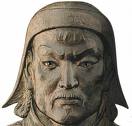
In 1206 Temujin ("iron-worker") is acknowledged as the supreme leader of the steppes at a kuriltai (tribal meeting), and given the name Genghis (Chingis) (Jengis) Khan (1162-1227), "emperor of all emperors" (chief prince of the Mongols), invading Manchuria - I don't care, it's 5 o'clock somewhere, let's get going?
In 1209 Genghis Khan defeats the Kirghiz and Uighurs, then invades NW China and conquers the Tanguts (Xia) (of Tibetan origin). In 1211 Mongol attacks on the Manchurian Jin Dynasty begin, led by Genghis Khan, who gets the edge when the stupid Jin cmdr. sends messenger Ming-Tan to talk rather than attack first, and he defects and gives away their position at Badger Pass, allowing the Mongols to massacre thousands of Jin troops and win a big V. In 1215 Genghis Khan and 75K men successfully siege the Chinese capital of Chungtu (modern-day Beijing), defended by 600K, finally getting even for cents. of oppression. In 1217 the Mongols conquer the Western Liao Dynasty in China (founded in 1125).

In 1224 Song Ning Zong (b. 1168) dies, and Song Li Zong (Lizong) (Zhao Yun) (1205-64), who was not in line for the throne but was shoed-in by chancellor Shi Miyuan and dowager empress Yang becomes Southern (Nan) Song emperor #5 of China, going on to rule for 40 years while spending his time chasing hos and dying without an heir.
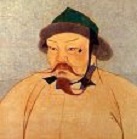
On Aug. 18, 1227 after conquering the Western Xia (Xia Xia) (Hsi-Hsia) (Tangut) state in C China (founded in 1038), Genghis Khan (b. 1162) dies near Khentii Aimag in Yinchuan, Western Xia after conquering 4.86M sq. mi. from the Pacific Ocean to the Caspian Sea (incl. N China, Mongolia, S Siberia, and C Asia), and is succeeded by his 3rd son Ogedei (Ogodei) (Ogadai) (Ogotai) (Ughetai) (1186-1241). Gorgeous Genghis dies in bed after enjoying 500 wives and concubines; his burial party kills anybody seeing the procession, and all slaves and solders attending it are killed; a river is diverted over his grave, which isn't found until ?; his palace is uncovered in 2004.
In 1232 the Battle of Kaifeng (Kai-fung-fu) sees the Chinese use rockets in warfare for the first time to defend Kaifeng against pesky pagan Mongols; the use of gunpowder begins to spread.
In 1234 the Mongols conquer the Jin Dynasty in Manchuria in NE China (founded 1115).



In 1251 Kublai (Khubilai) Khan (1214-94) becomes Mongol gov. of China; Hulagu (Hulegu) (Halagu) Khan (1217-65) begins conquering Persia (until 1265); Mongke (Möngke) (Mangu) Khan (1209-59), son of Genghis Khan's son Tului and a Nestorian woman (elder brother of Kublai Khan and Hulagu Khan) is elected Great Khan by the Mongolian diet (until 1259), going on to hold a series of court debates between Buddhists and Daoists (Taoists), with Confucians sitting in, and the Daoists losing - hosted by Alex Trebek? In 1257 the Mongols attempt to surround the Chinese from the S by invading N Vietnam, but are expelled by next year. In 1260 Kublai Khan succeeds his brother Mongke (Mangu) as Great Khan of the Mongol Empire in N China and parts W, founding the (Great) Yuan Dynasty of China on Noov. 5, 1271 (ends 1368), after first moving the capital to the new city of Shangdu (Xanadu) (Chin. "upper capital") 220 mi. N of Beijing in Inner Mongolia while squabbling over secession.

On Nov. 16, 1264 emperor (since Sept. 17, 1224) Song Li Zong (b. 1205) dies, and on Nov. 16 his nephew Song Du Zong (Zhao Qi) (nee Zhao Mengqi) (1240-74) becomes Nan Song emperor #6 of China (until Aug. 12, 1274), going on to face Mongol incursions while indulging in wine and women and leaving affairs to his incompetent minister Jia Sidao (Shixian) (1213-75); each morning all the babes he's bedded have to come pay their respects, and their number soon mounts to 30? Kublai Khan relocates his Mongol capital to Chungto (modern-day Beijing), renaming it Khanbalik (Cambaluc) ("city of the great khan") (until 1368) - did he a stately pleasure dome decree?
In Feb. 1269 the Mongols build a fortress E of the Han River to block the water supply, then siege the walled cities of Xiangyang and Fancheng in Hubei Province, the last two strongholds of the Nan Song (until 1273); both sides use explosives in the fighting (first time in history?).

Time won't let me wait that long? In 1271 Kublai Khan officially proclaims the Great Yuan (Mongol) Dynasty (ends 1368); meanwhile the Polos begin their 2nd trip from Europe to Asia (ends 1275), accompanied by Niccolo Polo's 17-y.-o. son Marco Polo (the Younger) (1254-1324), stopping in Jerusalem to get oil from the lamp of the Holy Sepulchre as requested by Kublai Khan, sailing to the SE Turkish port of Ayas, then traveling E by caravan across the entire width of Asia through E Turkey (noting that Mt. Ararat is too hard to climb), Georgia (noting "a fountain from which oil springs in great abundance", which is good for burning but no good in a salad), Armenia (with 30-lb. fat-tailed sheep), Persia (noting the cool soft Kerman "shals"), Badakhshan (seeing salt mined and rubies dug), then via camel along the S Silk Road through the Taklamakan Desert and Great Sand Sea (Gobi Desert) (noting sandstorms and mirages), visiting Balkh, the Pamir Plateau, Kashgar, Khotan, Lop Nor, Tangut, and Kanchow, homeland of the Mongols, finally reaching Chandu (Shangtu) (Xanadu), becoming the first Westerners in a generation to cross the Wakhan Corridor to China. In May Marco Polo and his party arrive at Kublai Khan's summer capital of Chandu (Xanadu) N of the Great Wall in Cathay (China), where they stay until 1292, noting that he keeps 10K milk-white horses within the walls of his summer residence; in the fall they accompany Kublai Khan to his winter capital at Peking, where they view his "stately pleasure dome" of violet, green, and vermilion on gilded walls carved with figures of dragons and Buddhas, which has a huge hall capable of entertaining 6K at dinner; the royal dude has 1M retainers, and his New Year's parade features 5K elephants each carrying two coffers of treasure; Marco pleases Kublai's ear with his own stories, and is given free run of Cathay for 17 years, observing spectacles (eyeglasses) in gen. use.

On Mar. 14, 1273 Battle of Xiangyang (begun 1267) in Hubei Province is a V for the Mongols, who capture the last Nan Song stronghold and close in on what's left of the kingdom; meanwhile minister Jia Sidao hides the fact from whoremaster emperor Song Du Zong, who soon dies happy, and is succeeded by his infant son Song Gongdi (Xhao Xian) (1271-1323), who becomes Southern (Nan) Song emperor #7 of China (until 1276), while his grandmother empress dowager Xie and his mother empress dowager Quan act as regents.

In 1276 after crossing the Yangtze River, the Mongols capture the Nan Song city of Lin An (modern-day Hangzhou), and empress dowager Xie surrenders on the condition that her son Song Gongdi be allowed to live after being demoted to a duke, after which he is ordered in 1289 by Kublai Khan to go to Tibet to become a monk, becoming a great scholar; too bad, he writes a poem expressing his longing to become emperor, causing him to be executed in 1323; meanwhile his older brother Song Duanzong (1268-78) (along with his infant brother Bing) escapes to Fujian on Lantau Island (modern-day Kowloon City) in S China, setting up the govt. in Fuzhou, becoming Southern (Nan) Song emperor #8 of China on June 14 (until May 8, 1278).

In 1278 as Mongol forces are about to break through, Chinese emperor Song Duangzong and his minister Lu Xiufu (-1279) flee to Guangdong province, staying in Hong Kong (Chin. "fragrant harbor"); later the Song Wong Toi (Chin. "Terrace of the Song Kings") is erected in Kowloon City in commemoration; too bad, in Mar. Song Duangzong (b. 1268) falls off a boat while fleeting the Mongols and nearly drowns, dying on May 10, and his younger brother Song Zhao Bin (1271-9) becomes emperor #9 (last) of the Nan (Southern) Song Dynasty in China (until 1279).
On Mar. 19, 1279 the Yuan Dynasty of Kublai Khan finishes off the Southern (Nan) Song Dynasty in China (founded 1127) at the Battle of Yamen, where emperor Song Zhao Bin is either KIA or escapes with the fleet of adm. Zhang Shijie across the sea, and founds the Luzon (Lu Song) (Lesser Song) Empire; Lu Xiufu jumps off the cliffs of Mt. Yashan; Kublai Khan sends an emissary to the Vietnamese emperor in Thang-Long (Hanoi) demanding surrender, and when he refuses he begins a war (ends 1288).
In 1287 the Polos accompany Kublai Khan on an expedition to destroy his uncle Nayan; Kublai has 260K cavalry and 100K infantry, while Nayan has 400K horsemen; the Mongols invade Champa and Vietnam (until 1288), and Burma (Pagan), where Narathihapate has just died, winning the Battle of Pagan in Dec., ending the Pagan Empire, which disintegrates into smaller kingdoms; Lanna King Mangrai and Sukhothai King Khamhaeng agree to a peace in Thailand. Egyptian Mamluk sultan Al-Mansur Qalawun captures the port city of Latakia in Syria; meanwhile Mongol ilkhan Arghun sends Beijing, China-born Nestorian monk-traveler-diplomat Rabban Bar Sauma (Sawma) (Cauma) ("son of fasting") (1220-94) (of Turkic Uyghur origin) from Baghdad to the leaders of Europe with a large retinue and 30 riding animals to negotiate an alliance against the Mamluk sultanate, witnessing the naval Battle of Sorrento Bay, then visiting Rome and receiving communion from new pope Nicholas IV on Palm Sun. 1288 before returning to Baghdad in 1288 without success, then writing his memoirs, which give an alternative view of Kublai Khan compared to Marco Polo, along with a Chinese view of Europe, causing him to become known as "the Reverse Marco Polo".
In 1288 Chinese soldiers use Heilongjiang bronze hand-held cannon to fight the Mongols in Manchuria; the Chinese have 3K cast bronze and iron cannon mounted on the Great Wall of China; the oldest cannon to survive to modern times dates to this year, and has a muzzle bore diam. of 1 in.; the 2nd oldest is from 1332 (4 in.).
In 1289 Pope Nicholas IV sends Franciscan missionary Giovanni da Montecorvino (1247-1328) to China; after staying in Madras from 1291-2, he arrives in Khanbalik (Peking) in 1293.

On Feb. 18 1294 Chinese Mongol emperor #1 (since Dec. 18, 1271) Kublai Khan (b. 1214) dies after killing 18M Chinese, and on May 10 he is succeeded by his grandson Temur Oljeitu (1265-1307) as Yuan emperor #2 of China (until Feb. 10, 1307).

Marco Polo, that Christian, he's a wuss? In 1295 Gaykhatu is strangled by a bowstring to make it bloodless, and his Muslim cousin Baydu (Baidu) (-1295) becomes Mongol Ilkhanid khan #6 of Persia, becoming sympathetic to Christianity and permitting churches, but is assassinated on Oct. 5 by Hulagu's Christian-raised great-grandson (descendant of Mangu) Mahmud Ghazan (1271-1304), who becomes Mongol Ilkhanid khan #7 of Persia, and takes the title Yuan Chen Zong, Yuan emperor of China, converting to Sunni Islam and dumping Christianity because it is the "stronger" religion, making it the official religion and changing his name to Mahmud; with his grand vizier (1298-1318) (a Jewish physician who wisely converts to Islam) Rashid al-Din Hamadani (Tabib) (1247-1318) he attempts to reform the govt., stop overtaxation, restore agricultural land, and integrate the Mongols into the supremacist Islamic mindset, starting by showing them Islam's violent side by destroying Buddhist temples and going back to tried and true restrictions on the rights of pesky Christians and Jews.

My mind's such a sweet thing, crimson and clover, over and over? In 1298 Italian world traveler Marco Polo (1254-1324) is captured in battle and thrown in jail in Genoa, which gives him the leisure to write up his cool travels, and he begins dictating his memoirs to his cellmate, incl. a sherbet recipe brought home from Asia, finishing ca. 1300; it takes until 1447, but finally A Description of the Marvels of the World (The Travels of Marco Polo), AKA (by his many doubters) Il Milione (The Million Lies) (The Marco Millions) is pub.; it describes heating coal ("black stones"), oil lamps, asbestos, Chinese scholars wearing eyeglasses, crocodiles, yaks ("grunting oxen"), coconuts, how emperor Kublai Khan's harem is filled with 100 new concubines every two years by special emissaries, the Pacific Ocean, his route across the Asian continent and all the cool wonders and sights, the interior workings of unsaved China, everything except tea, foot binding, and the Great Wall of China?; on the other hand, he claims that a prince "sixth in descent from Prester John" rules a territory W of Peiping (Peking); although there really is a Kublai Khan who rules from Siberia to the Punjab, and he really did go away from age 17-40 and mainly tell it like it is, it takes cents. for him to be believed by members of the Holy Mother Church and its infallible Pope with a pipeline to Christ and God; the stories introduce Japan, Peking, Java, Sumatra, Siam, Burma, Ceylon, the Zanzibar Coast, Madagascar, and Abyssinia to the West, inspiring commerce and travel,
In 1303 Chinese Yuan Dynasty mathematician Chu Shih-Chieh (Zhu Zhijie) (1249-1314) writes Szu-yuen Yu-chien (The Jade Mirror of the Four Unknowns/Origins) (3 vols.), 288 algebra problems incl. quadratic and cubic equations, series and progressions, describing Pascal's Triangle; it covers the Tian yuan shu (Method of the heavenly element/celestial unknosn) system for solving polynomial equations.


On Feb. 10, 1307 emperor #2 (since May 10, 1294) Temur Oljeitu (Yuan Chen Zong) dies, and on June 21 his nephew Khaisan (Khayishan) ("wall") succeeds as Mongol Yuan emperor #3 of China, taking the title Yuan Wu Zong (1281-1311) (until Jan. 27, 1311), with Oljeitu's widow Khatum Bulugan (Buluqhan) (Zibeline) (-1286) as regent; seven Mongol emperors rule China between this year and 1333.
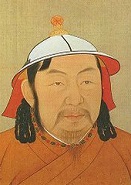
On Jan. 27, 1311 emperor #3 (since June 21, 1307) Yuan Wu Zong (b. 1281) dies, and on Apr. 7 his brother Ayrubarwada becomes Yuan Ren Zong (Buyantu Khan) (Blessed Khan) (1285-1320), Mongol Yuan emperor #4 of China (until Mar. 1, 1320), becoming the first to actively support adoption of Confucian principles into the admin. system incl. the civil service exams. In 1315 the Chinese civil service exams are reinstated by the Mongols, with built-in discrimination in favor of Mongols and their non-Han supporters against the Hans.
In 1315 Sultan Alauddin of Delhi dies just as the Mongols are beginning to infiltrate the N frontiers of his Muslim domain.
On Dec. 16, 1316 Muslim Mongol Persian khan #8 (since July 13, 1304) Oljeitu (b. 1280) dies in Soltaniyeh, leaving a magnificent tomb, and his son Abu Sa'id (Sayed) Bahador (Behauder) ("hero") (1305-35) becomes Persian Mongol Ilkhanid khan #9 (until Dec. 1, 1335), the last before the empire disintegrates.
In Apr. 1318 a group of Franciscans led by Odoric of Pordenone (Odorico Mattiussi or Mattiuzzi) (1286-1331) incl. James of Ireland leave Padua, Italy on a mission to the East (ends 1330), taking them to Venice, Constantinople, Trebizond, Armenia, Media, Persia incl. Kashan, Yazd, Persepolis, and Shiraz, India (Thane near Mumbai), Sumatra, Java, Borneo, Champa, Guangzhou, Quanzhou, Zhejiang, Hangzhou, Nanjing, and Khanbaliq (modern-day Beijing) in 1324-7, returning via the Land of Prester John (Mongolia), Casan, Tibet, N Persia (incl. Tabriz) to Venice; in 1328 Odoric becomes the first Euro to visit Tibet - the original Pordenone's Complaint?
On July 13, 1318 Persian Ilkhanid minister (since 1298) (a Jew who converted to Islam) Rashid al-Din Hamadini (b. 1247) is beheaded after his rival Amir Chupan (Choban) (-1327) gets him framed on trying to poison Oljeitu Khan, and takes his job as grand vizier.
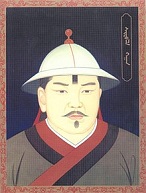
On Mar. 1, 1320 emperor #4 (since Apr. 7, 1311) Buyantu Khan (Yuan Ren Zong) (b. 1285) dies, and on Apr. 19 his eldest son Shidebala becomes Geegan ("enlighttened") Khan (Yuan Ying Zong) (1302-23), Mongol Yuan emperor #5 of China (until Sept. 4, 1323).

On Sept. 4, 1323 after instituting anti-corruption reforms and siding with the Tibetan Buddhists against Muslims, emperor (since 1320) Shidebala (Yuan Ying Zong) is assassinated, becoming the first Mongol ruler to be assassinated, and on Oct. 4 is succeeded by Yesun Temur, who becomes Yuan Tai Ding Di (1293-1328), Mongol Yuan emperor #6 of China (until Aug. 15, 1328).
In 1325 Morocco-born Muslim Berber scholar Ibn Battuta (1304-69) begins exploring as far as India and China (ends 1354).
In 1328 Wang Dayuan (1311-) travels from Quanzhou, China along the South China Sea to South Asia, reching Singapore in 1330, Bengal, Sri Lanka, and India by 1333, and North Africa and East Africa in 1334-9; in 1339 he writes Daoyi Zhilue (A Brief Account of Island Barbarians), one of the first accounts of the history of Singapore.
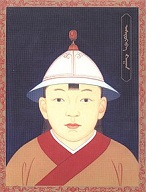

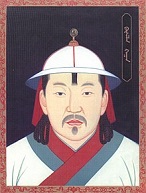
On Aug. 15, 1328 Yuan emperor #6 (since Oct. 4, 1323) Yesun Temur (Yuan Tai Ding Di) (b. 1293) dies, and on Oct. 4 is succeeded by his eldest son Ragibagh (Arigabag), who becomes Yuan Tian Shun (1320-8), but on Nov. 14 before he can be coronated he is dethroned by is succeeded by 24-y.-o. Tugh Temur (Jayaatu "lucky" Khan) (1304-32), who becomes Mongol Yuan emperor #7 of China, then abdicates after 1 mo. in favor of his elder brother Khoshila (Kusala), who on Feb. 27, 1329 becomes Khutughu Khan (1300-29), Mongol Yuan emperor #8 of China Mingzong (until Aug. 30, 1329), who resigns on Aug. 30 in favor of Tugh Temur, who resumes the throne on Sept. 8, 1329 (until Sept. 2, 1332); Eretna Bey (-1352) becomes Mongol Ilkhanid rep. in Rum; the War of the Two Capitals begins, pitting the family dynasty based in Khanbaliq (modern-day Beijing) against the one based in the summer capital Shangdu, which ends in 1332 with a V for the Khanbaliq group after the most bloody and destructive succession struggle in Yuan history.
In 1330 Oderico da Pordenone (d. 1331) returns from the Far East after becoming the first Euro to visit Tibet, and dicates Description of Eastern Regions, claiming that Canton is 3x as large as Venice, and that Hangchow, located in Chekiang (Jujiang) Province on the East China Sea is the greatest city in the world; it becomes a bestseller for cents., esp. plagiarized versions by John de Mandeville.
In 1330 Hu Sihui, dir. of the Chinese Yuan Dynasty imperial kitchen pub. Complete Recipes for Dishes and Beverages, containing the first known recipe for Peking Duck.
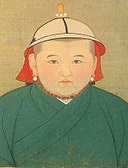
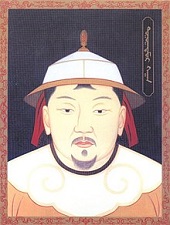
On Sept. 2, 1332 Yuan emperor #7 (since Oct. 16, 1328) Tugh Temur (b. 1304) dies, and on Dec. 14 his younger brother Rinchibal becomes Yuan Nin Zong (1326-32), Yuan emperor #8, dying prematurely on Dec. 14; next July 19 he is succeeded by Toghon Temur, who becomes Yuan Hui Zong (Sun Di) (Shun Di) (1320-70), Mongol Yuan emperor #9 (last) of China (until 1368), stirring revolt by starting a strong anti-Chinese program after drought, famine, floods, and plague kill 5M in China in 1333, followed in 1334 by the Black Death, which strikes China's NE Hopei Province, then sweeps along the trade routes to Europe by 1347; by 1351 it kills 20M-30M in Europe (a third of Europe's pop., and up to 60% in some areas), and 75M worldwide by 1361; world. pop. decreases from 450M to 350M-375M by 1400; Europe takes 150 years to return to 1347 pop. levels; it ravages China, halving its pop. from 123M in 1200 to 65M in 1400.
In 1333-7 drought, famine, floods, and plague kill 5M in China incl. 4M in Kiang, laying the ground for Europe's Black Death?
The Black Death (the original Darth Vader) rockets through Europe's Internet with breathtaking speed? In Oct. 1347 a Genoese trading fleet arrives in Messina, Sicily carrying the Black Death (Bubonic Plague) (Yersinia pestis bacteria), carried by fleas from rats; it also arrives in Egypt, Syria, and Cyprus; by 1351 it kills 20M-30M in Europe (a third of Europe's pop., and up to 60% in some areas), and 75M worldwide by 1361; world. pop. decreases from 450M to 350M-375M by 1400; Europe takes 150 years to return to 1347 pop. levels; it ravages China, halving its pop. from 123M in 1200 to 65M in this cent.; lucky America is not affected, but not toughened up by it either?; rats didn't really spread it, because it spread too fast from person to person?
On Sept. 26, 1348 Pope Clement VI issues the bull Quamvis Perfidiam, attempting to dispel the rumor that Jews caused the Black Death by poisoning wells, saying that they too are suffering from the plague, but he is ignored. In summer 1349 the Great Plague reappears in Paris, where it peaks, killing up to 800 a day, and spreads to Picardy, Flanders, and the Low Countries; also in the summer it reappears in London, and spreads to Ireland, killing 25% of the pop. within a year; by the middle of the year half of the pop. of Venice is killed; by the end of the year half of England's pop. is killed, and a truce with France is called; the plague spreads to Norway when an English ship full of corpses floats into Bergen, and reaches Elbing (Elblag), Poland on Aug. 24; the Church and its credibility being challenged head-on, the main solution offered is by the Flagellants, who appear in force all over Europe (especially Germany), torturing themselves publicly, and proclaiming that the Second Coming is 33.5 years away (I been a bad, bad boy, so tan my sinful hide?), while causing trouble for Jews, the rich, the Church, and finally themselves (besides all the wounds), causing Pope Clement VI to pub. a bull condemning them on Oct. 20; "Many persons, and even young children were soon bidding farewell to the world, some with prayers, others with praises on their lips."
In 1349 the Chinese finally settle Singapore in Malaysia.
In 1351 there is massive flooding of the Yellow River in China; Liu Futong leads the rebel Red Turban Army in Yin Zhou (created by Guo Zixing from followers of the White Lotus in response to the Black Death) in a successful rebellion against the Mongol Yuan Dynasty (ends 1368).
In 1357 the Ispah (Persian Sepoy) Rebellion (ends 1366) in Fujian, China sees a Mongol army of mainly Arab and Persian Muslims revolt against the Yuan Dynasty, occupying Quanzhou (Chinchew) (Zaiton) on the SE coast of China beside the Taiwan Strait, alng with Putian, threatening Fuzhou until it collapses in 1362 and is crushed by Han Chinese cmdr. Chen Youding.
In 1367 the Chinese discover the 49 sq. mi. 64-islet Pescadores (Port. "fishermen's islands") in the Taiwan Strait 30 mi. from Taiwan; the Portuguese discover them in the 16th cent.

The Black Death was actually good for Chinese? In 1368 Chinese peasant (former Buddhist monk) Zhu Yuanzhang (Yuan Zhang) (Chu Yuan-chang) (1328-98) leads Chinese rebels from S China to capture Guangzhou, causing Mongol ruler (since Dec. 19, 1332) Toghan Temur to flee to Kai Ping (Karakorum); the Yuan Dynasty (founded 1271) ends, and the Ming (Chin. "luminous") Dynasty (ends 1644), vased, er, based in the new city of Nanjing (Nanking) (Chin. "southern capital") begins (ends 1644), becoming the first reunion of China by the S (next time is the Communists in 1948); on Jan. 23 Zhu Yuan Zhang takes the title Ming Taizu (Tai Tzu) (T'ai Tsu) (1328-98) of the Hong (Hung) Wu (Chin. "vast military") becomes Ming emperor of China #1 (until June 24, 1398), with the motto: "Exiling the Mongols and restoring the Han", going on to end the Confucian view of the military as inferior to scholars; in Sept. the Mongols flee their capital of Khanbaliq (modern-day Beijing) along with the rest of N China and retreat to Mongolia; Ming Taizu promulgates the new Ta (Da) Ming Lu (Chin. "Immutable Laws") law code (completed in 1397), and restore the Great Wall of China, along with a gen. policy of isolation, while the introduction of Western foodstuffs such as wheat and yams causes a 50% pop. increase during his 30-year reign; too bad, he doesn't like merchants, and introduces paper currency, running the presses until he creates inflation.
In 1372 Chinese emperor (since 1368) Ming Taizu orders the release of all people enslaved by the previous don't-make-a-grown-man-cry Mongol regime; the king of Okinawa pledges allegiance to Ming Taizu, opening Okinawa to trade; it remains a tributary of China for 500 years.
In 1386 Ming Taizu orders his officials to buy back children sold into slavery in Hainan Province by their parents during a famine. In 1387 Ming Taizu completes the liberation of China from the Mongols.

In 1369 Moroccan traveler-scholar Muhammad Ibn Battuta (b. 1304) dies after traveling through most of the Muslim World and many non-Muslim countries in North Africa, the Horn of Africa, West Africa, the Middle East, India, Central and Southeast Asia, and China, leaving his "Travels" (Rihla).
On June 24, 1398 emperor (since 1368) Ming Tai Tzu (b. 1328) dies, leaving 24 sons, all princes; too bad, inept son Jianwen becomes Ming emperor #2 Ming Hui Di (-1403) (until 1403).
In 1400 Luo Guanzhong (1332-1400) dies, leaving the 800K-word 120-chapter historical novel Romance of the Three Kingdoms, set in the Three Kingdoms (Cao Wei, Shu Han, Eastern Wu) era of 169-280 C.E., covering 1K dramatic chars, becoming the Shakespeare of Chinese lit.; he also leaves (with Shi Naian) Outlaws of the Marsh (Water Margin), becoming the first two of the Four Great Classical Novels of China along with "Journey to the West" and "Dream of the Red Chamber".
In 1403 emperor (since 1398) Jianwen (Ming Hui Di) is overthrown by his uncle Yung-lo (Yongle), who becomes Ming emperor #3 Ming Chen Zu (Ch'eng Tsu) (-1424) (until 1424), going on to build the Purple Imperial City on the holy mountain of Wu Dang (Wu-Tang) in NW Hubei Province; sections of the Great Wall of China are rebuilt using sticky rice mixed into slaked lime to make it last longer.

In 1405 the pesky Mongols out of his hair, Ming Chen Zu commissions the Seven Voyages of Cheng Ho in the Indian Ocean (ends 1433) in 317 technologically advanced ships with 37K crew in order to impress neighbors, bring states into vassalage, and get treasure and trade goods (dwarfing anything the Euros can match for the next two cents.), all headed by Chinese Muslim royal eunuch adm. Cheng Ho (Zheng He) (1371-1433), accompanied by four officials incl. accompanied by four officials incl. Ma Huan of Zheng (1380-1460), Fei Xin (Hsin) (1385-1437), Gong Zhen (Kung Chen), and Guo Chongli; the First Voyage of 63 ships with 27K men begins (ends 1407), with the goal not to conquer or trade, but to assert Chinese superiority.
In 1406 Ming Chen Zu sends messengers to Japan, and occupies Vietnam in an attempt to make it a Chinese province (until 1428). In 1407 China conquers Vietnam again for two decades (until 1428); meanwhile Cheng Ho returns to China from his first voyage with the prince of Palembang (Sumatra) in chains. In 1408 Cheng Ho embarks on his Second Voyage from China to Ceylon (ends 1412); the Chinese occupy Sri Lanka (Ceylon) (ends 1438).
In 1418 rich landlord Le Loi (1385-1433) leads Vietnamese forces against the invading Chinese, and defeats them in 1428.
When I wear black I don't want flakes but I do want healthy hair? In 1420 Chinese Ming emperor Yongle founds Dongchang, and moves his capital from Nanjing to Khanbalik, renaming it Peking ("northern capital") (modern-day Beijing), building a wall around the city, and establishing his court S of the old Mongol court; Tartar City in Peking (begun 1409) is completed; the 178-acre Forbidden City (Tzu Chin Ch'eng = "Forbidden City of the Pole Star") in Peking inside the Imperial City (Huang Cheng) is begun; it is surrounded by a 120-ft. moat and pink-washed walls, and contains the imperial palace and bldgs. roofed with yellow porcelain tile, becoming the home of 24 emperors until 1911; the Great Temple of the Dragon (Heaven) is built in a large tree-shaded park in Peking on the E side of the road leading to the main entrance of Tartar City in a 1-mi.-square enclosure, where the emperor worships periodically - I'm the kind of guy who goes to the zoo and wails on the animals?
On Mar. 8, 1421 Cheng Ho begins his Fifth Voyage from China, scheduled for two years in a fleet of giant 9-masted ships, during which he discovers America?

On Aug. 12, 1424 Ming emperor (since July 17, 1402) Yongle (b. 1360) dies during a campaign against the Mongols, and on Sept. 7 his eldest son Zhu Gaochi becomes Ming emperor #4 of China Ming Ren Zong (Hongxi) (Chin. "vastly bright") (1378-1425) (until May 29, 1425), trying to relax his father's tight centralized admin. control, causing a period of lethargy during his 1-year reign.
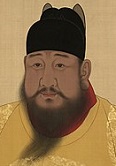
On May 29, 1425 Chinese emperor (since Sept. 7, 1424) Ming Ren Zong (Xuan-de) dies, and is succeeded on June 27 by his eldest son Zhu Zhanji as Ming Xuan Zong (Xuande) (Chin. "proclamation of virtue") (1399-1435), Ming emperor #5 of China (until Jan. 31, 1435).

In Oct. 1426 the insurgents win a big V against the Ming Dynasty at the Battle of Tot Dong and Chuc Dong.
In 1428 Vietnam regains its independence from China's Ming Empire, with Le Loi (Le Thai-To) (1385-1433) founding the Le Dynasty (ends 1527), calling the country Dai Viet (Great Viet).

In 1431 Cheng Ho (Zheng He) (1371-1433) begins his (last) Seventh Voyage from China, reaching 20 states and exacting tribute from 11 of them, incl. Muhammad's holy city of Heavy Mecca (ends 1433). In 1433 the Chinese Exploratory Voyages begun in 1405 end with the return of eunuch Chinese adm. Cheng Ho from his 7th voyage after having gone as far W as America?; China isolates itself from the "backward" outside world, burns all the ships, shipyards, and records, and makes it a crime to go to sea from China in a multi-masted ship - boy do they have a surprise coming from those *!?*! backward barbarians?
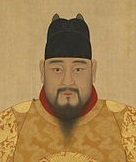
On Jan. 31, 1435 emperor (since June 27, 1425) Xuande (b. 1399) dies, and his son Yingzong (Zhengtong) ("right governance") (Tianshun) ("obedience to Heaven") (1427-64) becomes Ming emperor #6 of China (until 1449), going on to have an interior Great Wall of China built to make it stronger.
On Sept. 8, 1449 Chinese emperor (since 1436) Ming Ying Zong is captured in battle by Esen Tayisi (-1455), chief of the Oirat Mongol 4-tribe confederation at the Battle of Tumu Fortress in Hebei, and after Chinese defense minister and gen. Yu Qian (1398-1457) stops the Mongols 50 mi. from Beijing, the emperor's younger brother Zhu Qiyu becomes Ming emperor #7 of China Ming Tai Tsung (Dai Zong) (Ching Ti) (Jingtai) (1428-57) (until 1457).
In 1450 Ming Ying Zong is released by the Mongols, but his younger brother continues as emperor Ming Tai Tsung, and he is given the title of "grand emperor" and put out to pasture; Ming Tai Tsung goes on to repair the Grand Canal and the dykes on the Yellow River, ruling through minister Yu Qian. On Mar. 14, 1457 Ming Tai Tsung (Zhu Qiyu) (b. 1428) dies, and his elder brother Ming Ying Zong recovers the Chinese throne (until 1464), soon having pesky minister Yu Qian executed, turning him into a folk hero.
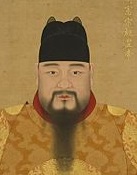
On Feb. 23, 1464 emperor (since 1457) Yingzong (b. 1427) dies, and on Feb. 28 his eldest son Zhu Jianshen becomes Chenghua ("accomplished change") (1447-87), Ming emperor #8 of China (until Sept. 9, 1487), going on to let the eunuchs run all over him, increasing their numbers to 10K and taking over the palace admin. - where did all those balls go?
In 1479 Dayan ("Great Yuan") Khan (Batumongke) (1464-1517) reunites the Mongols in Mongolia, becoming the Khalka Mongols, the largest subgroup of Mongols in Mongolia since the 15th cent. (modern-day pop. 3M).
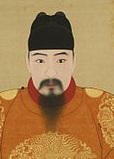
On Sept. 9, 1487 emperor (since Feb. 28, 1464) Ming Xian Zong (Chenghua) (b. 1447) dies, and on Sept. 22 his son becomes Hongzhi ("great government") (Zhu Youcheng) (1470-1505), Ming emperor #9 of China (until June 8, 1505), becoming an ascetic with only one wife and no concubines, who lets affairs of state slide, which is later called the Hongzhi Silver Age.
About 1500 Chinese inventor Wan Hu allegedly devises a flying chair using 47 rockets, which explodes, killing him, becoming the world's first astronaut; Wan-Hoo Crater on the Moon is later named after him.
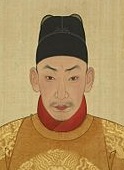
On June 8, 1505 emperor (since Sept. 22, 1487) Hongzhi (b. 1470) dies, and on June 19 his 14-y.-o. eldest son Zhengde ("right virtue") (Zhu Houzhao) (1491-1521) becomes Ming emperor #10 of China (until Apr. 20, 1521), becoming friendly with the Muslims and commissioning Muslim eunuchs to produce blue-white porcelain with Persian and Arabic inscriptions, and being rumored to convert to Islam although his debauched lifestyle denies it; European syphilis reaches Canton; an edict prohibiting the slaughtering of pigs is passed during his reign; eunuch minister Liu Jin (1451-1510), leader of the Eight Tigers group of court eunuchs establishes his power in the Chinese govt., imprisoning 300+ officials and becoming the most corrupt official in Chinese history, the emperor in all but name?
In 1506 ships from France (Fahlanki) enter the Humen (Bogue) (Bocca Tigris) Strait in the Pearl River Delta, and promise tribute; too bad, their noisy cannon piss-off the pop., causing the emperor to order them to leave immediately.
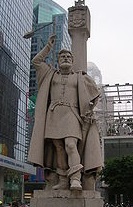
In 1513 the first European ship to land in China is a Portuguese caravel commanded by Jorge Alvares (Álvares) (-1521) that reaches Canton (Guangzhou); later in the year Rafael Perestrello, a cousin of Christopher Columbus is sent by viceroy Alfonso deo Albuquerque in a ship from Malacca, landing on the S shores of Guangdong.
In 1516 the Portuguese introduce maize into China.
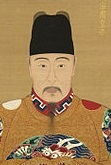
On Apr. 20, 1521 after a 16-year reign in which he overtaxed his people and let bandits flourish while he decimated his court officials for questioning his weird ways and got off on travelling around the country incognito, allowing court eunuchs to entrench themselves inextricably, emperor (since 1505) Ming Zhengde (b. 1491) dies after his pleasure boat capsizes, and on May 27 his 15-y.-o. cousin Zhu Houcong becomes Jiajing ("admirable tranquility") (1507-67), Ming emperor #11 (until Jan. 23, 1567), continuing the same.
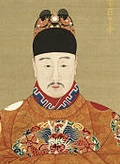
On Jan. 23, 1567 emperor (since May 27, 1521) Jiajing (b. 1507) dies, and on Feb. 4 his speech-impaired son Longqing ("great celebration") (Zhu Zaihou) (1537-72) (AKA the Prince of Yu) becomes Ming emperor #12 of China (until July 5, 1572), going on to attempt to reform corruption and restore trade with Europe, Africa, and Asia and deal with pirates on the Fujian and Zhejiang coasts, repelling the Mongol army of Altan Khan after he reaches Beijing, signing a treaty trading horses fo silk; too bad, near the end of his reign he falls under the spell of Turkic dancer Nu Er Huahua, causing him to abandon official duties for her delights.
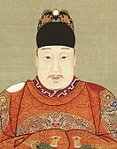
On July 5, 1572 emperor (since Feb. 4, 1567) Longqing (b. 1537) dies, and on July 19 his 3rd son Wanli ("ten thousand calendars") (Zhu Yijun) (1563-1620) becomes Ming emperor #13 of China (until 1620); beginning of the Wan Li Period in Porcelain (ends 1619).
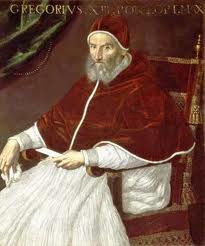
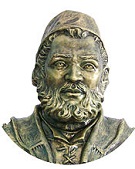

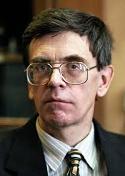

Speaking of clocks, er, calendars. On Feb. 24, 1582 upon the recommendation of German Jesuit astronomer Christopher Clavius (1538-1612), Pope (since May 13, 1572) Gregory XIII (1502-85) issues the bull Inter Gravissimas, decreeing a changeover from the Julian Calendar to the Gregorian Calendar; 10 days (lost since Jan. 1, -46, when the Julian Calendar began) are to be dropped, so that Oct. 15 (Fri.) immediately follows Oct. 4, or Dec. 20 (Mon.) follows Dec. 9; the Papal States, Spain, Portugal, and Poland change in Oct., France, Holland, Belgium, and Scandinavia in Dec.; the Roman Catholic states of Germany and Switzerland adopt it in 1584, followed by Hungary in 1587; too bad, Protestant countries suspect a rat and refuse to change, and the Continental Protestant states hold out until 1700, and England and its colonies till 1752; Russia holds out until 1918, Greece until 1924, and non-Euro states don't adopt it until the 19th and 20th cents., Japan in 1873, Egypt in 1875, Turkey in 1926, and China in 1949; the figure for the length of the year from Copernicus' De Revolutionibus Orbium Coelestium is proposed but not used as the basis of the reform calendar; after a suggestion by Vatican librarian Topo Gigio, er, Aloysius Lilius (Luigi Lilio or Giglio) (1510-76), only century years (1600, 1700, etc.) with the century part itself evenly divisible by four (1600 but not 1700) are leap years, which causes three leap years to be taken out of each 400, trimming the avg. calendar year down quite fortunately to only about 26 sec. longer than the Earth's real orbital period, which will take 3,323 years to become 1 day out of synch; too bad, there should have been a 13-day discrepancy, not a 10-day one, causing the Phantom Time Hypothesis to be developed by Herbert Illig (1947-), Anatoly Fomenko (1945-), Uwe Topper (1940-) et al., that phony phantom centuries were manufactured during the Renaissance to create a nonexistent Dark Ages; Pope Gregory's new calendar for the Christian world changes the date of the new year from Apr. 1 to Jan. 1, and those who still celebrate New Year's Day on Apr. 1 begin to be known as April Fools.
In the 1590s Journey to the West is pub. anon. during the Ming Dynasty, based on the swan song memoirs of Chinese Tang Dynasty Buddhist monk-scholar Xuanzang (Hsuan-tsang) (Hiuen-Tang) (602-664), who travelled to India to obtain the Tang Sanzgan (Three Collections of Buddhist Scriptures), becoming one of the Four Great Classical Novels of China.


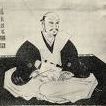




In Jan. 1592 Toyotomi Hideyoshi (1537-98) adopts his nephew Hidetsugu, then retires as regent (tampaku) on Feb. 11, assuming the title of taiko (retired regent); on May 7 the naval Battle of Okpo sees 24 Korean panokson (roofed) ships plus 30 support ships under adm. Ri Sun Shin (Yi Sun-sin) (1545-98) surprise 50 Japanese ships anchored in Okpo Harbor while its troops loot the city, and force a surrender, then on May 8 do ditto at Chokjinpo Harbor; on May 29 (15?) the naval Battle of Sacheon sees adm. Ri Sun Shi first use his technological breakthrough turtle ship (kobukson) (a ramming ship with iron plating or spikes on the deck, which he designed and has constructed on Chon Do Island), attacking 70 Japanese ships in Sacheon with 25 regular ships plus his new secret veapon ship; a Japanese bullet punctures the skin of Ri's left arm in one of the big history what-ifs?; on May 23 the Japanese invade Busan (Pusan) in SE Korea with 7K men under Christian daimyo Konishi Yukinaga (1555-1600) with the aim of conquering the Asian mainland, and the cover story of obtaining safe passage to China, starting the Imjin (Seven-Year) War (ends Dec. 24, 1598); the initial force is mistaken by the Koreans for a trading mission, and has a cake walk, killing 8.5K-30K, then taking Dongnae on May 25 after killing another 3K; eventually 200K men under Kato Kiyomasa (1561-1611) et al. arrive, with the Japanese troops being armed with Euro arquebuses, while the Koreans only have archers; Confucian scholar Ryu Seong-ryong (1542-1607) (you sung wrong?) is appointed Korean PM, in charge of the military, and becomes a big backer of adm. Ri Sun Shin, who on July 8 uses turtle ships to thwart the invasion at the naval Battle of Hansan Island, capturing 47 Japanese ships and destroying 12, and capturing 8K POWs, after which the Korean navy scores continual Vs to undermine Japanese successes on land, with Ri winning all 22 of his naval battles; on Sept. 1 the naval Battle of Busan sees Ri's 60 turtle ships defeat 470 Japanese ships using long-range cannon, while losing only six dead and 25 injured, after which Ri stops the battle to leave the Japanese with some ships to evacuate Korea with; the Japanese introduce tobacco smoking to Korea during their invasion - good for lockjaw?
In 1599 China helps Korea expel the Japanese.
About 1600 the Nguyen Lords (Chúa Nguyen) begin ruling S Vietnam (Cochin China) (until 1800); N Vietnam is controlled by the Trinh Lords; both go on to gobble up all the land to the point of starving the rest of the pop.
In 1602 Spanish Jesuit missionary to China (since July 20, 1597) Father Diego de Pantoja (Didaco Pantoia) (1571-1618) writes a work on Chinese etiquette, with the soundbyte: "When they have ended their salutations, they straightway cause a drink to be brought, which they call ch'a, which is water boyled with a certaine herbe, which they much esteeme... and they must drink of it twice or thrice."
In 1602 Roman Catholic misionaries Matteo Ricci (1552-1610), Diego de Pantoja (1571-1618) et al. write Zhifang Waiji (Chronicle of Foreign Lands), China's first global atlas, incl. the Kunyu Wanguo Quantu (Map of the Myriad Countries of the World), becoming China's first world map.
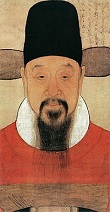
In 1607 Chinese Ming Dynasty scholar Xu Guangqi (1562-1633) translates Euclid's Elements into Chinese, launching China's enlightenment by Western science.
In 1609 tea from China is shipped for the first time to Europe by the Dutch East India Co. - time for a spot of tea?

The Qing Dynasty forms in the murky corners of Manchuria and feeds on the decay of the Ming Dynasty? In 1615 the Tungusic tribes in E Manchuria expand to eight banners (military regions) under Nurhachi (Nurhaci) (1559-1626), who next year takes the title of Emperor Taizu of the Hou Jin (Later Jin) Dynasty, claiming ethnic descent from the Jurchens of the 12th cent., and takes the clan name Aisin Gioro, founding the Manchu Dynasty in China, later ordering the creation of a written script Manchu Language, using a script borrowed from the Mongolian Ulighur alphabet, which becomes the language of China's official circles; by the mid-19th cent. it begins to be superseded by Mandarin Chinese.
In 1618 Nurhachi makes his move, declaring war against Chinese emperor (since 1573) Ming Shen Zong and proclaiming seven grudges to Heaven, occuping Fushun and Qinghe in Liaodong, then pulling out after killing Ming gen. Zhang Chengyin and setting up a govt. with local Han Chinese assistance.
In Mar. 1619 after Nurhachi unifies all of the Jurchen tribes except the Yehe, and attacks them, causing the Ming emperor to send reinforcments to their aid, the Battle of Sarhu sees 100K Ming troops with Korean reinforcements defeated by 10K Manchus under Nurhachi, who uses superior force concentration tactics to win with cavalry despite the Chinese having matchlocks and cannon, messing up their plans to siege Nurhachi's home base of Hetu Ala.
In 1619 the Dzungar ("left wing") Khanate is founded in Dzungaria (Zungaria) (Jungaria) in modern-day Xinjiang (Beijang), China, which stretches from the W end of the Great Wall of China to modern-day Kazakhstan, and from modern-day Kyrgyzstan to S Siberia, becoming the last major nomadic empire remaining from the kaput Mongolian Empire.
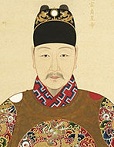
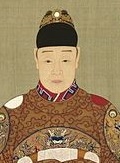
On Aug. 18, 1620 emperor (since July 19, 1572) Wanli (b. 1563) dies after the longest reign of a Ming emperor, and on Aug. 28 his eldest son Taichang ("grand prosperity") (Zhu Changluo) (1582-1620) becomes Ming emperor #14 of China; too bad, on Sept. 26 he dies of diarrhea, and on Oct. 1 his illiterate eldest son Tianqi ("heavenly opening") (Zhu Youxiao) (1605-27) becomes Ming emperor #15 of China (until Sept. 30, 1627), becoming a puppet and devoting his time to carpentry while eunuch Wei Zhongxian (1568-1627) (most powerful Chinese court eunuch in history?) and his nanny/wet nurse Madame Kei (-1627) take power, locking up the teen emperor's concubines and starving them to death; the Donglin Movement arises to protest the govt., along with several popular uprisings, causing Wei Zhongxian to order the torture and execution of Yang Lian, head of the Donglin Academy in Wuxi. In 1621 Li Zi Cheng rebels in China; emperor (since 1620) Ming Guan Zong dies, and Ming Xi Zong (Hsi Tsung) (-1627) becomes Ming emperor #15 of China (until 1627).
In 1625 Nurhachi moves his capital from Liaodong to Shenyang (Mukden) (Shengjing) (Fengtian) (Chen. "city N of the Shen River") on the Hun (Shen) River in NE China, and sets up a civil admin. based on the Chinese model.

In 1626 Nurhachi (b. 1559) dies without realizing his dream of conquering all of China, and his 2nd son Abahai (1592-1643) becomes emperor #2 of the Manchurian Hou (Later) Jin (Chin) (Qin) Dynasty in Mukden, going on to finish daddy's program and absorb Mongol and Han Chinese in NE China into each of their own eight banners, instituting combined Manchu-Mongol-Chinese rule (ends 1911).
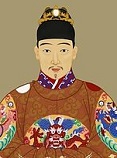
On Sept. 30, 1627 emperor (since Oct. 1, 1620) Ming Tianqi (b. 1605) dies, and on Oct. 2 his younger brother Chongzhen ("honorable and auspicious") (Zhu Youjian) (1611-44) becomes Ming emperor #16 (last) of China (until Apr. 25, 1644); the Manchus invade Korea and place it under vassalage. In 1628 the Jia Ding Christian Conference in China debates on whether to use Latin or Chinese terminology in missionary work, and agrees to use only Chinese terminology.
The mucky clear new Ching Dynasty in China is their last? In 1636 the Manchu clan Aisin Gioro ("Gold Clan") under Abahai of the Later Jin (Chin. "Gold") Dynasty (founded 1616) proclaim the Qing (Ch'ing) (Xing) (Chin. "clear, pellucid") Dynasty in NE China (Manchuria) at Mukden (ends 1911), going on to capture Peking in 1644 and take over the rest of China by 1683; after Emperor Tai Zong demands that Korea accept vassal status and Injo says stuff it, the Manchus invade and make Korea a vassal state; the Ming Dynasty is now in full cookie crumble mode, and the Qins consolidate their position and attack S of the Great Wall when in the mood and the weather permits?
On Jan. 14, 1641 with help from the sultan of Johore, the Dutch take possesion of the Portuguese fort of Melaka (Malacca) (held since 1511) - and the Dutch become the Spice Girls of Europe?; meanwhile after years of bloodshed the Dutch oust the Chinese from Formosa (Taiwan) to control the Sika deer trade, and rule it until 1661.
In 1642 floods in China kill 300K after rebels destroy river dikes in Kaifeng (Hunan Province).
In 1643 Chinese bandit ("the Yellow Tiger") Chang Hsien-chung (Zhang Xianzhong) (1606-47) wipes out the pop. of Szechwan Province, killing 40M by 1647.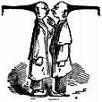
The last Chinese dynasty Qings the cash registers until the eve of WWI? In 1644 a band of rebels led by Li Zicheng (1605-45) captures Beijing, causing emperor Ming Si Zu to ming sizuelf, er, hang himself, ending the Ming Dynasty in China, which ruled from 1368; rather than surrender to the rebels, Ming gen. Wu Sangui (San-kuei) (1612-78) permits the Manchus to cross the Shanhai Pass into China, and they enter Peking and defeat Li Zicheng, founding the Tartar Manchu Qing (Ching) (Ch'ing) (Xing) Dynasty (ends 1912), moving their capital from Mukden to Peking, and going on to build many famous structures; Qi Shun Zhi (Sun Zhi) (-1661), nephew of Dorgon becomes Qing emperor #1 of China (until 1661); the Prince of Lu, the Prince of Fu, the Prince of T'ang, and Prince Yung Ming (1647-62) vie for the imperial throne (until 1659); the era of the Ming Rebels in China begins (ends 1683); the Manchus order the Chinese to shave their heads and wear pigtails (cues) to humiliate them, but it backfires and becomes so popular that they continue to wear them after 1912; otherwise the Manchus work to establish good relations with the Chinese, continuing the Ming govt. structure of six ministries, with the addition of a Manchu Grand Council, military garrisons under eight Manchu banners distributed throughout the empire, and four Han Chinese appointed as govs in the south; meanwhile fast-ripening 30-day turnaround rice is developed, causing a pop. explosion (300M by 1750), with excess pop. spilling into sparsely populated areas incl. Guizhou and Yunnan.
In the 1650s opium smoking becomes a huge problem in China.

In 1661 emperor (since 1644) Shun Zhi dies, and his 8-y.-o. son Kang Xi (K'ang Hsi) becomes Qing (Manchu) emperor #2 of China Qing Sheng Zu (1654-1723) (until 1723); his personal rule begins formally in 1667, but not in fact until 1669, and becomes the longest reign in Chinese history (62 years), marked by spectacular cultural achievement and many major scholarly enterprises, while the emperor makes six tours of his empire to observe local conditions.
In 1661 Taiwan pirate leader Zheng Zhilong (b. 1604) is executed in Beijing, and his son Zheng Chenggong (1624-62) succeeds him, becoming known to Europeans as Koxinga from his Chinese title Lord of the Imperial Surname, going on to expel the Dutch from Taiwan (by 1662), becoming a curb-your-enthusiasm Chinese nat. hero.
In 1668 foot binding in China (forbidden in 1638, 1645, and 1662) is finally restricted to Chinese only. In 1673 the Revolt of the Three Feudatories (ends 1681) begins when Ming gen. Wu Sangui (1612-78) and two other Han traitor gens. decide their satrapies in S China aren't enough reward for helping the Manchus take over China, and revolt.


In 1672 Flemish Roman Catholic Jesuit priest Father Ferdinand Verbiest (1623-88) AKA Nan Huairen builds (just designs?) a steam-powered vehicle for the Chinese Qing Kangxi emperor, becoming the world's first automobile?; too bad, it's too small to carry a driver or passengers?
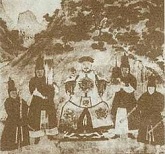
In Aug. 1673 the Revolt of the Three Feudatories (ends Nov. 1681) begins when Ming gen. Wu Sangui (1612-78) and two other Han traitor gens. decide their satrapies in S China aren't enough reward for helping the Manchus take over China.
In 1683 Dutch traders are admitted to Canton.
In 1683 the Qin Dynasty Manchus seize the island of Taiwan (Formosa) from the pirates, and it becomes an appendage of the province of Fujian (until 1895).
In 1685 Chinese forces begin attacking the Cossack fort of Albazin in the Amur River region, claiming it as their own territory (until 1689).
In 1685 all Chinese ports are opened to foreign trade.
In 1687 the Dzungar-Qing Wars begin between the Dzungar Khanate in Mongolia and the Qing Dynasty of China, ending in 1757 with the Qings incorporating Outer Mongolia.
On Aug. 27, 1689 the Treaty of Nerchinsk (Nierchul) with Russia is China's first treaty with a European nation, stipulating Russian abandonment of Albazin, and an end to military pressure for commercial contacts; their mutual boundary is delineated.
In 1690 Chinese emperor (since 1661) Qing Sheng Zu personally leads the defense of the Khalka states of China in C Mongolia from the forces of Mongol leader Galdan (-1697); in 1697 China conquers W Mongolia, which is incorporated into Qing territory with military colonies established; Galdan poisons himself.
In 1692 Chinese emperor Qing Sheng Zu issues an Edict of Toleration for Christians.
In 1694 the British East India Co. acquires monopoly trading rights in Canton, China (until 1834).
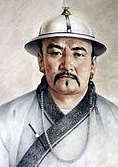
On June 12, 1696 the Battle of Jao Modo (Zuunmod) (Hundred Trees) on the Upper Terelj River 37 mi. E of modern-day Ulaanbattar sees a 30K-man Dzungar-Mongol army under well-educated Buddhist Galdan Boshugtu Khan (1644-97) defeated by a 50K-man Qin army under the personal command of the Kangxi Emperor, pushing the Dzungar Mongols to Inner Asia until their final defeat in 1758.
In 1708 Jesuit missionaries produce the first accurate Western Map of China.
In 1709 Taipei (modern pop. 2.7M/8.5M) on the Danshui River on N Taiwan Island, home of the Ketagalan tribes is settled by mainland Han Chinese immigrants.
In 1717 the Tibet Revolt (ends 1720) begins with the seizure of Lhasa by Tsewang Rabdan (1697-1727), nephew of W Mongol (Olot) chief Gladan. The Tibet Revolt (begun 1717) is suppressed by armies from Gansu and Sichuan, the Mongols are driven out of Tibet, and Tibet becomes a Chinese protectorate, with a popular Dalai Lama enthroned, protected by imperial garrisons.
In 1723 emperor (since 1661) Qing Sheng Zu (Kang Xi) (b. 1654) dies, and in Dec. Qing Shi Zong (Shih Tsung) (-1736) becomes Qing (Manchu) emperor #3 of China, founding the Yung Zheng (Cheng) Dynasty, going on to ban Roman Catholicism in China, issuing the first anti-opium edict in 1729, and reducing slavery in China in 1730 while fighting Mongols in the W.
In 1727 the Amur frontier between Russia and China is rectified via the Kiakhta (Kyakhta) Treaty, negotiated by Bosnian Serbian Russian minister Count Sava Lukich Vladislavich Raguzinsky (1669-1738) in Peking, governing their relations until the mid-19th cent.

I'm T-N-T, I win the fight, I'm T-N-T, the power of love? On Oct. 8, 1735 emperor (since 1723) Qing Shi Zong (Yung Zheng) dies, and Hong Lee (Hongli) becomes Qing (Manchu) emperor #4 of China Qian Long (Qianlong) (Ch'ien Lung) (Gao Zong) (Kao-tsung) (1711-1799) (until Feb. 9, 1796), the greatest Manchu emperor of China, forcibly uniting China and establishing a cultural orthodoxy, not to mention insulting the Beatles?; Tang Ying becomes supt. of the imperial kilns at Jingdezhen, developing the technique of opaque famille rose overglaze enamels and use of red carmine derived from gold. In 1757 Emperor Qian Long decrees the Closed Door Policy for Westerners in China.
In the 1760s the tea trade between England and Closed Door China is established.
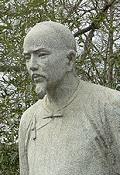
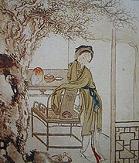
In 1763 Nanjing-born Han writer Cao (T'sao) Xueqin (Zhan) (Chan) (1724-64) writes Dream of the Red Chamber (Mansions) (Story of the Stone) (Honglou Meng) AKA Story of the Stone (Shitou Ji); a semi-autobio. novel about his family, with a huge cast of chars. esp. hot babes, becoming the last of the Four Great Classical Novels of China; it circula
In 1770 the first Norwegian (brown) rats from N China are sighted in the New World, brought by ships; by 1800 they are found in every Euro country, and by modern times they are found in every continent except (knock on Norwegian wood?) Antarctica.
In 1774 Chinese emperor Qing Qian Long orders all Chinese works in his gigantic library censored of all derogatory references to the Manchus and their N China predecessors, causing 2.5K works to be destroyed by 1782.
On Aug. 9, 1785 the first recorded Chinese on the East Coast of the U.S. are brought by the ship Pallas.
On Sept. 30, 1787 Am. fur-trading ship Lady Washington, captained by Robert Gray (1755-1806), and fur-trading ship Columbia Rediviva, captained by John Kendrick (Kenrick) (1740-94) are sent by a group of Boston merchants incl. Charles Bulfinch from Boston, Mass. to trade pelts on the Pacific Northwest coast and take them to China, based on Capt. Cook's success in selling otter pelts in Canton; on Aug. 9, 1790 Gray arrives in Canton, trading his cargo for tea, continuing on a round-the-world voyage and arriving in Boston on Aug. 9, 1790 with a Hawaiian islander he parades through Boston, becoming the first Am. vessel to circumnavigate the globe.
In Jan. 1789 after the rock-u-like-a-hurricane Tay Son Rebellion sees a Chinese (Qing) army capture Thang Long (Hanoi), the Tay Son army, led by Gen. Nguyen Hue leaves Hue City and scores a V in a surprise attack during the Tet New Year Festival at the Battle of Dong Da Hill in SW Hanoi, uniting N and S Vietnam, after which Hue crowns himself emperor Quang Trung (1753-93) (until 1793), ending the Later Le Dynasty (founded 1428), and founding the romantic Tay Son Dynasty (ends 1802), making 6-tone Vietnamese the official language instead of 5-tone Chinese, distributing land to poor peasants, melting coins to make cannons, and other romantic stuff; too bad, resilient Nguyen leader Phuc Anh's French volunteers arrive in S Vietnam in July, establishing a beachhead and consolidating the area - I love being a Ninja Turtle?
On Mar. 8, 1792 a large Chinese army reaches Lhasa to help Tibet fight landlocked Nepal (home of Mt. Everest), and the combined army invades Nepal; after a flood of the Betrawoti River washes away many of the Chinese troops, on Oct. 5 the Treaty of Betrawoti ends the war; Nepal signs a commercial treaty with Britain.
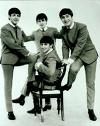


In 1793 King George III of Britain sends the Macartney Embassy (Mission) to China, led by first-ever British envoy Paul, er, George Macartney, 1st Earl Macartney (1737-1806) of Ireland on a 64-gun man-of-war to negotiate a more open trading system and a permanent British embassy, but he is treated with such disdain by Emperor (1736-96) Qin Qian Long (Ch'ien Lung) (1711-99) that it hardens the British to them; imagine, making him kowtow (Chin. "head knock"), and then handing him a worthless rock (jade) as a gift?; on Oct. 7 he leaves after French Jesuit missionary in Peking (since 1750) Jean Joseph Marie Amiot (1718-93) sends him two letters, one of which contains the soundbyte: "This world is the reverse of our own", after which he dies on Oct. 9 - as hard as a Beetle? Don't you know we're more popular than Christ? In 1795 Dutch East India Co. official Isaac Titsingh (1745-1812) (a surgeon and merchant trader) is received with great propriety at the court of Chinese emperor Qin Qian Long just before the celebration of his 60th year of reign, showing up mophead Paul, er, George Macartney of England - tits singing jokes here?

On Feb. 9, 1796 Emperor (since 1736) Qin Qian Long (Ch'ien Lung) (b. 1711) retires, and his son Yongyan (Kia-King) becomes Qing (Manchu) emperor #5 of China Qin Jia Qing (Qing Ren Zong) (1760-1820), issuing the Edict of Peking, forbidding import of opium into China and making opium smoking a capital offense.

Jove knows that I love, but whom, lips do not move, no man must know? Hegel's dialectic launches Euro philosophers into a tizzy for the rest of the cent., and spawns Marxist dialectical materialism and state worship? In 1812-16 German big brain Georg Wilhelm Friedrich Hegel (1770-1831) pub. The Science of Logic (Wissenschaft der Logic) (Die Objektive Logik), about how history is a progressive process from Pure Being (China) to the Absolute Idea (Prussia) (pure thought thinking about pure thought), based on the dialectic (thesis + antithesis = synthesis); "This unity is consequently the absolute and all truth, the Idea which thinks itself"; "The history of the world is the discipline of the uncontrolled natural will, bringing it into obedience to a universal principle and conferring subjective freedom. The East knew, and to the present day knows, that 'one' is free; the Greek and Roman world, that 'some' are free; the German world knows that 'all' are free", therefore America is the land of the future, and the Absolute will reveal itself one day, perhaps in a contest between North and South America", with war being necessary, along with class structures and the state; his 1811 marriage makes him get serious, and this work gets him a job as prof. of philosophy at the U. of Heidelberg in 1816, followed by prof. of philosophy at the U. of Berlin in 1818-31.

In 1816 British ambassador William Amherst, 1st Earl Amherst of Arracan (1773-1857) is snubbed by Chinese emperor (since 1796) Qin Jia Qing when he refuses to kowtow like Lord McCartney did in 1793 - by 2008 the Chinese will be giving out free tickets to the Beatles? No surprise, in the 1820s the Chinese opium trade starts to expand rapidly under British govt.-backed dope pushers.

On May 16, 1820 the frigate USS Congress becomes the first U.S. warship to visit China. On Sept. 2, 1820 emperor (since Feb. 9, 1796) Qin Jia Qing (Yongyan) (b. 1760) dies, and on Oct. 3 Qin Dao Guang (Qing Xuan Zong) (1782-1850) becomes Qing (Manchu) emperor #8 of China (until Feb. 25, 1850).
In 1833 its 20-year charter up once again for renewal by Parliament, the British East India Co. loses its last monopoly of trade over China.

In 1833 starving but cunning English linguist George Henry Borrow (1803-81) is hired by the British and Foreign Bible Society in London to trans. the New Testament into the Manchu language, which he does this year after learning the language in 19 weeks.; too bad, the Chinese govt. prohibits its importation - hun how?
Her Majesty's Most Excellent Drug Pushers carry on? In 1835 British opium sales in China rise to 17,257 chests, up from 2,330 chests in 1788 - feel the kiss, taste the rainbow?
On July 14, 1837 Chinese Manchu emperor (since 1820) Qin Dao Guan pub. an edict calling for the punishment of opium dealers "without the slightest indulgence" - cut off what? stick it up where?
On Nov. 3, 1839 after the Chinese attempt to curb British imports of opium, detaining British ships and destroying 2.64M lbs. of British opium, the First Anglo-Chinese (Opium) War begins (ends Aug. 29, 1842); Chinese junks prove no match for British warships, so it's a cakewalk for the British, although it's a big country?

On Jan. 20, 1841 the island of Hong Kong at the mouth of the Pearl River is ceded to Britain by China, and on Jan. 26 Britain formally occupies it (ends 1997); too bad, China failed to fortify the Pearl and Yangtze Deltas against British warships, turning into a major disaster.

On Aug. 29, 1842 the First Anglo-Chinese (Opium) War (begun Nov. 3, 1839) is ended by the Treaty of Nanking, confirming the cession of Hong Kong to the British drug lords, and making Canton a treaty port open to foreign trade, freeing the Brits to addict millions of Chinese to opium (until 1908) under Hong Kong gov. #1 (June 26, 1843-May 8, 1844) Sir Henry Eldred Curwen Pottinger (1789-1856) (June 26, 1843 to May 8, 1844) - it's going to be a bright sunshiny day?
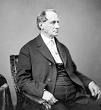
In 1844 China allows the first Christian missionaries into their country, and five Chinese ports are opened to U.S. ships after negotiations led by U.S. minister Caleb Cushing (1800-79) result in the Treaty of Wang Hiya (Wangshia), the first U.S.-Chinese treaty of peace, amity, and commerce; French Lazarist missionaries Abbe Evariste Regis Huc (1813-60) and Joseph Gabet begin a journey from China to Tibet, arriving in Lhasa in 1846.
On Feb. 2, 1848 the first Chinese immigrants to San Francisco arrive in the Eagle one week after the Calif. Gold Rush starts, adding to the seven already there. Also in 1848 the Hawaiian govt. begins privatizing land in their country that's been depleted of people by foreign diseases, giving foreign-owned plantations a free hand to monopolize agriculture and import indentured laborers from China, Japan, and other Asian countries in an attempt to mix more "hardy" genes into the Hawaiian pop. - the Hakka women have big feet, the Punti women small feet?





In 1850 the pop. of China: 430M, Germany: 34M, France: 33M, Spanish-speaking America: 22.5M, Great Britain: 21M, Brazil: 7.2M. In the 1850s Chinese laborers begin migrating to the Malay Peninsula to work in tin mines, with many ending up as coastal pirates. The Euros decide that profit trumps Christ in China? On Feb. 25, 1850 emperor (since 1820) Qin Dao Guan (b. 1782) dies, and on Mar. 9 Qin Xian Feng (Qing Hsien-fung) (Chin. "universal prosperity") (1831-61) becomes Qing (Manchu) emperor #7 of China (until Aug. 22, 1861); after bribing a midwife to coverup her lack of virginity, cagey Manchu babe Cixi (Tzi-Hi) (Tsu-Hsi) (1835-1908) enters his harem as a concubine, 5th rank, then gives him some hot hsien-fung, bearing son (future emperor) Tong Zhi (Tung-chih) in 1856, receiving a promotion to 2nd rank in 1858; when the 30-y.-o. old man dies she proves she's done her homework, going on to virtually rule China for half a cent.; meanwhile in Dec. S Chinese peasants demanding land and equality, led by Hong Xiuquan (Xichuan) (Hung Hiu-Tsuen) (Hong Huoxiu) (Renkun) (1814-64), a Hakka Christian who had studied under Southern Baptist missionary Issachar Jacox Roberts (1802-70), and had made many converts, becoming Taiping heavenly king next Jan. 11 (until June 1, 1864), claiming to be the brother of Jesus Christ, and becoming known for keeping a Saturday Sabbath and eschewing tobacco and opium, burning it wherever found, begin the 14-year Taiping (Chin. "great peace") Rebellion (ends Aug. 1864); Hong Xiuquan proclaims himself emperor of the Taiping Heavenly Kingdom, attacks Peking, and takes Nanking (1854) and Shanghai from the Manchus, making thousands of Christian converts, albeit with a fractured trans. of the Bible; too bad that they destroy all idols, incl. statues of Christian saints and the Virgin Mary, pissing-off the Jesuits, who drag in the French to support the Manchus, and make the U.S. and British missionaries (who together had only made 1.5K converts) jealous, causing them to begin spreading disinfo., calling them pagans and accusing them of atrocities; worse of all, the British get mad at loss of opium revenue and send arms to the Manchus, which PM Gladstone later calls a black mark on British history?; the Taiping Heavenly Kingdom in S China grows to 30M people before it is brutally crushed, with 20M killed by the Qing Dynasty under gen. Zuo Zongtang (Tso Tsung-t'ang) (1812-85) (AKA Gen. Tso).
In 1852 the first major wave of Chinese immigration to the U.S. is a breathtaking 20K.
In 1852 the Yellow River diverts its course northwards into the Gulf of Chihli (Po Hai), taking over the Ji River and making it disappear.

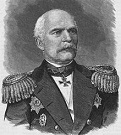
On Dec. 31, 1853 Russian tsar (since 1824) Nicholas I grants to Eastern Siberia gov. (since 1847) Nikolai Nikolayevich Muravyov (Muravyov-Amursky) (1809-81) the right to negotiate with the Chinese about extending the Russian border to the Amur River (prohibited since the 1689 Treaty of Nerchinsk), along with troops and settlers, and next year he sends a 77-barge fleet led by the steamship Argun to sail to the Amur's estuary, led by explorer (later adm.) Gennady Ivanovich Nevelskoy (1813-76) (known for the soundbyte "Where the Russian flag is hoisted it should never be lowered"), who goes on to prove that Sakhalin is an island. Meanwhile in 1853 the Yellow River diverts its course into the Gulf of Chihli (Po Hai).

On Oct. 8, 1856 the Arrow (Second Anglo-Chinese) (Second Opium) War begins (ends Oct. 24, 1860) after Chinese authorities in Canton board the ship Arrow (flying the British flag) and arrest some Chinese members of the crew, but not its British capt. (the Chinese owner of the ship lives in Hong Kong, so he has the right to fly the Union Jack); when the sailors are later returned but no apology is made, the British rep. in Canton summons warships to attack and occupy Canton, which escalates into a gen. demand to better observe the Treaty of 1842 by giving the English free entrance to certain Chinese ports; U.S. Navy Capt. Andrew Hull Foote (1806-63) is sent to Canton to establish fortified shore posts to protect U.S. residents, and then storms and destroys some Chinese forts firing on them, becoming a minor hero.
In 1857 the British fleet aided by the French takes Canton.
In 1858 Chinese immigrants begin coming to Canada; the first Chinese immigrant arrives in New York City; quick-on-the-draw Calif. passes a law banning entry of Chinese, and Mongolians too. On June 18, 1858 the Treaty of Tianjin (Tientsin) allows cigarettes to be imported into China duty-free. Also in 1858 Russia and China sign the Treaty of Aygun (Aigun), negotiated by Nikolai Muravyov, an "unequal treaty" extending the Russian border to the Amur River, incl. Priamurye, Sakhalin Island and most of Primorsky and Khabarovsk, and granting Russia free access to the Pacific Ocean, getting Muravyov a promotion to Count Amursky ("of the Amur River"); to get new settlers he ends up importing Baikal Cossacks and Nerchinsk peasants.
On June 6, 1860 (July 2 Old Style) the Russian military supply ship Manchur commanded by Capt.-Lt. Alexey K. Shefner founds the outpost of Vladivostok (Russ. "ruler of the East") (modern-day pop. 600K) on the Golden Horn Bay near the Russian borders with China and Korea; town status is granted on Apr. 22, 1880; in 1916 the Trans-Siberian Railway connecting Vladivostok to Moscow is completed, giving a royal road to Europe.




Thanks for your cooperation? On Aug. 1, 1860 after China bans foreign embassies in Peking, British forces under Gen. Sir James Hope Grant (1808-75) land, then on Aug. 12 bombard Sinho with the world's first breech-loading rifled artillery pieces, taking the Taku Forts opposite Hong Kong on Aug. 21; meanwhile on Sept. 21 French forces under Gen. Charles Guillaume Marie Apollinaire Antoine Cousin-Montauban (1796-1878) (created Comte de Palikao by Napoleon III in 1862) defeat the Chinese at the Battle of Palikao (Pa-li-Chau) at Eight Mile Bridge outside Peking, and reach Peking on Sept. 26, occupying it with 17K Anglo-French soldiers on Oct. 6, then on Oct. 18-20 burning the already-looted Imperial Summer Palace (Yuan Ming Yuan) 9 mi. NW of Peking (built 1707) at the orders of British high commisioner to China (former gov.-gen. of Canada and son of the Elgin Marbles guy, therefore a pro at destroying historical monuments to get souvenirs?) James Bruce, 8th Earl of Elgin (1811-63) in retaliation for the 10-day imprisonment starting on Sept. 18 of British diplomat Sir Harry Smith Parkes (1828-85), destroying priceless antiquities, along with some hairy parks, but saving a lot of porcelain which ends up in English and French country houses, after which the act is criticized by Victor Hugo et al. as barbaric, although the Brits never give the goodies back; the imperial court is forced to relocate to the Forbidden City (until 1924), and a new smaller Summer Palace is built by Empress Cixi, then burnt again by the Brits in the 1900 Boxer Rebellion; on Oct. 18 the Treaty (Convention) of Peking between junky Qin Dynasty China, Britain, France, and Russia, negotiated by Russian diplomat Count Nikolai (Nikolay) Pavlovich Ignatiev (Ignatyev) (1832-1908) and signed by Prince Gong of China and Lord Elgin of Britain forces China to open 11 ports to Westerners, cede both banks of the Amur River and the land S of Vladivostok (Ussuri Krai, the ancient Manchu province of East Tartary) to Russia, and Stonecutters' Island and 3 sq. mi. of the Kowloon Peninsula to Hong Kong for a 99-year term; on Oct. 24 another treaty gives the British rights to opium trading in 90% of the country, and gives Christians the right to proselytize and own property, ending the Second Opium (Arrow) War (begun Oct. 8, 1856) - opium and Christ go hand in hand?
In 1860 the British, while claiming neutrality, and backed by the U.S., begin sending arms to the Manchus to reopen the opium trade, while the Taipings, attempting to become good Christians plead Europe and the U.S. for Christian missionaries, most of whom refuse to go because of propaganda by the British and U.S. missionaries already there, who want to impose only their brand of Christianity, and consider heretic Chinese Christians worse than the Manchus, setting the Taipings up to be crushed by the Manchus, and the Boxer Rebellion later to want to kill all foreign devil Christians; in 1864 there are 200 Protestant missionaries in China from 30 different sects, increasing to 1.3K missionaries by 1889.


On Aug. 22, 1861 Chinese emperor (since 1850) Xian Feng (Hien-feng) (b. 1831) dies in Cheng-te in Hopeh Province after the Euros evacuate Peking and he refuses to return, after which his anti-foreigner entourage enters Peking and usurps the throne, causing his supermom (widow) Cixi (1835-1908) to gain help from pro-Western Yixin, 1st Prince Gong (Kung) (Lord Sixth King) (1833-98) and overthrow them, after which her 5-y.-o. son Zai-Chun (Tsai-chun) is enthroned as Qing (Manchu) emperor #8 Tong Zhi (Tung-chih) (Qing Mu Zong) (1856-75), with both serving as co-regents; Prince Gong and Dong Yuan Chun then establish Cixi as dowager empress and real ruler until her death in 1908, and on Nov. 11 China establishes its first Ministry of Foreign Affairs, which is created as a temporary fix but ends up becoming permanent even after the Commie takeover.
In 1862 the Chinese defeat the Taipings in Shanghai.
In Aug. 1864 the Taiping Rebellion (begun Dec. 1850) of up to 1M peasants falls to attacks led by British Gen. Charles "Chinese" Gordon (1833-85); Hong Xiuquan (b. 1814) commits suicide; total losses are estimated at 20M, seriously weakening the Manchu (Qing) Dynasty and leading to its final collapse in 1912.

On Jan. 7, 1865 Irish-born Central Pacific construction boss James Harvey Strobridge (1827-1921) places an ad in the Sacramento Union announcing jobs for 5K laborers at $3 a day, but after few apply because they can make more in the Nevada silver mines, he contracts with the Chinese Six Cos., an immigration agency named for six areas of S China to provide 9K laborers from Calif. and Guangzhou (Canton) province in China to go with the 1K white suckers that bit; 500+ Chinese end up dying trying to blast through 7K-ft. Donner Pass.

In July 1868 the Burlingame Treaty with China, negotiated by U.S. secy. of state William H. Steward and U.S. minister to China (1861-7) Anson Burlingame (1820-70) (made a special Chinese envoy to the U.S. and Europe by Prince Kung, regent of China) becomes the 1st time that China accepts the principles of internat. law; it establishes free immigration between the U.S. and China, guaranteeing unrestricted immigration of Chinese laborers, in demand by Western mine owners and railroad builders as human ants and nitroglycerin fodder; give credit to the Andrew Johnson admin. for this way to create a new slave class in the U.S. to replace blacks? - foul called: roughing the pigtail?
On June 21, 1870 the Tianjin Massacre sees 13 French and three Russians killed by an angry Chinese mob after the French consul shoots a Chinese; 16 Chinese are executed, reparations are paid, and next year a mission sails to France to apologize.

In 1872 Nanping-born Yung Wing (Rong Hong) (1828-1912 (first Chinese grad from a U.S. univ., Yale College in 1854) organizes the Chinese Educational Mission (CEM) to send 120 male Chinese students ages 9-14 to the U.S., while 30 more are sent to France and Britain for technical training; too bad, when the mission ends in 1881 and the boys return to China, they are found to have adopted several Am. customs incl. playing baseball, causing them to be confined and interrogated - I'm just a girl in the world, that's all you'll let me be?
On Mar. 3, 1875 the U.S. Page Law bars entry of Chinese, Japanese, and "Mongolian" contract laborers, along with felons and prostitutes to the White Is Right U.S.

In 1875 emperor (since 1861) Tong Zhi (Tung-chih) (b. 1856) dies without an heir, and his 4-y.-o. cousin (nephew of empress dowager Cixi) Guang Xu (Kwang-su) (Kwang Hsu) (Qing De Zong) (1871-1908) becomes Qing (Manchu) emperor #9 of China, with his uncle Prince Gong as regent (until 1889) under the supervision of supermom empress dowager Cixi, who stays in charge and surrounds herself with good advisers.

In 1875 Chinese minister Zuo Zongtang (1812-85) suppresses the Tungans of the N Tianshan region, who had been in revolt since 1862, then next year begins reconquering independent Kahsgaria, based in the E Turkestan Silk Road city of Kashgar, killing its leader Mohammed Yakub (Yaqub) Beg (1820-77), then organizes both areas into Xinjiang (Chin. "new territory") in NW China, with capital at Urumchi (Urumqi) (world city farthest from a sea, home to the fair-haired Urumchi Mummies), which becomes a province in 1884, and ends up plagued by separatist Muslims.
In 1875-8 the Great Drought causes the Great Indian (Madras) Famine of 1876-8 in India, the N Chinese Famine of 1876-9 and other famines in Africa, SE Asia, Australia, and NE Brazil in 1876-8 that kill 30M-6M incl. 5.5M in India and 9M-13M in China, aided by an El Nino in 1877-8.

On Sept. 13, 1876 the Chefoo (Zhifu) Convention between the British and Chinese minister Li Hongzhang (1823-1901) pays the Brits a large indemnity, and agrees to open 10 new opium ports to add to the 82K chests a year now imported, not counting the greater amount grown internally; ratified in 1885 - at the dog's eye-view everything falls?

In 1877 China establishes diplomatic legations in London and Berlin, followed by Paris, Washington D.C. and Tokyo in 1878, Madrid and St. Petersburg in 1879, and Lima in 1880. Also in 1877 Irish immigrant drayer Denis Kearney (1847-1907) begins protesting against competition by Chinese laborers in San Francisco, and revives the 1829 Workingman's Party of Calif., backed by several newspapers, with the slogan "The Chinese Must Go", and the soundbyte "We intend to try and vote the Chinaman out, to frighten him out, and if this won't do, to kill him out. The heathen slaves must leave this coast"; he then affiliates with the Grangers and sends a large number of delegates in 1878 to a state convention to draft a new white supremacist Calif. constitution; he tours the east, but fails to expand outside Calif. and eventually retires in 1884.
On Feb. 12, 1881 (Feb. 24 Old Style) the Treaty of St. Petersburg, negotiated by Zeng Guofan's son Zeng Jize (1839-90) returns most of the Ili River Basin in NW China to China.
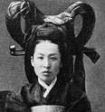
On July 23, 1881 a group of xenophobic Koreans attacks the Japanese legation in Seoul, drawing support from the Chinese, who on July 24 murder Min Kyom-ho, head paymaster of the Tribute Bureau, whose elder brother is the adopted brother of fatherless Korean spider lady ("the last empress of Korea") Queen Min (1851-95); on Aug. 26 the Chinese free the Taewon-gun and take him to Tianjin, returning him to power, where he begins a struggle with Queen Min for control of the Korean govt., resulting in the Chemulpo (Chemulp'o) Treaty of Amity nd Trade (engineered by Queen Min), a mutual defense treaty with the U.S., compensating the Japanese and giving them the right to keep a legation guard.
On May 6, 1882 the U.S. Chinese Exclusion Act bans the importation of Chinese laborers to the U.S. for 10 years, since "the coming of Chinese laborers to this country endangers the good order of certain localities within the territory thereof"; too bad, it has the side-effect of altering the legal definition of U.S. citizenship, creating the concept of illegal alien, leading to passports; it isn't repealed until Dec. 17, 1943; meanwhile the N.M. Territory supreme court rules in Territory of New Mexico v. Yee Shun that Asians have the right to testify before a judge - here comes what right down Santa Claus lane?

On Dec. 4-6, 1884 the Korean Coup (Gapsin Jeongbyeon) of 1884 sees the Japanese-backed Reform Party attempt to oust the Chinese from Korea by taking advantage of its war with France, killing a number of ministers and capturing the king before Chinese troops recapture him and secure the palace in Seoul, causing the Japanese to flee along with reformist leader Kim Ok-kyun (Ok-gyun) (1851-94); full war between China and Japan is narrowly averted.
On Mar. 28, 1885 after two French brigades capture Lang Son on the Tonkin border (Upper Tonkin), then send one brigade away to relieve Tuyen-Quang, the Sun Tzu-thumping Chinese kick French butt at the Battle of Lang Son, but too late to keep the French from solidifying control of Vietnam - we're Chinese, we can wait 70 years to get even, right?

On Apr. 18, 1885 the Li-Ito Convention between Li Hongzhang of China and Prince Ito Hirobumi (1841-1909) of Japan (who started out a xenophobe then studied at Univ. College London, becoming convinced that Japan needs to adopt Western ways) eases the Sino-Japanese confrontation over Korea with an agreement to withdraw troops and notify each other before intervening again; on Apr. 26 the British occupy Port Hamilton (Komun Island) after fearing that Russia might beat them to it, and the Chinese protest, but the British take their sweet time and stay until Feb. 27, 1887; on June 9 the Treaty of Tianjin, facilitated by British customs service (in China) man Sir Robert Hart recognizes the French protectorate of Tonkin in return for a promise to respect China's S border; on Dec. 22 Prince Ito forms Japan's first Euro-style cabinet, with himself as PM #1 (until Apr. 30, 1888).
In Oct. 1885 Yuan Shikai (1859-1916) becomes resident Chinese dir.-gen. in Korea for diplomatic and commercial relations, working to strengthen China's grip and weaken Japan's for the next decade; meanwhile it's not working out the way he wants as Queen Min grows stronger, corrupting the Korean state, taxing the peasants, and increasing Japanese economic control.
On Oct. 1, 1888 the U.S. Scott Act bars Chinese laborers from reentering the U.S., screwing 20K-30K.

On Oct. 12, 1892 French Rationalist historian Ernest Renan (1823-92) dies in Paris, leaving the white supremacist soundbyte: "Nature has made a race of workers, the Chinese race, who have wonderful manual dexterity and almost no sense of honor... a race of tillers of the soil, the Negro; treat him with kindness and humanity, and all will be as it should; a race of masters and soldiers, the European race. Reduce this noble race to working in the ergastulum like Negroes and Chinese, and they rebel... But the life at which our workers rebel would make a Chinese or a fellah happy, as they are not military creatures in the least. Let each one do what he is made for, and all will be well." I guess this is an advertisement to Chinese to go Commie, maybe some of them read it; when it comes to Muslims, he's overreaching, but that doesn't stop Communism from spreading in the Muslim World too.



On Apr. 26, 1894 Confucian teacher Chon Pong-jun (1854-95) becomes leader of the growing Tonghak movement in Korea, which begins to win against govt. forces, causing the king on June 10 to call for help from the Chinese, who send 3K men, causing the Japanese to respond on June 25 with 8K men, who occupy Seoul, after which the two powers forget about the Tonghaks, starting the First Sino-Japanese War (ends 1895) on July 23 after Japan seizes the Kyongbok Palace, forces the Korean govt. to conclude an alliance with it on Aug. 26, and accept reforms; on Sept. 17 14 Chinese ships under Qing Beiyang Fleet adm. Ding Ruchang (1836-95) (who is wounded along with other offices on the bridge from the first shot of his own vessel the Dingyuan) are defeated by 12 Japanese ships under Marshal Adm. Count Ito (Itoh) Sukeyuki (1843-1914) on the Yellow Sea in Korea Bay at the mouth of the Yalu River in the naval Battle of the Yalu River (largest naval battle of the war), with five Chinese ships sunk and three damaged vs. four Japanese ships damaged and no ships sunk, and 1.35K Chinese vs. 290 Japanese casualties; the Chinese suffer from corrupt munitions manufacturers who fill some of the shells with cement instead of high explosives; on Oct. 24 (night) 10K Japanese troops under field marshal Yamagata Aritomo (1838-1922) cross the Yalu River by pontoon bridge into S Manchuria, suprising 23K Chinese troops under Chinese gen. Sung Ching, and defeating them after a 3-hour battle, losing only four killed and 140 wounded, after which the Japanese take the local capital of Antung (Dandong) in Liaoning Province, and divide forces, one group going after Port Arthur and the other Mukden; on Nov. 6 Kinchow (Jinxian) is captured, followed by the port of Dalian on Nov. 7; on Nov. 21 (midnight) the Battle (Massacre) of Lushunkou (Port Arthur) sees 15K Japanese troops attack and defeat 13K Chinese troops and capture the port by night, after which the Japanese enter the city, only to find Chinese soldiers dressed up as civilians sniping at them, pissing them off and causing them to round up and massacre adult males at will, ending with 4.5K Chinese killed vs. 29 Japanese; meanwhile the Tonghaks rise in rebellion, forming the Righteous Army (Uibyong), becoming the largest peasant uprising in Korean history (ends 1895). On Jan. 18, 1895 the Japanese fleet bombards Teng-chow-foo across from Port Arthur; on Jan. 20-Feb. 12 the 23-day Battle of Weihaiwei (8 mi. E of Port Arthur) sees the remnants of the Chinese Beiyang Fleet bottled up in Weihaiwei Naval Base on the Shangdong Peninsula opposite Lushunkou sieged and taken despite a severe snowstorm (Jan. 31-Feb. 1) by the Japanese 2nd Army Corps under Iwao Oyama (1842-1916), who becomes a hero and is created marquis (1895) and field marshal (1898); Chinese adm. Ding Ruchang (b. 1836) is offered asylum in Japan, but commits suicide instead on Feb. 12, and the remnants of his Beiyang Fleet surrender to the Japanese in total humiliation, after which Ding is treated like manure and not given a proper Chinese burial by the govt. until 1912; the Chinese finally begin peace negotiations. On Mar. 4, 1895 the Battle of Yingkou (Newchwang) (Niuzhhuang) outside the treaty port town of Yingkou in Manchuria is a V for the Japanese, who then bombard the town of Tianzhuangtai on the other side of the Liao River, razing it, effectively ending Chinese resistance in the war; meanwhile by the end of Mar. Japanese troops seize the Pescadores (Penghu) Islands near Taiwan. On Apr. 17, 1895 after Japanese and Korean govt. forces quash the Tonghaks and execute its leaders, the Treaty of Shimonoseki in the new town (1889) of Shimonoseki in Yamaguchi Prefecture (known for its big fugu catch) ends the First Sino-Japanese War (begun 1894), giving Japan the upper hand in Korea, with Taiwan (Formosa) (until 1945), the Pescadores, and Port Arthur given to Japan (later returned in exchange for an indemnity); Japan takes over Taipei, Taiwan and turns it into a modern city; China's defeat opens the way for imperialist penetration and unrest, while Japanese control is challenged by popular uprisings.

In 1894 Shanghai-born Methodist missionary Charles Jones "Charlie" Soong (1863-1918) meets Sun Yat-Sen in a Methodist church in Shanghai, backing his anti-Manchu activities then fleeing China next year after an attempted uprising fails, with Sun staying behind because he kept his name out of it; Soong goes on to have children Ai-Ling, Ching-Ling, and May-Ling, who are educated in the U.S.; in 1912 Ching-Ling travels to China just as Sun's republic collapses, and flees with him to Tokyo, engaging in an illicit romance that pisses-off daddy Charlie, who disowns her and breaks all ties with Sun.
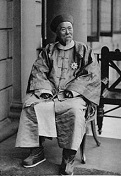
In Aug. 1896 Chinese ambassador ("the yellow Bismarck") Gen. Li Hung-chang (Li Hongzhang), Marquess Suyi (1823-1901) visits the U.S., causing Chop Suyi, er, Chop Suey to become popular in the U.S. after his chef allegedly devises it in New York City.
On Sept. 8 1896 Russia and China sign the Manchuria Convention.
In 1896 the city of Harbin (Manchu "place for drying fishing nets") in Heilongjiang Province, NE China (modern-day pop. 10.6M) becomes the main construction center for the Chinese Eastern Railway through Manchuria, which by 1904 links the Trans-Siberian Railroad coming from E Lake Baikal, Siberia with the Russian port of Vladivostok on the Sea of Japan (East Sea); during the 1904-5 Russo-Japanese War it becomes a base for Russian military operations; after the 1917 Russian Rev. it becomes a haven for refugees, with the largest pop. of any Russian city outside the Soviet Union, gaining the nickname "Eastern Moscow"; in the 1920s it becomes China's fashion capital; in 1985 it begins hosting the annual winter ice sculpture festival in 2004 it is voted China's top tourist city.


On Jan. 20, 1898 after Manchu emperor (since 1875) Guang Xu (Kwang-su) tries the Hundred Days of Reforms to Westernize China, four liberals are appointed to the grand council, incl. Tan Sitong (1865-98) and Kang Youwei (1858-1927); too bad, the emperor ends up confined to his palace for 10 years by his manly woman aunt empress dowager Cixi so she can run everything, and the "Six Gentlemen of the Hundred Days' Reform" end up executed, incl. Sitong, while Youwei flees to India.

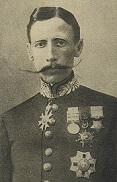
The original Wong Raiders of the Lost Ark, or the original Wong Way Corrigan? On Mar. 28, 1898 the U.S. Supreme Court votes 6-2 in U.S. v. Wong Kim Ark that Wong Kim Ark (1873-), a child born in the U.S. to Chinese immigrants ("citizen by the accident of birth") is a U.S. citizen - the limes are permanently down now and all the white citizens can do is wall the towns? In Mar. 1898 the secret society of Boxers (Righteous Harmony Band), an anti-foreign, anti-Western org. of Kung-Fu (Chin. "skill") experts recruited from provinical militias is formed in China as a response to German occupation of the Qindao region and British seizure of Weihai, and next year it begins a terror campaign against all foreign devils, er, nationals and Chinese Christians, esp. in N China, backed by dowager empress Cixi - do you do you want my fist? On June 9, 1898 Britain and the Qing Dynasty of China sign the Convention for the Extension of Hong Kong Territory (2nd Convention of Peking), negotiated by British diplomat Col. Sir Claude Maxwell MacDonald (1851-1915), leasing Hong Kong for 99 years (who considers it "as good as forever"), with the addition of the New Territories (18 sq. mi.) on the Kowloon Peninsula on the mainland of China - welcome to the casino, I'm Mister Money?
Opening Night for the Global Policeman of the United States? On Sept. 6, 1899 U.S. secy. of state (1898-1905) John Milton Hay sends a circular letter to all the major powers asking them to subscribe to the U.S. Open Door Policy for China, which guarantees Chinese territorial and admin. integrity while preserving free and equal trade with all parts of China by all nations, particularly the U.S.; in other words, gunboat diplomacy cannot be used to carve China up, only to let trade flow to the U.S.; by next year England, France, Germany, Russia, Italy, and Japan agree to it, acknowledging the U.S. as a world power.

In 1899 English-born Germanophile writer Houston Stewart Chamberlain (1855-1927) pub. The Foundations of the Nineteenth Century (Die Grundlagen des Neunzehnten Jahrhunderts), becoming a big hit with the pan-Germanic "Aryan" movement, claiming that the "noble" white Aryan race (Germans, Celts, Slavs, Greeks, Latins) (all descended from the Proto-Indo-Europeans) have always ruled Euro civilization; of course the Nordic or Teutonic peoples are at the top of the Aryan heap; "Physically and mentally the Aryans are pre-eminent among all peoples; for that reason they are by right... the lords of the world. Do we not see the homo syriacus develop just as well and as happily in the position of slave as of master? Do the Chinese not show us another example of the same nature?"; the Germanic takedown of the Roman Empire was good since the latter were already infected with pesky hooked-nose "homo judaeica" (Jews), who were "infusing Near Eastern poison into the European body politic"; "All historically great races and nations have been produced by mixing, but wherever the difference of type is too great to be bridged over, then we have mongrels"; sounds good, until he claims that since Jesus is God, he must have really not been Jewish, but Aryan; after selling 100K copies by the start of WWII, Kaiser Wilhelm II awards him a medal in 1916 and gives him German citizenship, after which Hitler laps it up and guess what happens?; funny that Hitler's British appeaser was named you know what? - should be Foundations of the Twentieth Century Horror Shows?
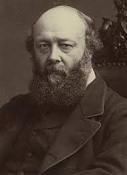
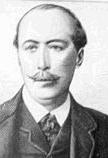

The Hanoverian Dynasty in Britain is embarrassed by its Boers, while the Manchu Dynasty in China is embarrassed by its Boxers? On June 13, 1900 the Boxer Rebellion (Uprising) (Yihetuan Movement), led by the Kung Fu-fighting I-ho Chu'an (Society of Righteous Harmonious Fists) (Righteous Harmony Band) begins in earnest, killing foreign devils (whites) and Christian Chinese indiscriminately, culiminating with the June 20 assassination of a German minister, which causes 200 foreigners to hole-up in the British Legation, beginning the Siege of the Peking (Beijing) Legations, causing Russia, Japan, Britain, France, and the U.S. to assemble a relief force at Taku, and Russia to station 100K troops in Manchuria; on July 9 the Taiyuan Massacre sees the gov. of Shanxi order the execution of 45 Christian missionaries; when Euro troops arrive and find the charred bones of missionaries they get pissed-off and start to destroy the city, until a missionary begs them to spare it; on July 3 the U.S. secy. of state uses this incident to reaffirm the Open Door Policy via another circular letter, resulting in the Oct. 16 Anglo-German Yangtze Agreement, signed by British foreign minister (June 29, 1895-Nov. 12, 1900) Robert Gascoyne-Cecil, 3rd Marquess of Salisbury (1830-1903) and German ambassador to London (1885-1901) Paul von Hatzfeld zu Trachenberg (1831-1901); on Aug. 14 the sieged legation is relieved and the city occupied by the relief force until a peace treaty is signed on Sept. 7, requiring the Chinese to pay 450M Haikwan taels ($740M in gold) over 40 years, convert ad valorem into specific duties, fortify and guard the foreign legation district of Peking, and other humiliations; Russia keeps occupying Manchuria after the rebellion ends; German col. (later gen.) Erich von Falkenhayn (1861-1922) becomes known for ruthlessness during the internat. expedition to crush the Boxer Rebellion, causing Kaiser Wilhelm II to utter the soundbyte: "Just as the Huns a thousand years ago under the leadership of Attila gained a reputation by virtue of which they live in the historical tradition, so may the name of Germany become known in such a manner in China that no Chinese will ever dare again look askance at a German", which is later used by Germany's enemies to call them Huns.
In 1900 the game of Ping-Pong (Whiff-Whaff, Flim-Flam) is patented in England, becoming a nat. hit in China - Balls of Fury?
They were made for each other, blini and sake? On Sept. 5, 1905 defeated Russia signs the Treaty of Portsmouth at the Portsmouth Naval Shipyard in Portsmouth, N.H. (first U.S. city to host the formal conclusion of a foreign war until ?), mediated by Pres. Teddy Roosevelt (who wins the 1906 Nobel Peace Prize for it), ending the Russo-Japanese War (begun Feb. 8, 1904), and becoming the first Asian V over a Western power in modern history, giving control of Manchuria to China, and control of Korea to Japan, bringing peace between Japan and Russia for four decades; Japanese foreign minister Jutaro Komura (1855-1911) is chief Japanese rep.; the Anglo-Japanese alliance is renewed for 10 years; Japanese field marshal Iwao Oyama becomes a bigger hero than ever, and is given the rank of prince in 1907.

In 1905 Western-educated brain man Sun Yat-sen (1866-1925) founds a union of secret societies to kick the Manchus out of China. In Mar. 1907 after being expelled by the Japanese govt., Sun Yat-sen begins staging uprisings in Hanoi (until Mar. 1908), announcing the program of his Chinese Dem. Repub.; too bad, the Manchus pressure Hanoi and he ends up fleeing to Singapore, then visits Europe and the U.S. trying to drum up support. Meanwhile in 1906 China and Britain finally agree to a reduction of opium production.

On Nov. 15, 1908 Dowager Empress Cixi (Tzu-Hsi) (b. 1835), former concubine of Emperor Hsien Feng, who ruled China with poontang power for 50 years dies after a power struggle caused by the emperor's death this year; first she gets her son T'ung Chih ascended to the throne, but he soon dies of smallpox; then she gets his wife Alute overdosed on opium, allowing her to choose the new emperor herself before she dies; her last words: "Never again allow a woman to hold the supreme power in the State"; on Dec. 2 clueless infant Aisingyoro Henry Pu Yi (Puyii) (1906-67) becomes Qing (Manchu) emperor #11 (last) Xuantong of China (until Feb. 12, 1912).
In 1910 China finally abolishes slavery.






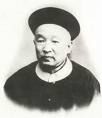
On Oct. 10, 1911 the 1911 Xinhai (Hsin-hai) (Chinese) Rev. (Rev. of the Young Chinese) against the Manchu Dynasty begins when the rev. HQ of the Wuchang org. is discovered plotting against the central railway admin. of Sheng Xuanhuai (1844-1916), and spreads rapidly and bloodily through the W and S; in early Oct. Dr. Sun Yat-sen (Zhongshan) (1866-1925) visits the U.S. to raise money from Chinese immigrants; on Oct. 10 he checks into Denver, Colo.'s Brown Palace Hotel, Rm. 321 (later the Coronet Room), raising $500; he returns to China the next day after reading newspaper headlines saying "Chinese Revolt is Menace to Manchu Dynasty" (Rocky Mt. News), and "Foreigners Throughout Empire in Deadly Peril" (Denver Post); ever after Chinese tourists stop by to see his signature in the guest register; the provinces begin seceding from the Qing Dynasty and join the rev., incl. Jiangsu on Nov. 3, Sichuan on Nov. 22, and Shandong on Dec. 12; after hearing of a program to colonize Mongolia with Han Chinese, the Outer Mongolian Rev. of 1911 begins, bloodlessly becoming independent of the Manchu-run Qing Dynasty during the 1911 Chinese Xinhai Rev.; on Oct. 14 former Korean resident Yuan Shikai (Shih-K'ai) (1859-1916) is recalled to military command by the Manchu court, and on Nov. 8 is elected PM of the provisional nat. assembly; on Dec. 4 he signs a truce with rebel gen. Li Yuanhong (1864-1928), and sends Tang Shaoyi (1862-1938) as his rep. to negotiations in Shanghai; on Dec. 30 Dr. Sun Yat-Sen, back from the U.S. and Europe is elected provisional pres. of the new Repub. of China (1912-49) by delegates from 16 provinces meeting in Nanking (Nanjing); the Manchu (Great Qing) Dynasty in China (in power since 1644) abdicates; Sun Yat-Sen appoints Gen. Chiang Kai-shek (1887-1975) as his military adviser, with "Dragon Lady" Madame Chiang Kai-shek (Mayling Soong) (1897-2003) waiting in the wings; the calendar is reformed, pigtails are abolished, and (a little late, after 4.5B women's feet are ruined?) foot binding (the golden lotus) is finally outlawed; polygamy begins to decline as marriages for love become common - come all you young maidens and listen to me, never place your affections on a green willow tree?
On Feb. 12, 1912 Qing emperor #11 (since Dec. 2, 1908) and Forbidden City inmate Hsuan Tung (Henry Pu Yi) (1906-67) abdicates, becoming the last emperor of China after 2K years of imperial rule, being allowed to keep his residence in Beijing's Forbidden City; on Feb. 13 Dr. Sun Yat-Sen resigns in order to unify the country, and on Feb. 15 Yuan Shikai is elected provisional pres. of the Chinese Repub. by the nat. assembly.
On May 4, 1919 the May Fourth (4th) Movement sees 3K young Westernized left-wing scholars from 13 colleges and univs. rally in Tiananmen Square in Beijing to protest the loss of Shandong Province to the Japanese under the Versailles Treaty at the Paris Peace Conference; it goes on to dump Confucianism and traditional ways for Western ideas under the rallying cry of science and democracy, and proclaim modern Chinese nationalism; too bad, to them Marxism is Western, leading to the July 1921 founding of the Chinese Communist Party (Kungchangtang), which puts nationalism first.
On June 22, 1921 civil war breaks out in China; on June 30-July 1 the Chinese Communist Party is founded by young deer-in-the-headlights librarian Mao Tse-tung (Zedong) (1893-1976) under the leadership of Chen Duxiu and Li Dazhao.

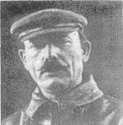
On Nov. 24, 1924 Chinese gens. Feng Yu-Hsiang and Chang Tso-lin stage another coup, making Gen. Tuan Ch'i-jui (1864-1936) pres. of China (until ?); meanwhile China having degenerated into the control of warlords Chang (Manchuria), Feng (the "Christian general", N of Peking), Lu, Wu, Yen, et al., Russian Communist Mikhail Borodin (1884-1951) assists Dr. Sun Yat-sen (who utters the soundbyte that the Chinese people don't have a nat. spirit but are "just a heap of loose sand") in organizing the Chinese Kuomintang Party in Canton based on his Three Principles: Nationalism, Democracy, Social Justice (Popular Livelihood) (take from the rich and give to the poor?); the military section is led by young Chinese officer Chiang Kai-shek (1887-1975), husband of Sun's sister-in-law; Russian Gen. Vasili Blucher becomes their military advisor (under the name Ga Lin) until 1928, then becomes cmdr. of Soviet military forces in E Siberia until 1938, when he is mysteriously dismissed and vanishes? On Nov. 26 the Mongolian People's Repub. is proclaimed, becoming the 2nd Communist country on Earth after the Soviet Union; the name of the capital city Urga is changed to Ulan Bator (Ulaan Baatar) ("red hero").

Let's get started now? On Apr. 12, 1927 after the dirs. of the Chinese Communist Internat. (based in Hangkow) decide (over the objections of the Kuomingtang, Mikhail Borodin, and Dr. Sun's widow) to take the logically necessary Communist step of moving from a petty burgeoise and peasant-controlled country to a dictatorship of the proletariat (them), the Kuomintang under Generalissimo Chiang Kai-shek (1887-1975) based in Nanking stage the Shanghai Massacre (April 12 Incident), capturing Shanghai and carrying out a purge of Communists in a few weeks; Mikhail Borodin is allowed to escape by car to the Soviet Union along with Sun Yat-sen's wife and Eugene Chen's sons, with Borodin uttering the soundbyte: "The revolution extends to the Yangzi River," Borodin told a reporter as they began their journey, and "if a diver were sent down to the bottom of this yellow stream he would rise again with an armful of shattered hopes"; the survivors retreat to the two central provinces of Kiangsi and Hunan, finding supporters in the villages, and warlords Chang and Feng remain in power in Manchuria and the province to the S.
In 1928 the Chinese capital is moved from Peking to Nanking and renamed Peiping, its name under the first three Ming emperors (until 1937); Chinese gen. Feng Yu-Hsiang becomes an official in Chiang Kai-shek's Communist govt., getting expelled and readmitted several times until 1933 for his views.
In Oct. 1934 the 100K-man 1st Front Red Army of Mao Tse-tung begins the 6K-mi. Long March (ends Oct. 1936) from their HQ of Juichin in Kiangsi through Kweichow and Szechwan to Yenan (Wuch'ichen) in Shenai, reading their mud-soaked Sun-Tzu all the way while losing 70K men, and making their HQ there for the next 10 years; a 2005 bio. of Mao claims he was carried on the march.
On Oct. 28, 1935 Japanese foreign minister Koki Hirota enunciates his Three Points regarding China: establishment of a Japan-China-Manchukuo bloc, suppression of anti-Japanese activities in China, and org. of a joint Chinese-Japanese front against Communism.

On Nov. 15, 1935 after Japanese efforts to create an autonomous N China collapse, the Japanese puppet-buffer state East Hebei Autonomous Anti-Communist Council is proclaimed in N China by collaborationist Yin Ju-Keng (1885-1947) (until July 1937), backed by Kwantung Gen. Kenji Doihara comprising 22 counties in Hopei Province, with capital at T'ungchow, leading to student demonstrations in Peking on Dec. 9.


In 1935 U.S. Gen. Joseph Warren "Vinegar" Stilwell (1883-1946) is sent to China as military attache (until 1939), with John Paton Davies Jr. (1908-99) as vice-consul; both liberal China Hands, they become prejudiced against the Chinese Nationalists in favor of the Commies, whom they view as democratic agrarian reformers?
In 1935 the Seventh (last) Comintern Congress of the Soviet Union orders Communist parties throughout the world to join the anti-Fascist parties.
On July 7, 1937 the Nagoya Pan-Pacific Peace Exposition is interrupted by the China (Lugou) (Marco Polo Bridge) Incident, a skirmish between Japanese and Chinese troops at the (Marco Polo Bridge in a Peking suburb (ends July 9), which sparks a Japanese invasion of China, taking Peking on July 29, and attempting to conquer China within 3 mo., going on to seize Tientsin, Shanghai, Nanking and Hangchow; too bad, the Chinese resist, and the invasion ends up dragging out eight years, with the loss of millions of Chinese lives; 300K-400K (40K to 300K?) Chinese are raped, tortured and killed in the 6-week Rape of Nanking (Nanjing) startng on Dec. 13; on Dec. 14 the Japanese change the name of the city back from Peiping to Peking, and make it the capital of Japanese-controlled North China; on Dec. 7, 2005 Japanese foreign minister Taro Aso (1940-) (tear a new asshole? the royal asshole?) finally urges his nation to show "deep remorse" for its actions? (ah, little goo-goo has finally worn himself out, and needs to change his diapies?); Chiang Kai-shek drops hostilities with the Chinese Communists and unites with them against the Japanese invaders; the Chinese govt. flees to Chungking; in-again out-again gen. Feng Yu-Hsiang is appointed CIC of the 3rd War Area against the Japanese - what country is known for its hog bristle brushes?
In July 1937 800 troops of the Kuomintang Chinese 29th Army under Gen. Song Zheyuan camp outside the walls of Tongzhou, making a secret deal with Yin Ju-keng and defeating the Japanese, after which East Hopei troops massacre the town's Japanese pop., ending the East Hebei Autonomous Council (begun Nov. 1935); Yin is captured by the Japanese and spared from execution after the intervention of Toyama Mitsuru, then allowed to return to Beijing and given a minor govt. post in Shanxi Province by the nationalist govt., then arrested by the Red Chinese and executed for treason in Nanjing on Dec. 1, 1947.
On Aug. 13, 1937 the Soviets forge Japanese invasion plans to announce the stationing of troops along the S and SE frontiers of Mongolia to support China in its war with Japan; on Aug. 24 Soviet deputy defense minister Pyotr Smirnov arrives to oversee the transfer of the Soviet 17th Army.

In 1940 the undeclared Japanese war on China causes the Kuomintang Nationalists and the Communists to table their civil war in favor of ousting the Japanese; the Communists have 800K members with a secure base in Yan'an in Shaanxi Province; the Kuomintang are based in Chongqing (Chungking) in Sichuan Province, and mess up by abusing the local pop. while the Communists offer them the moon, and found a univ. in Yan'an to breed anti-Japanese pro-Commie thinkers - facts are not neutral and whoever controls the schools controls the world? On Aug. 20, 1940 the Battle of a Hundred Regiments (ends Dec. 5) pits the Chinese People's Liberation Army under Gen. Peng Dehuai (1898-1974) in a series of assaults on strategic Japanese points in N China; the Japanese beat the Communists back after taking heavy casualties, retaliating against the local pop. On Sept. 23 the Japanese invade Lang Son Province in N Vietnam from S China, and occupy Indochina; the French flee, giving over their military installations to the invaders to avoid destruction of the country; on Sept. 27 a Communist-led anti-French rebellion begins in Bac Son in N Vietnam.

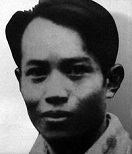
In May 1942 Mao Tse-tung calls the Yan'an Forum on Art and Literature to lay down the law on art and lit.; writer Ding Ling (1904-86) gets the raspberry for her bourgeois feminist mistake of singling out male Commies for mistreating women; in June the Yan'an Rectification Movement (ends 1944) drums slackers out of the burgeoning Chinese Communist Party, incl. Wang Shiwei (Sidao) (Shuhan) (1906-47) (executed in 1947), causing some to commit suicide?
On Aug. 11, 1945 the Soviet navy begins bombarding Sakhalin Island. On Aug. 12 the Soviets capture Hutou, Manchuria, pouring gasoline into the exhaust vents of the fortress and lighting it to smother the Japanese troops inside; on Aug. 19 (night) several hundred Japanese troops blow themselves up with grenades to avoid capture. On Aug. 12 (eve.) a Japanese sub sinks USS Oak Hill, and misses USS Thomas F. Nickel E of Okinawa. On Aug. 13 after the Japanese use kamikaze infantrymen against their tanks at Hualin, Manchuria, Soviet tanks fire on them while trying to disembark from their train, killing 900. On Aug. 14 (a.m.) 800+ U.S. bombers bomb Japanese military installations on Honshu Island; a Northrop P-61 Black Widow radar-equipped night fighter of the 548th Night Fight Squadron "Lady in the Dark" scores the last Allied air victory before VJ-Day. On Aug. 14 the Sino-Soviet Treaty of Friendship and Alliance is signed by the Repub. of China (nationalist Chinese) and Soviet Union, with China accepting the independence of Mongolia within its previous borders providing that the Soviets cease aiding the Chinese Communist Party and that a referendum be held; the two nations agree to joint control of the Chinese Eastern Railway in preparation of its return to full Chinese sovereignty; it is terminated by the Repub. of China on Feb. 24, 1953. On Aug. 14 the Soviets advance up to 250 mi. into Manchuria, occupying Mukden, and begin to occupy Sakhalin Island and the Kurile Islands.



On Aug. 19, 1945 after being saved by a U.S. unit while helping the Allies, Ho Chi Minh (1890-1969) seizes power, and on Sept. 22 establishes a provisional govt. in Hanoi; on Aug. 22 British aircraft drop Free French paratroopers in S Indochina; on Aug. 23 Emperor Bao Dai abdicates and goes into exile in Hong Kong and China, while the French under Gen. Jean-Etienne Valluy (1899-1970) attempt to reclaim Vietnam by force with an all-out attack on Hanoi, incl. house-to-house fighting, capturing it after killing 1K-20K incl. all the Vietminh snipers; on Sept. 2 Ho proclaims the Dem. Repub. of Vietnam, causing civil war to break out; meanwhile after issuing a Declaration of Independence (DOI) modelled after the U.S. version (which was given to him by Am. writer William Lederer in 1940) Ho's Letters to Truman (starting Feb. 16), citing George Washington and asking for help go unanswered - did he lose face? On Aug. 25 Baptist missionary to China and U.S. spy behind Japanese lines Capt. John Morrison Birch (b. 1918) is murdered near Soochow by the Chinese Communists at the orders of Stalin; in a 1953 bio. John Birch Society founder Robert Welch Jr. describes him as "the first uniformed casualty of WWIII", claiming the act was covered up by Stalinist agents in the U.S. govt. On Sept. 8 Operation Masterdom is launched by the French with British, Indian, and ex-POW Japanese troops led by French Col. Henri Cedile and British Maj. Gen. Sir Douglas David Gracey (1894-1964), becoming the first direct anti-Communist struggle after WWII; on Sept. 22 they overthrow the Communist govt. in Saigon, causing the Commies to regroup and counterattack, killing 100+.

In Jan. 1946 after a truce arranged by the U.S. is flouted, the Chinese Civil War breaks out between the Communists and the Nationalists (ends Jan. 1, 1949). On Feb. 9 Stalin announces a new 5-year plan for the Soviet Union, calling for production boosts of 50% - in false paperwork? On Feb. 22 the Long Telegram from Moscow by U.S. diplomat-historian George Frost Kennan (1904-2005), followed by the 1947 Foreign Affairs article The Sources of Soviet Conduct (The X Article) (under the alias "X"), portraying the Soviet Union as expansionist, and espousing the Containment Doctrine establish him as the principal architect of U.S. Cold War strategy; "It is clear that the United States cannot expect in the foreseeable future to enjoy political intimacy with the Soviet regime. It must continue to regard the Soviet Union as a rival, not a partner, in the political arena. It must continue to expect that Soviet policies will reflect no abstract love of peace and stability, no real faith in the possibility of a permanent happy coexistence of the Socialist and capitalist worlds, but rather a cautious, persistent pressure toward the disruption and, weakening of all rival influence and rival power" - keep the frost on to kennel 'em?
How did the U.S. get to the point of fighting George Washington? On Mar. 6, 1946 after Ho Chi Minh makes the mistake of trusting the French to help him oust 150K Nationalist Chinese who are raping and pillaging in the N, the Mar. Agreement sees France recognize Vietnam statehood within the Indo-Chinese Federation, with Ho Chi Minh as pres.; too bad, they soon renege, and on Dec. 28 they declare martial law, starting the First (French) Indochina War (ends May 7, 1954); meanwhile the history ignoramus Yanks blindly back the Frogs against the George Washington of Vietnam, known for reciting the U.S. Declaration of Independence to his people, who break out in cries of joy, giving the French $2B in aid, throwing Ho and his people into the arms of their ancient enemies the Chinese.
On Mar. 31, 1946 the Chinese Civil War (War of Liberation) begins (ends May 1, 1950), with the 1.2M-man Red Chinese army of Mao Tse-dung making their move to defeat the Kuomintang Nationalist Chinese of Chiang Kai-shek, with the Commies promising peasants land in exchange for military service, wiping out 1.12M nationalist troops while growing their army to 2M men. On July 17 the Chinese Communists start an offensive against the nationalists at the Yangtze River; on July 20 the nationalists launch an offensive in North China with 113 brigades (1.6M troops).

In Jan. 1948 Chinese "Christian General" Feng Yuxiang (Yu-Hsiang) (b. 1882) is kicked out of the Chinese Kuomintang after going to the U.S. on an official mission to study water conservation methods and issuing soundbytes that Chiang Kai-shek is more flagrant than the Communists in denying the principles of Sun Yat-sen; in Sept. he boards a Soviet vessel in the U.S. vowing to return to China and overthrow the nationalist govt., but dies on the Black Sea in a stateroom fire.



The Chinese Civil War ends with Mao painting the town Red? On Jan. 1, 1949 Peking (renamed Beijing next year) is taken by the People's Liberation Army without a fight, thanks to the work of Chinese Communist gen. Peng Zhen (1902-97); the Kuomintang collapses, ending the Chinese Civil War (begun Jan. 1946), and by Dec. Gen. Chiang Kai-shek flees with his 600K-man army to Taiwan, vowing to return one day; on Aug. 28 the U.S. State Dept. produces a White Paper on China, claiming that the U.S. had gone as far as an ally could go and that it's all Chiang Kai-shek's fault, becoming the last non-muddled report the U.S. State Dept. produces?; on Sept. 21 prosperous Chinese peasant's son Mao Tse-tung (Zedong) (1893-1976) proclaims the creation of the People's Repub. of China (PRC), with Zhou Enlai (1898-1976) as PM, finally adopting the Gregorian Calendar; on Oct. 1 Mao raises its very very red flag in a ceremony attended by umpteen zillions in Tiananmen Square (Chin. "Gate of Heavenly Peace") in C Beijing, who believe this to be the 2nd greatest event in human history after the 1917 Bolshevik Rev. as they throw off the humiliating yoke of imperialism and capitalism to become slaves of the state?; on Oct. 2 the Soviet Union formally recognizes the PRC; on Dec. 2 Chiang Kai-shek proclaims Taipei, Taiwan as the temporary capital of "real" China; as the years go by, Mao centralizes absolute power to himself, becoming a de facto emperor - the more China changes, the more it stays the same?
On Jan. 6, 1950 Britain recognizes the People's Repub. of China (Red China), causing the Repub. of China (Taiwan) to sever diplomatic relations; Israel follows suit on Jan. 9, and Finland on Jan. 13; in the U.S. the Repubs. blame the Dems. for "losing China", causing the latter to lose the 1952 U.S. pres. election.
On Jan. 31, 1950 the last Kuomintang troops in mainland China surrender; on Feb. 1 Gen. Chiang Kai-shek is reelected as pres. of the Repub. of China, and moves his govt. to Taipei, Taiwan on Mar. 1.

In Jan. 1950 the Repub.-controlled Saturday Evening Post pub. Why We Lost China, by Am. journalist (closet gay) Joseph Wright Alsop V (1910-89), which cements the conspiratorial mind-set of the Repub. Party by blaming the State Dept. for losing "our" China to Commies?; too bad that McCarthy comes along, goes off the deep end and finally pisses-off Alsop by going after his friend Dean Acheson?
On Feb. 14, 1950 Red China and the Soviet Union sign a 30-year Treaty of Friendship, Alliance and Mutal Assistance.

On June 25, 1950 North Korean forces (with permission from Stalin) cross the 38th parallel and invade South Korea, starting the Korean War (ends 1953); China assists the North, while U.N. troops, led by U.S. Gen. Douglas MacArthur (1880-1964) aid the South; on June 25 the U.N. Security Council is called by the U.S., and the Soviet delegate doesn't attend, making it possible for them to call for the withdrawal of the North Korean troops and a ceasefire; on June 27 the U.N. Security Council calls on U.N. members to assist South Korea and invokes military sanctions, causing Truman to order the U.S. Air Force and Navy into the Korean conflict, and orders the U.S. Seventh Fleet into the Straits of Formosa to block an invasion of China by Formosa (freeing the Chinese to build up forces to cross the Yalu River into North Korea later?); on June 28 Seoul is captured by the North Koreans; on June 30 the first U.S. ground forces are committed; on July 7 the Security Council authorizes a unified U.N. command in Korea under U.S. leadership, and the hastily-formed U.S. Eighth Army backed by 20 other U.N. members takes the North Koreans on; MiG Alley in the Yalu River Valley in NW Korea becomes the scene of a 10-1 kill ratio for U.S. planes; in the opening months of the war, the South Korean military and police execute 4.9K pro-Communist civilians who signed up for reeducation classes, and don't admit it until Nov. 2009 - do you know why we're here? To jack my price up?
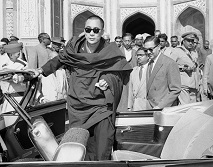
On Oct. 6, 1950 40K Chinese troops invade Tibet, starting the Battle of Chamdo, defeating the 8K-man Tibetan force and taking Chamdo on Oct. 19 after killing, wounding, or capturing 3,341, pissing-off the U.S. Britain, India and other countries; in Nov. the Tibetan nat. assembly holds an emergency session, requesting 16-y.-o. Tibetan Dalai Lama #14 (since Feb. 22, 1940) "His Holiness" Tenzin Gyatso (Lhamo Thondup) (1935-) to become head of state, which he does on Nov. 17 after the People's Repub. of Chna incorporates Tibet, appealing to the U.N. for aid, after which he flees Lhasa for Dromo near the Indian border; too bad, India objects to a U.N. Gen Assembly discussion, calling it a local problem for them and China.
On Feb. 1, 1951 U.N. Gen. Assembly Resolution 498 (44-7-9) condemns the aggression of Red China in Korea, exhorting it to pull its troops out, and exhorting U.N. member states to support U.N. troops in Korea, becoming the first time the U.N. treats a nation as an aggressor, passed after every resolution in the U.N. Security Council to take action is vetoed by the Soviet Union.
On Feb. 1, 1952 U.N. Gen. Assembly Resolution 505 is adopted 25-9-24 by the Sixth Session of the U.N. Gen. Assembly after the Repub. of China (Taiwan) complains, condemning the Soviet Union's violations of the Aug. 14, 1945 Sino-Soviet Treaty of Friendship and Alliance and the U.N. Charter by assisting the Chinese Communist Party duing the Chinese Civil War of Mar. 31, 1946 - May 1, 1950.
On Feb. 25, 1952 Japan and Nationalist China break off peace treaty negotiations over Chinese insistence that 1937 be acknowledged as the date when hostilities broke out rather than 1941, and Japan's refusal to recognize their sovereignty over Communist-held territory; on Apr. 28 a peace treaty is signed in which Japan renounces title to Taiwan, the Pescadores, and China.

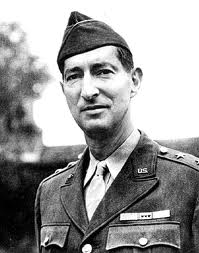
At the first sign of smoke someone is dialing 911? Millions die for a line drawn in the sand and some medals, like a sick chess tournament using real people as pieces? On July 27, 1953 (Mon.) after seven weeks of negotiation on behalf of the U.S. and U.N. by New York atty. Arthur Hobson Dean (1898-1987), the "forgotten" Korean War ends with an Armistice Agreement signed in Panmunjon near the 38th parallel by the U.S. North Korea, South Korea, and the People's Repub. of China (PRC), ending (suspending?) the Korean War (begun 1950) after 3 years 32 days; the U.N. Command, Military Armistice Commission, Korea (UNCMAC) composed of U.N. and Communist officers is established to supervise the truce, which incl. the creation of a 2.4-mi.-wide Korean Demilitarized Zone (DMZ) running 150 mi. between the two Koreas, where 1K plant species, 50 types of mammals (incl. the rare Asiatic black bear, Amur leopard and Siberian tiger) and hundreds of bird species, incl. two endangered cranes live; the Bridge of No Return is used for POW exchanges; total casualties: 800K soldiers killed and 1.6M wounded, plus 2M civilians killed and 2M-3M wounded; total South Korean casualties: 1,312,836, incl. 415,004 killed; U.N. casualties: 334,227, incl. 36,914 U.S. dead (36,576 official), and 103,284 wounded, 8,176 MIA, 7,245 POW, 131 Medals of Honor; Communist casualties: 1.5M-2M; and that's not counting the destruction of most of the peninsula, and the hundreds of thousands of families left homeless; the only war the U.S. enters in the 20th cent. that remains unresolved at the end of the cent. (until ?); U.S. Gen. Mark Wayne Clark (1896-1984) signs the armistice for the U.S., gaining "the unenviable distinction of being the first United States Army commander in history to sign an armistice without victory"; the Neutral Nations Supervisory Commission (NNSC), consisting of reps. from Sweden, Switzerland, Poland, and Czech. is created to investigate truce violations outside the DMZ; a top-level political conference between the Communists and U.N. is scheduled for "within 3 months" "to insure the peaceful settlement of the Korean question"; M/Sgt. Anthony B. "Tony" Herbert is the war's most decorated GI, and later gets into a war with the U.S. govt. over alleged atrocity coverups in the Vietnam War; Capt. Joseph "Joe Mac" McConnell is the top U.S. ace of the war, with 16 kills; the Communists lose 954 aircraft in the war, 827 of them MiG-15s, 792 of them downed by U.S. F-86 Sabres in MiG Alley S of the Yalu River, losing only 78 Sabres.
In Nov. 1953 Communist China cancels the North Korean war debt, and concludes a 10-year economic aid pact giving them $300M over four years.
On Feb. 26, 1954 U.S., British, Soviet, and French foreign ministers meeting in Berlin agree to sponsor a conference on Far Eastern affairs incl. the Korean question, and on Apr. 26 the Geneva Conference convenes (until June 15) to discuss what to do about Korea and Indochina, attended by reps. of 19 states (the Soviet Union and all South Korean war belligerents except South Africa); on June 15 after the Communists demand that a neutral-nation commission supervise Korean elections rather than the U.N., the U.N. delegation walks out; on July 21 (3:42 p.m.) a truce is signed bringing an end to the 8-y.-o. Indochina War.
On Sept. 3, 1954 the First Taiwan Strait (Formosa) (Offshore Islands) Crisis begins when Chinese Communists shell the small Quemoy Islands and the Matsu Islands, located a couple of miles off the Chinese coast 150 mi. apart which are garrisoned by Nationalist troops; hawks urge Pres. Eisenhower to bomb China in retaliation, but he refuses and in Dec. signs a mutual defense treaty with Chiang Kai-shek in which he agrees to stop harassing the mainland and the U.S. agrees to protect Formosa, but not the coastal islands; next May 1 after the Soviets blink, the Chinese Communists temporarily cease shelling Kinmen and Matsu.

On Oct. 12, 1954 Japanese acting PM Taketora Ogata (1888-1956) rejects an offer of normalized relations from Communist China, calling it "bait" aimed at weakening U.S.-Japanese ties; Ogata dies on Jan. 28, 1956 before he can become PM.
On Dec. 2, 1954 the U.S. and Nationalist China (Taiwan) sign the Sino-Am. Mutual Defense Treaty, to come into force next Mar. 3; in 1979 Pres. Carter unilaterally terminates it.

You can't fake steak? In 1954 British scientist-historian Noel Joseph Terence Montgomery Needham (1900-95) begins pub. Science and Civilisation in China (27 vols.) (1954-2015), which tries to explain Needham's Grand Question, why China stagnated in science and technology and allowed the Western barbarians to pass them up; too bad, he bends over backwards to cover for the Chinese POV?
The Chinese try to bait the U.S. by giving it a pescadillo, and Ike gets a new power for the presidency to get the U.S. into all kinds of trouble worldwide? On Jan. 18, 1955 after Pres. Eisenhower informs the Chinese that any attack on the Pescadores (64 islets 30 mi. from Formosa in the Taiwan Strait) would be interpreted as a planned invasion of Formosa and resisted by the U.S. Seventh Fleet, the Chinese Communists occupy tiny Yikiang, one of the Dachen (Tachen) Islands 200 mi. N of Formosa while increasing their attacks on Quemoy and Matsu (all 5-10 mi. away from the mainland); on Jan. 20 the Red Chinese conquer the Yijiangshan Island, after which Jan. 24 Pres. Eisenhower addresses Congress, asking for authorization to use U.S. armed forces in the defense of Formosa and the Pescadores (deliberately avoiding mention of Quemoy and Matsu), but on his call not theirs; the Senate passes the Formosa Resolution of 1955 by 85-3 and the House by 410-3, and Ike signs it on Jan. 29; Adlai Stevenson observes that Congress has given the pres. a "blank check", which one day might be cashed without consulting them again, which proves true in Vietnam; in Feb. 1955 the U.S. Seventh Fleet evacuates 14K Chinese Nationalist troops and 14.5K civilians from the Dachen Islands, defusing the Formosa situation and making the Jan. resolution of Congress unnecessary.

In Apr. 5, 1955 the first legislative elections in Singapore give a V to the left-wing Labour Front, led by "never lose" defense atty. David Saul Marshall (1908-95), a Sephardic Jew of Iraqi ancestry, who on Apr. 6 becomes the first chief minister of Singapore (until June 7, 1956); on May 10-12 the Hock Lee Bus Co. Riots turn into a fight for independence and lead to Black Thursday on May 12, where 2K protesters tangle with police, killing two of them before the violence is stopped by the next morning, with two non-cops killed and 31 injured; Marshall claims "The pattern of action of the demonstrators conform to Communist techniques."

Speaking of Monkey? Which Old Witch, the Wicked Witch? On Feb. 14, 1956 the 20th All-Union Communist Party Congress opens; on Feb. 25 Soviet joy-to-the-world-not Communist Party head St. Nicholas, er, Nikita Khrushchev (1894-1971) gives his Secret Speech to the 20th Congress of the CPUSA titled "On the Cult of Personality and Its Consequences", condemning his predecessor Stalin for fostering the "cult of the individual" and one-man rule, the "use of mass terror", making "mass arrests and deportations of many thousands of people, execution without trial and without normal investigation", and charging him with bungling WWII, causing the rupture with Yugoslavia, and with jeopardizing "peaceful relations with other nations"; the full text of the speech isn't pub. until 1989; Khrushy lightens up and declares the new goal of Soviet foreign policy to be coexistence, and permits a relative increase in personal freedom, which backfires, causing immediate anti-Soviet revolts in Berlin and Budapest, followed by brutal crackdowns which consolidate his power, allowing him to grab for internat. power, proving it was all a brilliant gamble?; the congress adopts its 6th Five-Year Plan, then adjourns on Feb. 25; the Secret Speech causes many Brits to abandon the Communist Party of Great Britain and join the Labour Party or various Trotskyist groups, causing the birth of the New Left in the 1960s; Red China and Russia begin to split over Communist policies toward the West, but it is not made public until Apr. 16, 1960, and in 1961 the Communist Party of China denounces the Soviet Communist Party as "revisionist traitors", competing for ideological leadership; the split ends in ?; meanwhile in 1959 Mao Zedong (Tse-Tung) officially gives up his title as chmn. of the People's Repub. of China.
In Mar. 1956 the Chinese Communists step up their shelling of Quemoy and Matsu, causing Pres. Eisenhower to respond with a statement that tactical atomic weapons are no different from other weapons in a strictly military situation; by May the shelling stops, and Eisenhower becomes Alexander the Great to a gleeful Congress.

In Apr. 1956 after returning from a failed mission to London to negotiate independence, David Saul Marshall resigns, uttering the soundbyte "I have failed in my Merdeka [independence] mission", and Lim Yew Hock (1914-84) becomes chief minister #2 of Singapore (until 1959), going on to suppress anti-colonials and Communists to impress the Brits that they can kiss them and call them sweetheart and allow them to rule themselves.

On May 13, 1956 Am. psychic Jeane L. Dixon (Lydia Emma Pinckert) (1904-97) pub. an article in Parade Mag. that claims that the 1960 U.S. pres. election will be "dominated by labor and won by a Democrat", and that a U.S. pres. (not necessarily the new one) would "be assassinated or die in office though not necessarily in his first term"; too bad, she also predicts that Nixon will defeat JFK, that the Soviets would put the first man on the Moon, that labor union head Walter Reuther will run for U.S. pres. in 1964, and that the Quemoy-Matsu dispute will start WWIII in 1958; the way she convinces true believers of her powers despite the wishy-washy, hazy, coincidence-laced predictions and tons of misfires becomes known as the Jeane Dixon Effect. On May 14 the Soviet gov. announces a reduction in their armed forces by 1.2M men by May 1, 1957.
In 1956 Nepal and Red China settle their differences, and Nepal begins accepting economic aid from them as well as the U.S. and Soviet Union.
On Feb. 27, 1957 Mao pub. the speech "On the Correct Handling of the Contradictions Among the People", launching the Hundred Flowers Campaign (Movement), based on his statement "The policy of letting a hundred flowers bloom and a hundred schools of thought contend is designed to promote the flourishing of the arts and the progress of science", encouraging intellectuals to freely express their opinions on their Communist regime, which turns out to be a trap to get liberals to expose themselves so that Mao can launch his Anti-Rightist Campaign in July, persecuting 550K by 1959.
On July 16, 1957 Japan announces an easing of trade restrictions with Communist China.
On Sept. 19, 1957 Ceylon and Communist China conclude a 5-year trade pact.
In 1958 Red China begins its Second Five-Year Plan AKA Great Leap Forward (ends 1962), a disastrous attempt by Chairman. Mao to turn China from an agrarian capitalist farmer economy into a Communist collective farm economy run by people's communes, resulting in vast inefficiencies covered-up with false progress reports while famine kills 15M-55M, becoming the largest famine in human history (until ?).
On July 31-Aug. 3, 1958 Khrushchev visits Beijing, and is given a lukewarm reception by Mao, then invited to his private residence known as the Zonghanhai on Aug. 3, and made to join him in a swimming pool, knowing that K-baby can't swim, causing him to don big green trunks and water wings and dog-paddle while Mao swims circles around him lecturing him like an emperor does a peasant, er, cementing the Sino-Soviet aplit - take your shoes off before going inside? On July 31-Aug. 3, 1958 Khrushchev visits Beijing, and encourages them to take Quemoy and Matsu Islands, then writes a letter to Pres. Eisenhower warning that any U.S. attack on Red China would be viewed as an attack on the Soviet Union; on Aug. 23 the Second Taiwan Strait (Formosa) (Offshore Islands) Crisis begins when the Great Leaping Chinese PRC resumes massive bombardment of Quemoy and Matsu Islands and threatens invasion, blocking the islands against Nationalist Chinese resupply efforts and waging a propaganda campaign against the U.S., threatening U.S. ships and promising the "liberation" of Taiwan; this doesn't stop Ike from sending a large naval force to the Taiwan Straits to escort the Nationalist ships, while U.S. secy. of state John Foster Dulles tells the Commies that the U.S. will take "timely and effective action" to defend Taiwan, meaning a U.S. plan to nuke China; once they get over the shock, on Sept. 6 Zhou Enlou proposes a resumption of diplomatic talks with the U.S, and on Oct. 6 defense minister Peng Dehuai announces suspension of the bombardment for 1 week while making diplomatic overtures to the nationalists, resulting in a ceasefire on Sept. 22; meanwhile the Soviets abrogate their 1957 agreement to supply the PRC with nukes, and the whole affair convinces the Commie Chinese that they are pawns of the nuked-up U.S. and Soviet Union and have to develop their own nukes to change the rules in the future.
Great leaping lizards in Maoland? In 1958 in Red China never-wrong Chmn. Mao begins the disastrous Great Leap Forward, attempting to industrialize the villages and establish rural communes using Communist strong-arm tactics; too bad, the effort fails, causing him to lose face - just don't tell him to his face?
In 1958 Mao launches the Four Pests (Great Sparrow) Campaign (ends 1962) as one of the first actions of his Great Leap Forward, calling for the extermination of sparrows, flies, mosquitoes, and rats, only to find that elimination of sparrows upsets the ecological balance, causing him to switch to bedbugs.
In 1959 the Great Chinese Famine begins after massive crop failures and floods, killing 15M-30M by 1961 - no homes, no land, no TVs, no gin?

On Mar. 10, 1959 the 1959 Tibetan Uprising (Rebellion) sees a revolt erupt in Lhasa, causing the Red Chinese army to move in on Mar. 12 and order 24-y.-o. Tibetan Dalai Lama #14 (1940-) "His Holiness" Tenzin Gyatso (Lhamo Thondup) (1935-) to report to their military camp in Lhasa, pissing-off Tibetan Buddhists, who on Mar. 17 stage a march of 5K Tibetan women carrying banners reading "Tibet for Tibetans", presenting an appeal at the Indian consulate; on Mar. 17 Chinese troops fire two mortar shells at the Dalai Lama's Potala Palace, and six hours later under cover of darkness he sneaks out wearing a soldier's uniform carrying a gun, and flees Tibet for N India through a pass in the Himlayas, arriving on Mar. 31; on Mar. 18 protests in Lhasa lead to violence, after which the Chinese conquer Tibet in Mar., killing 57K by the end of the year; in India the Dalai Lama espouses the "Middle Way", a policy of peacefully working with China for autonomy rather than independence; too bad, China closes Tibet off from the world for the next quarter of a cent., instituting a genocide that kills 15% of the pop., importing masses of Chinese to displace the Tibetans and destroying all traces of Tibetan culture incl. art, writings, and 6K monasteries, while making any resistance or even ownership of a photo of the Dalai Lama a crime; the CIA supports Tibetan freedom fighters until Nixon's 1972 visit to China, then cuts them loose; the Dalai Lama is later discovered to be on the payroll of the CIA.

On Apr. 27, 1959 Chinese Civil War hero Liu Shaoqi (1898-1969) becomes chmn. #2 of the People's Repub. of China (until Oct. 31, 1968), and Mao loses influence to him, as well as PM Zhou Enlai and party secy. Deng Xiaoping.

On Sept. 17, 1959 after calling the Great Leap Forward a disaster, Peng Duhua is replaced as defense minister by marshal (hero of the Chinese Civil War) Lin Biao (Piao) (Yurong) (1907-71) (until Sept. 13, 1971).
In Sept. 1959 Castro recognizes Red China, renounces Cuba's 1952 military pact with the U.S., and calls the U.S. a "vulture... feeding on humanity"; Havana underground cmdr. Manuel Ray, pres. Manuel Urrutia and PM Jose Mio Cardona, along with other heroes of the 26th of July (1953) movement are either jailed or flee to Fla., creating a "cane curtain"; Oriente province manager Dr. Manuel Francisco Artime escapes dressed as a priest, smuggled out in a Honduran freighter by the CIA, who organizes the young exiles into La Brigada and the old exiles into El Frente in hopes of ousting Castro, but the fighting force never exceeds 1.2K, although Castro believes there are 20K; to fool him the serial numbers begin with 2500, and later the brigade calls itself 2506 after recruit #6 dies in training.
On Oct. 3, 1959 Egyptian ministers accuse the Chinese of deliberately delaying cables that they were sending to their embassy in Beijing.
On Oct. 11, 1959 Chiang Kai-shek predicts an uprising in China that will give him a V in 1960.
On Oct. 23, 1959 India announces that Red Chinese troops have clashed with Indian troops in Kashmir; on Oct. 26 Indian border police clash with Chinese troops in Ladakh; on Oct. 24 Chinese PM Zhou Enlai first uses the phrase "Line of Actual Control" in a letter to Indian PM Jawaharlal Nehru.
On Dec. 4, 1959 Beijing pardons Aisingyoro Henry Puyi (1906-67), the puny ass last emperor of China (1908-12) and of the Japanese puppet state of Manchukuo; he settles down as a gardener.
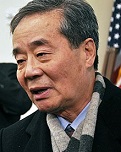
In 1960 after criticizing the Soviet invasion of Hungary, Shanghai-born Harry Wu (1937-2016) is arrested as a counterrevolutionary rightist and given a life sentence in the Chinese Laogai forced labor camps, then released in 1979, going to the U.S. in 1985 and becoming a U.S. citizen; in 1992 he founds the Laogai Research Foundation in Washington, D.C. to expose China's Laogai forced-labor prison camps; on Aug. 24, 1995 after being arrested as he tries to enter, China arrests him then convicts him of espionage and sentences him to 15 years in prison, then immediately deports him to the U.S. after an internat. campaign.
In 1960 dinosaur fossils are found in Zhucheng in Shandong Province in E China, which climbs to 7.6K fossils in 2008, making it the richest dino fossil site on Earth.
In 1961 the famine in China (begun 1959) ends, causing a baby boom.
On Oct. 23, 1961 the Taiwan Stock Exchange Corp. is founded.
On Dec. 15, 1961 after lobbying by Austalia, Colombia, Italy, Japan, and the U.S., U.N. Gen. Assembly Resolution 1668 is adopted by a 61-34-7 vote, deeming the issue of China representation at the U.N. so important that any proposal to change the designated representation of China will require a two-thirds majority vote.
On Jan. 13, 1962 Albania allies with the People's Repub. of China.
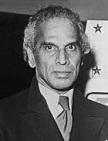
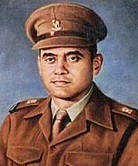
In June 1962 after Indian troops cross in Oct. 1959 in order to establish posts on the Lanak Pass, a border war erupts between China and India in the Kongka La (Pass) low ridge pass in the Himalayas (Aksai Chin in China, Ladakh in India), leading to a battle on Sept. 21, followed on Oct. 20 by the Sino-Indian Border Conflict (War) (1st Indo-China War) as Chinese Communist forces invade India, causing Indian pres. Nehru to ask for U.S. military aid on Oct. 29, then dismiss defense minister V.K. (Vengalil Krishnan) Krishna Menon (1896-1974) on Oct. 31 and assume his post; too bad, the U.S. and U.K. refuse to sell India advanced weaponry, forcing them to turn to the Soviet Union, who supply them with advanced MiG fighters, which they never deploy; on Nov. 18 the Battle of Rezang La 11 mi. of the Spanggur Gap that divides China and India sees the Indian 13 Kumaon Regiment led by Maj. Shaitan Singh (b. 1924) make their last stand, with 114 of 120 Indian soldiers KIA vs. 1.3K Chinese soldiers; Sing is posth. awarded the Param Vir Chakra, India's highest millitary decoration;on Nov. 19 as Indian troops retreat from a massive Chinese attack, Nehru asks JFK for further military aid, and on Nov. 21 the U.S. sends transport planes with U.S. crews, causing China to unexpectedly order a ceasefire along the Indian border on Nov. 21 and offer to withdraw its troops back of the "lines of actual control" existing on Nov. 7, 1959; on Dec. 14 after Nehru rejects the Chinese offers, India announces that the Chinese are beginning a massive troop withdrawal from the NE frontier region, after which neither country patrols this part of the border.

On Aug. 15, 1962 22-y.-o. Chinese soldier Lei Feng (b. 1940) dies after a telephone pole falls on him, and is seized on by the Chinese Communist Party as the ideal soldier and model citizen (until ?).
On Jan. 27, 1962 France agrees to establish diplomatic relations with the Communist People's Repub. of China (PRC), and on Jan. 28 denies that this implies a disruption of relations with Taiwan (Repub. of China); on Feb. 4 France also denies that it implies recognition of East Germany; on Feb. 11 Taiwan drops diplomatic relations with France.
In 1962 Deng Xiao Ping utters the immortal soundbyte: "It doesn't matter whether the cat is black or white as long as it catches mice."
On Mar. 2, 1963 Pakistan and Communist China sign an agreement defining their disputed 300-mi. frontier between China's Sinkian Province and Kashmir, with China ceding 1,942 sq. km. (750 sq. mi.) of territory to Pakistan, which recognizes Chinese sovereignty over hundreds of sq. km. of land in N Kashmir and Ladakh; India refuses to recognize it; the agreement loosens ties between the U.S. and Pakistan; on Aug. 29 a treaty is signed providing scheduled air service between China and Pakistan, making Pakistan the first Western-oriented nation with such a treaty.
On Mar. 13,, 1963 after warning him that his attacks are reopening old territorial disputes, China invites Nikita Khrushchev to visit Beijing to discuss ideological differences, but Big K refuses, asking Mao to visit him in Moscow instead; meanwhile the Soviet Union scraps its latest 7-Year Plan as out of step with the time, and draws up a new 2-Year Plan; on Apr. 21 Moscow and Beijing sign a trade agreement, with Big K saying about Mao that "His chauvinism and arrogance sent a shiver up my spine."
On May 5, 1963 Communist Chinese pres. Liu Shao-qi signs a declaration of friendship with Norodom Sihanouk of Cambodia.
On May 17, 1963 Communist Chinese pres. Liu Shao-qi praises Stalin as an antidote to the "revisionist" doctrines of Khrushchev.
On May 21, 1963 India requests $1.5B in military aid over three years from the U.S. and Britain to meet the threat from go-ahead-make-my-day Communist China.
On June 3, 1963 it is revealed that the Chinese Commies are using the racial troubles in Birmingham, Ala. to recruit non-whites to its brand of Communism and woo them away from the Soviet "peaceful coexistence" policy; meanwhile Ala. gov. George C. Wallace appears on a TV program at the RCA Bldg. in the Rockefeller Center in New York City under heavy police security; on June 4 it is revealed that African students in Moscow are complaining of racial discrimination also.
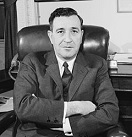
On July 26, 1963 JFK gives a radio-TV address announcing the Limited Nuclear Test Ban Treaty, drafted by MIT engineer Jerome "Bert" Wiesner (1915-94) (chmn. of the President's Science Advisory Committee since Feb. 1961), which is signed in Moscow on Aug. 6 by the U.S., U.K., and Soviet Union after eight years of negotiations, banning above-ground nuclear testing, also underwater and in outer space; too bad, on July 29 Charles de Gaulle announces that France will not sign it; with the help of a public campaign, JFK prevails on the Senate to ratify it; within a few mo. 100+ other govts. also sign it except France and the People's Repub. of China; meanwhile JFK engages in secret negotiations with Cuba seeking an accommodation.

On Aug. 15, 1963 a military coup overthrows Fulbert Youlou, and he is succeeded by Alphonse Massamba-Debat (Massamba-Débat) (1921-77) as pres. #2 of the Repub. of the Congo (Brazzaville) (until Sept. 4, 1968), who rules a 1-party state; too bad, he goes Marxist, causing Red China, the Soviet Union, and Cuba to come knocking seeking influence, while France retains its role as trade partner with private enterprise continuing.
On Oct. 21, 1963 the U.S. votes against admitting Communist China to the U.N.
On Nov. 21, 1963 India launches its first rocket from Thumba in Kerala state in S India, a U.S.-made 2-stage Nike-Apache sounding rocket, and founds the Vikram Sarabhai Space Center in Trivandrum, Kerala; by 2010 they launch 2.2K rockets from the center after getting into a space race with Red China in the 20-zeds.
In 1963 a Marxist coup takes place in the People's Repub. of the Congo (Brazzaville), causing China and the Soviet Union to come knocking seeking influence, while France retains its role as trade partner with private enterprise continuing.
In 1963 the Harbin Intenat. Ice and Snow Sculpture Festival is founded in Harbin, Heilongjiang, China, becoming the largest in the world, featuring enormous snow sculptures on Sun Island.
On Jan. 28, 1964 France and the Soviet Union agree to negotiate a 5-year trade agreement to increase trade, pissing-off the Communist Chinese.
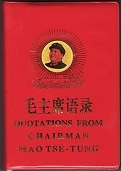
In Jan. 1964 the new Chinese Jehovah Mao pub. his atheist Bible, the "Little Red Book" Quotations from Chairman Mao Tse-tung, which immediately becomes required reading for good (live) Chinese Communists and Western leftists, and is full of soundbytes, e.g., "Political power grows out of the barrel of a gun", and "Communism is not love, it is a tool with which we crush the enemy", and promotes the term "political correctness" (PC) to describe the "correct" party line, which ends up getting eagerly adopted by the Western left.
On Oct. 16, 1964 China explodes its first A-bomb in Lop Nor (Nur), a lake in the Gobi Desert, and becomes nuclear nation #5 (U.S., Soviet Union, Britain, France), and the first Asian country with nukes; China now has some muscle to challenge Russia for leadership of the Communist bloc of nations; Indonesia announces its intent to pursue a nuclear weapons program - the U.S. hope of winning in Vietnam dies right here?


Sukarno no, Suharto go? On Jan. 2, 1965 after getting pissed-off at the seating of its neighbor enemy Malaysia on the U.N. Security Council, Indonesia becomes the first nation to withdraw from the U.N. (resuming membership next year after a peace agreement), and on Mar. 19 it nationalizes all foreign oil cos.; on Sept. 30-Oct. 1 a coup by junior military officers in Jakarta kills six generals, and is crushed by Pres. Sukarno, after which Java-born Muslim Gen. Suharto (Soeharto) (1921-2008) stages a military coup against Sukarno, becoming pres. #2 of Indonesia on Mar. 12, 1967 (until May 21, 1998); on Oct. 20 Suharto begins mass arrests of Communists after blaming them for the coup, outlawing the Communist Party then massacring 400K-3M peasants, workers, students, and activists by next year, with the CIA furnishing 5K names of Communist leaders, while using his Golkar Party (founded Oct. 20, 1964) to rule with an iron hand, proclaiming the New Order (ends 1998), banning celebration of the Chinese New Year and other Chinese culture in an effort to force assimilation of mainly rich Chinese Indonesians (5% of the pop.); Indonesian leftist writer Pramoedya Ananta Toer (1925-2006), known for being sympathetic to the Indonesian Chinese is imprisoned on Buru Island without charges until 1979, then kept under house arrest until 1992; in 1979 his 4-part novel Buru Quartet is pub., getting banned by the govt. and making him a poster boy for human rights and free speech advocates; the 1983 Mel Gibson film "The Year of Living Dangerously" is set in the 1965 Indonesian civil war.
On June 26, 1965 Chairman Mao issues the immortal soundbyte: "The more books you read, the more stupid you become" - he sure hasn't read many?




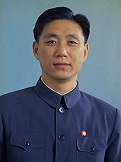
On Nov. 10, 1965 Chinese Gang of Four member Yao Wenyuan (1931-2005) pub. the 10K-word "On the Historical Beijing Opera 'Hai Rui Dismissed from Office'" in the Shanghai Daily, dissing a popular opera by Beijing deputy mayor Wu Han as being a veiled attack on Mao for his 1959 dismissal of defense minister Peng Dehau, launching the Chinese (Great Proletarian) Cultural Rev. (ends 1976) after the Beijing party apparatus tries to protect Wu Han and Mao decides to make an example of them and get rid of them and every other potential enemy in China; the other Gang of Four members are Mao's 3rd and last wife Jiang Qing (1914-91), Zhang Chunqiao (1917-2005), and Wang Hongweng (1935-92), all of whom are low-ranking members of the Chinese Communist Party but personally favored by Mao, allowing them to outmaneuver party moderates incl. Deng Xiaoing and take China down the Red roller coaster; after Mao dies, the Gang of Four is arrested on Oct. 6, 1976, and the Cultural Rev. shoved up their butts?
In 1966 Chinese Year: Horse (Jan. 21) (2nd luckiest year after Dragon); it's actually Fiery Horse, causing the birthrate in Japan to drop from 19.3 to 14 per thousand from fear that girls born this year will grow up to destroy their husbands, rebounding next year, then bottoming out at 13.66 in 1980; meanwhile the Cultural Rev. causes the nat. birth control campaign to slide, resulting in Chinese birthrates of 38-43 per thousand.
In 1965 the Chinese govt. builds a smelting factory for lead and antimony in Pingyang (near Nan Ning), discarding waste in dumps that allow the metals to wash into fields and ponds, poisoning villagers until it is torn down in 2004.



It's not your father's Olds? The bullet and the big character poster is stronger than the ballot in Red China? On Feb. 12, 1966 the Group of Five, led by Beijing mayor (since 1951) Peng Zhen (1902-97) pub. the Feb. Outline, trying to diffuse the issue of the "Hai Rui Dismissed from Office" brouhaha, causing Gang of Four members Jiang Qing and Yao Wenyuan to fire back with articles denouncing them; on May 16 Chairman Mao pub. the Notification, criticizing Peng Zhen and disbanding the Group of Five, launching the Great Proletarian Cultural Rev. (ends 1976) against the liberal bourgeoisie elements in the Communist Party, ramping up his personality cult and touting him as "a genius, everything the Chairman says is truly great, one of his words will override the meaning of tens of thousands of ours"; on May 25 female Beijing U. philosophy prof. Nie Yuanzi (1921-) pub. the first dazibao (big character poster), calling the rector and other profs. at her univ. "black anti-Party gangsters", which Mao orders to be broadcast nationwide; on May 26 the first youth group of Red Guards is formed at Tsinghua U. to kick their elders' bourgeois butts for Mao; on June 1 the People's Daily calls for the purging of all imperialists, imperialistic intellectuals, or people with imperialist affiliations, after which the Red Guards write a formal letter to Mao on July 28 asking for official approval of mass purges, which he responds to with the epic article Bombard the Headquarters; on Aug. 8 the Chinese Communist Central Committee approves the 16 Points of the Cultural Rev. to "struggle against and crush those persons in authority who are taking the capitalist road", calling on all workers to "transform the superstructure" by writing big character posters and holding great debates, fighting the Four Olds (Old Customs, Old Culture, Old Habits, Old Ideas), pretending to grant unprecedented freedom of speech as long as it rubberstamps Mao; on Aug. 16 11M Red Guards gather in Beijing, where Mao warmly receives them on top of the Tiananmen Square gate; the terror campaign destroys all religious bldgs. and tortures and/or kills everybody with any kind of Western education or an IQ higher than a rice doughnut, with Mao on Aug. 22 issuing an order preventing police intervention in Red Guard actions while uttering the soundbyte "Hitler was even more ferocious. The more ferocious the better, don't you think? The more people you kill, the more revolutionary you are"; in Aug.-Sept. 1,772 are murdered in Beijing; in Sept. 534 are killed and 704 commit suicide; on Sept. 5 Mao invites all Red Guards to visit Beijing at govt. expense; on Oct. 10 Mao's puppet gen. Lin Biao (1907-71) publicly criticizes Deng Xiaoping and Liu Shaoqi, and Deng is sent to a reeducation camp 3x until being rescued by Zhou Enlai; by the end of the Cultural Rev. 1M+ are killed or driven to suicide; the Red Guards close medical schools and dump Western-trained physicians in favor of "barefoot doctors" peddling Chinese herbs.
On Apr. 18, 1966 China announces that it's ending economic aid to Indonesia, after which on May 15 Indonesia flip-flops and asks Malaysia for peace negotiations, which are concluded on May 28, after which a treaty is signed on Aug. 11.
On Aug. 30, 1966 Hanoi announces that Red China will provide it with economic and technical assistance.
On Jan. 3, 1967 Chinese Gang of Four member Jiang Qing and Mao's man Lin Biao launch the Jan. Storm, a purge of municipal govt. leaders in Shanghai, which ends up in purges of every local govt. in China after Mao calls on all to rise in self-criticism, or criticism and purging of others; in Feb. the Gang of Four extends the purges to the military, and on July 22 Jiang Qing orders the Red Guards to displace the People's Liberation Army, causing them to loot military armories (until fall 1968).
On June 17, 1967 Red China announces its first explosion of an H-bomb, codenamed Test No. 6 in Lop Nor, with a yield of 3.3 megatons - it's truly Red China now?
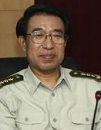

On July 20, 1967 after efforts are made to get the Red Guards to return home and go back to school, the Wuhan (July 20th) Incident sees the 500K-person Million Heroes attack the radical 500K-person Wuhan Workers Gen. HQ and capture party leader and party mag. Red Flag ed. Wang Li (Guangbin) (1922-96), after which they are viciously exterminated by orders of Chmn. Mao; a speech given by Wang Li on Aug. 7 to the Red Guards in China leads to their violent takeover of the Foreign Ministry bldg., followed by weeks of rampaging over foreign diplomats and their envoys; after being purged by Mao, Wang Li is jailed for inciting the Red Guards; Chinese military superstar and former vice-PM Peng Dehuai (1898-1974), who in 1964 was put in charge of the Third Front strategic fallback base in SW China is arrested by the Cultural Rev. and penged, er, beaten 130 times by the Red Guard until his internal organs are crushed and his back splintered, shouting dehuaials, er, denials and pounding the table so hard the cell walls shake, ending up dying of cancer in priz without recanting his independent views.
On Oct. 10, 1967 after being ratified on May 19 by the Soviet Union, the Treaty of Principles Governing the Activities of States in the Exploration and Use of Outer Space, including the Moon and Other Celestial Bodies AKA the Outer Space Treaty (signed on Jan. 27 by the U.S., U.K., and Soviet Union) enters into force; by July 2017 107 countries incl. the Repub. of China (Taiwan) are party to the treaty, and another 23 have signed but not completed ratification.
On Feb. 29, 1968 Romania walks out of a Communist Party conference in Budapest in a dispute over Communist China.
On Dec. 27, 1968 Communist China explodes its 2nd 3MT H-bomb, an improved device using plutonium in the primary.
On Mar. 2, 1969 large numbers of Soviet and Chinese troops battle along their border on the Ussuri River, provoking demonstrations in Beijing and Moscow; in Mar. Soviet troops near Damansky Island are ambushed by the Chinese, causing the Soviets to start reinforcing their border with more guards; border clashes along the Ussuri River end in both sides agreeing to high level talks in Beijing in Oct.

On Apr. 14, 1969 the Ninth Congress of the Chinese Communist Party (first since 1958) convenes, and adopts a new 1969 Chinese Constitution, ousting pres. (since 1959) Liu Shaoqi, and naming defense minister Lin Biao (Piao) (Yurong) (1907-71) as Mao's successor; too bad, he is killed during a coup, or while Mao is staging a coup on him - ask Mao Piao?
On July 26, 1969 (6:49 a.m. local time) the 6.4 1969 Yangjiang Earthquake in E China kills 3K, collapses 10.7K houses, and damages 36K houses.
On Aug. 13, 1969 serious border clashes occur between the Soviet Union and the People's Repub. of China.





On Sept. 1, 1969 the last U.S. troops leave the Mekong Delta, leaving the South Vietnamese army to fu, er, fend for itself. On Sept. 3 Ho Chi Minh (b. 1890) dies in Hanoi from a heart attack after 15 years as North Vietnamese pres., and on Sept. 24 nat. assembly vice-pres. Ton Duc Thang (1888-1980) succeeds him as pres. #2 (last) of the Dem. Repub. of Vietnam (until July 2, 1976); Indochina Communist Party founding member (1930) Le Duan (1907-86) (#2 behind Ho since 1958 and driving force behind the Vietnam War), gen. secy. of the Vietnam Communist Party since Sept. 10, 1960 forms a triumvirate with Truong Chinh (1907-88) (Chin. "long march") and PM (1955-87) Pham Van Dong (1906-2000); Alexei Kosygin meets at Beijing (Peking) Airport with Zhou Enlai (Chou En-lai) en route home from Ho Chi Minh's funeral in Hanoi, and they discuss Sino-Soviet border clashes earlier in the year in E and C Asia.
In 1970 the U.N. estimates world pop. at 3.6B (vs. 3B in 1960), increasing by 1.4M per week; People's Repub. of China: 760M; India: 550M; Soviet Union: 243M; East Asia incl. Japan: 930M; South Asia: 1.13B; Europe: 462M; Africa: 344M; Latin Am.: 283M; North Am.: 228M; Oceania: 19M. Pop. densities: China 305 per sq. mi; India 655; Japan 1,083. In the 1970s Chinese fertility rates drop from 5.9 to 2.1 children per woman.
On Jan. 5, 1970 (1:00:41 local time) the 7.1 1970 Tonghai Earthquake in Yunnan Province, China kills 10K-15.6K and injures 26.7K, and is covered up by authorities in the throes of the Cultural Rev.
On Jan. 20, 1970 China and the U.S. renew diplomatic talks in Warsaw, Poland, that had been recessed since Jan. 8, 1968.
Speaking of a giant country with no environmental movement? On Apr. 24, 1970 the People's Repub. of China launches its first satellite, (5th nation to do so), the 381-lb. China 1 (Dong Fang Hong I) (Red East I), which repeatedly transmits the Red Communist torch song The East is Red (Dong Fang Hong).
On July 21, 1970 Tsinghua U. in Beijing, China, home of the 1966 Cultural Rev. resumes regular classes four years after it stopped admitting students - that bad class was flushed?
On Oct. 13, 1970 Canada establishes diplomatic relations with Communist China and severs relations with Nationalist China, but doesn't recognize the Communist claim to Taiwan.

That's my name, don't wear it out? On Apr. 10, 1971 after being unexpectedly invited to compete in the 31st World Table Tennis Championship, the 9-member U.S. Table-Tennis (Ping-Pong) Team arrives in China (until Apr. 17), with white hippieish member Glenn L. Cowan (1952-2004) forced to become an impromptu diplomat after missing his bus and taking the Chinese team's, causing equally big-smiling world champ Zhuang Zedong (Chuang Tse-tung) (1940-2013) to greet him and present him with a silkscreen portrait of the Huangshan Mts., launching ping-pong diplomacy, which thaws relations, causing Pres. Nixon on Apr. 14, 1972 to end the 20-y.-o. U.S. trade embargo against China after visiting it in Feb., allowing the Chinese team to visit the U.S on Apr. 18-30 - how many years till China owns the U.S.?
In July 1971 the Chinese govt. calls for reducing the goal per family from three children to two; each person in the U.S. uses 25x as many natural resources as a person in the U.K. or India?
On Aug. 2, 1971 after 20 years of opposition the U.S. Dept. of State ("Foggy Bottom") announces support for the U.N. membership of the Communist People's Repub. of China - a real booty exercise?
On Sept. 13, 1971 Chinese Communist leader marshal Lin Biao (b. 1907) dies in Ondorkhaan, Mongolia in a Hawker Siddeley Trident plane crash after a failed coup against Mao Tse-tung, after which he is condemned by the Chinese Communist Party as a traitor, becoming one of the two major "counter-revolutionary forces" of the Cultural Rev. along with Mao's wife Jiang Qing.
On Oct. 25, 1971 over the objection of the U.S. by a 76-35 vote (17 abstentions), U.N. Gen. Assembly Resolution 2758 recognizes the People's Repub. of China (PRC) (Red China) as the sole lawful representative to the U.N.; they also vote "to expel forthwith the representatives of Chang Kai-shek from the place which they unlawfully occupy at the United Nations"; on Nov. 15 the PRC is seated at the U.N. for the first time, taking the Repub. of China's seat on the U.N. Security Council.


Only Nixon can visit China? On Feb. 17, 1972 (Thur.) Pres. Nixon, having ordered on Feb. 14 that U.S. trade with the PRC be put on the same basis as trade with the Soviets, and taking advantage of China's troubles with India and the Soviet Union, and saying that the U.S. has no "permanent enemies" departs for China on a surprise Journey for Peace (Opening to China), which was arranged during a secret (from secy. of state William P. Rogers) trip made by Henry Kissinger, who hoped to get Chinese help to get the U.S. out of Vietnam in exchange for supporting them against the Soviet Union, and played sick during a trip to Pakistan then snuck off to a plane at night wearing a floppy hat and dark glasses, using Nixon's image of anti-Commie strongman to advantage, along with residual Chinese respect for the U.S. for standing up for them at the end of WWI in keeping their country from being carved up into foreign zones of influence, plus prior visits by Chinese-speaking mining engineer Herbert Hoover before he became pres., all ending the U.S. hostility toward Red China that began in 1949; on Feb. 21 (Mon.) Nixon becomes the first U.S. pres. to visit China as he and his wife Pat arrive in Shanghai, beginning "the week that changed the world"; on Feb. 22 he meets with shorter-older tired-looking Mao Tse-tung (Mao Zedong) and Chou En-Lai (Zhou Enlai) in Beijing, then visits Hangzhou; CBS newsman Walter Cronkite wears electric socks while accompanying Nixon to the Great Wall, where they malfunction and shock him; on Feb. 28 Nixon and Chou issue the Shanghai Communique (Joint Communique of the United States of America and the People's Republic of China) at the conclusion of the historic visit, in which both nations promise to work towards improved relations (read: economic takeover of U.S. imports?), and the U.S. acknowledges China's right to Taiwan and to a foothold against the Soviets, pissing-off William F. Buckley, also Patrick J. Buchanan, who had opposed the recognition of Mongolia in 1969, and calls it a "sell-out"; Nixon's approval rating soars to 56%, and a Gallup poll reveals that 98% of Americans know of the visit, the highest since the Pearl Harbor attack; German-born Jewish-Am. journalist Max Frankel (1930-) wins the 1973 Pulitzer Prize for his coverage of the trip, and goes on to become exec ed. of The New York Times in 1986-94 - if only he hadn't bungled the Watergate burglary, Nixon would go down in history as one of the greatest U.S. presidents ever?
In 1972 the Yellow River in China dries up for the first time in known history.
On Feb. 22, 1973 the U.S. and Communist (Red) China agree to establish liaison offices in each other's capitals, establishing de facto diplomatic relations; meanwhile full diplomatic relations are barred by Red China as long as the U.S. continues to recognize pesky Nationalist China (Taiwan).
On June 17, 1974 (7th anniv. of its first H-bomb test) China explodes a 200KT-1MT nuke in the atmosphere, becoming its 16th test.

On Apr. 5, 1975 Taiwan pres. (since Mar. 1, 1950) Chiang Kai-shek (b. 1887) dies of a heart attack in Taipei, and vice-pres. (since May 20, 1966) Yen Chia-kan (C.K. Yen) (1905-93) becomes pres. of Taiwan (Formosa) (Repub. of China) (ROC) (until May 20, 1978); Chiang Kai shek's diabetic son (by 1st wife Mao Fumei) Chiang Ching-kuo (Chin. "Ching" + "kuo" = longitude nation) (1910-88) becomes chmn. of the Kuomintang, succeeding Chia-kan as pres. on May 20, 1978 (until May 20, 1988); Madame Chiang Kai-shek moves to New York City, buying a large Manhattan apt. plus a 36-acre estate in Lattingtown, Long Island.




On Jan. 8, 1976 Red Chinese PM #1 (snce Oct. 1, 1949) Zhou Enlai (b. 1898) dies in Beijing of cancer, and is succeeded by deputy PM Deng Xiaoping (1904-97), who within 1 mo. is replaced by former public security minister (Mao's designated successor) Hua Guofeng (Hua Kuo-feng) (Su Zhu) (1921-2008) (real name Su Zhu, his assumed name being an abbreviation for "Chinese resistance against Japanese nation-saving vanguard"), who pm Feb. 4 becomes Communist Chinese PM #2 (until Sept. 10, 1980); on Apr. 5 100K fill Tiananmen Square to protest the neglect of Zhou's memory, laying wreaths at the Monument of the Martyrs to commemorate him, along with anti-Gang of Four poems, causing a riot with the pro-Mao crowd; on Apr. 6 Hua becomes first deputy chmn. of the Chinese Communist Party, then after Mao dies on Sept. 9, he becomes chmn. #2 on Oct. 7 (until June 28, 1981), releasing 100K political prisoners, opening the univs. (closed since 1966, and not granting degrees again until 1980) and dealing with Mao's pesky widow Jiang Qing and her Gang of Four; after Mao's death Christian churches reopen - why do they say that ping-pong is the national sport? On Sept. 9, 1976 82-y.-o. Mao Tse-tung (Zedong) (b. 1893), leader of the Communist People's Repub. of China since 1949 dies of Parkinson's disease in Beijing, ending the 1966 Cultural Rev. and starting a 2-year power struggle; Deng Xiaoping (1904-97) is purged by the Maoist Gang of Four, incl. his widow Jiang Qing (1914-91), and her radical colleagues Wang Hongweng (1935-92), Zhang Chungqiao (1917-2005), and Yao Wenyuan (1931-2005), who are themselves rejected by the Chinese Communist Party as enemies of true Communism and arrested in Oct., then tried and sentenced to death, which is later graciously commuted to 20-life after the crowds have their fun attacking effigies of Jiang Qing in Shanghai.
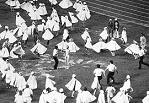






On July 17-Aug. 1, 1976 the XXI (21st) Summer Olympic Games are held in Montreal, Canada, ending up losing $1B; 22 African countries withdraw to protest a tour of South Africa by the All Blacks nat. rugby team of New Zealand; 10 Asian countries withdraw for political reasons; PM Pierre Trudeau bans athletes from the Repub. of China (Taiwan) in favor of the People's Repub. of China, which Canada is making big business deals with; 6,028 athletes from 92 nations compete in 198 events in 21 sports; Queen Elizabeth II opens the games; the Soviet Union wins 47 golds, East Germany 40, the U.S. 34; Michael Leduc (1953-) becomes the first streaker at an Olympic Games, doing it in the closing ceremony, and commenting that he wanted to show the world his beautiful body; on July 18 14-y.-o. serious, unsmiling, robot-like Nadia Comaneci (1961-) of Romania scores a perfect 10 (1st time ever), then scores six more, winning three golds in gymnastics; Edwin Corley Moses (1955-) of the U.S. wins a gold in the 400m hurdles, taking 13 steps between hurdles vs. 14 for everybody else; from 1977-87 he wins 107 consecutive finals in 122 races and sets the world record 4x; Enith Sijtje Maria Brigitha (1955-) of the Netherlands becomes the first black female Olympic swimmer, winning two Olympic medals (bronzes in 100m and 200m freestyle); despite improving his 1972 time by 1.5 min., U.S. marathoner Frank Shorter comes in #2, 50 sec. behind Waldemar Cierpinski (1950-) of East Germany, who sets an Olympic record of 2:09:55; William Bruce Jenner (1949-) of the U.S. wins gold in the decathlon with 8,618 points, which in 1985 are changed to 8,634, taking the event back from the Soviets and making him a superstar, featured on Wheaties boxes, complete with a famous hero shot; when the East German female swimmers look suspiciously masculine, U.S. swimmer Shirley Frances Babashoff (1957-) publicly accuses them of using anabolic steroids, to which an East German official replies "They came to swim, not to sing", causing her to be called "Surley Shirley" and accusing of being a sore lower, until in 1998 it is revealed that 143 members of the East German team took performance-enhancing drugs, and Frank Shorter and U.S. drug czar Gen. Barry McCaffrey work to set up the U.S. Anti-Doping Agency (USADA) in Oct. 1999, while on Nov. 10, 1999 the IOC sets up the World Anti-Doping Agency; Britain's Princess Anne is the only competitor at the Olympics not required to undergo a sex test? - too bad it doesn't apply to major league baseball?
On July 22, 1977 at the Chinese Politburo central committee meeting, Deng Xiaoping is rehabilitated and reinstated as deputy PM, chief of staff of the army, and member of the central committee; at the same time the Gang of Four are removed from all official posts and banned from the party; Deng begins bid for supreme power against Hua Guofeng, launching the Beijing Spring, permitting open criticism of the excesses of the Cultural Rev. and removing barriers against former Chinese capitalists and landlords joining the party to give him new recruits, and decommunizing China with new capitalist programs, giving nearly half of all urban workers a 5%-10% wage increase late in the year; new party leadership is elected on Aug. 20.
In Feb. 1977 Chinese PM (1976-80) Hua Guofeng tells the 5th Internat. People's Congress that China must lower its birthrate to less than 10 per 1K within three years - you first?
On Jan. 26, 1978 Einstein's Theory of Relativity is officially reinstated in Communist China; on Feb. 11 they lift a ban on works by Aristotle, Dickens, and Shakespeare.
In Nov. 1978 the Democracy Wall Movement (ends Dec. 1979) starts when thousands of people put up a big char. poster on a long brick wall on Xidan St. in Xichen, Beijing to protest the Red Chinese establishment, launching the Beijing Spring and the Chinese Democracy Movement (ends ?).
The U.S. sells out its principles when it suits its purpose, or is it just being realistic? On Dec. 15, 1978 (Fri.) Pres. Carter announces that he will grant full diplomatic recognition to the Communist People's Repub. of China (PRC) (Red China) on New Year's Day, and sever official relations with the Repub. of China (ROC) (Taiwan) (Formosa), incl. the 1954 Taiwan Defense Treaty; it continues to maintain unofficial ties through the Am. Inst. in Taiwan, while Taiwan establishes the Coordination Council for North Am. Affairs in Washington, D.C.
On Jan. 1, 1979 the U.S. and Red China hold celebrations in Washington, D.C. and the U.S. embassy in Beijing (attended by Deng Xiaoping) to mark the establishment of full diplomatic relations, pissing-off Taiwan (which the U.S. breaks ties with), and the Soviet Union, which on Apr. 3 is told by China that it will not renew its 1950 treaty of friendship set to expire in 1980, causing Moscow to reply on Apr. 4 that its decision is "contrary to the will and interests of the Chinese people"; Deng Xiaoping arranges a Jan. 29 visit to the U.S.


On Jan. 5-7, 1979 170K Vietnamese troops (14 divs.) occupy Phnom Penh and the seaport of Kompong Som, and oust the 35K Khmer Rouge and Pol Pot, who flee to sanctuaries along the Thai border, where they fight back for the next 12 years allied with the 9K non-Commie troops of Prince Sihanouk and another 15K non-Commie troops under Son Sann (1911-2000), while the Khmer Rouge continue the murder of Cambodians with any "bourgeois" past; the Vietnamese install a people's rev. council led by Heng Samrin (1934-) along with foreign minister Hun Sen (1951-), who becomes PM on Nov. 30, 1998; the Soviets congratulate Vietnam, but Romania breaks with the Warsaw Pact and denounces it, calling it a "heavy blow to the prestige of socialism", and China prepares an invasion of Vietnam to teach them a lesson about who's da boss, them or the Soviets.
On Apr. 10, 1979 after Taiwan goes off the U.S. official map because of Pres. Carter's "One China" policy, and Congress over his objections overwhelmingly passes it, Pres. Carter signs the U.S.-Taiwan Relations Act, authorizing quasi-diplomatic relations via the Am. Inst. in Taipei, Taiwan, in the former U.S. embassy bldg., which becomes a de facto embassy, becoming the first domestic U.S. law governing relations with a foreign nation; on July 7 the U.S.-China Trade Agreement guaranteeing U.S. action in the event of an attack on the island, and providing for the continuation of arms sales, trade, and other relations through an Am. Inst. in Taipei; the agreement grants China most-favored nation status, causing Chinese imports to reach $600M next year and $4B in 1980; despite claiming that all obligations made with it before this year are still valid, Carter unilaterally terminates the Dec. 2, 1954 Sino-Am. Mutual Defense Treaty, pissing-off conservatives led by Ariz. Sen. Barry Goldwater, causing a court battle decided by the U.S. Supreme Court in Goldwater v. Carter, which decides not to decide it because it's a political not judicial matter.

On Sept. 28, 1979 the Chinese Fifth Nat. People's Congress (first in five years) confirms economic planner Zhao Ziyang (1919-2005) as a full member of the Chinese politburo, replacing Hua Guofeng; Deng Xiaoping now dominates China. In Sept. 1979 British PM Margaret Thatcher visits Beijing; Deng Xiaoping refuses her request for continued British admin. of Hong Kong after 1997, but agrees to open negotiations on handover. On Sept. 10, 1980 Zhao Ziyang (1919-2005) becomes PM #3 of Communist China (until Nov. 24, 1987).
On Nov. 6, 1979 the Internat. Olympic Committee in Montevideo, Uruguay decides that Taiwan's teams will participate under the name Chinese Taiwan.



On Dec. 24, 1979 after fearing that it is in danger of being toppled by Islamic mujahideen forces, 85K Soviet troops of the 40th Army invade and seize control of Afghanistan; on Dec. 27 Pres. Hafizullah Amin is assassinated by the KGB, and Babrak Karmal (1929-96) becomes puppet pres. #5 of Afghanistan (3rd Commie) (until Nov. 24, 1986), beginning the Soviet-Afghan War (ends Feb. 15, 1989), in which 13K-15K Soviet soldiers and 1M Afghans are killed, 35,478 Soviet solders are wounded and 311 go MIA, and 3M civilian refugees flee to Pakistan and Iran; by 1985 the Soviets have 120K troops in Afghanistan after 8K deaths and 25K casualties, while the CIA believes they needed 500K troops to win; fear of Communism trumping fear of resurgent Islam, the U.S. backs the mujahideen, giving them $600M a year, along with matching funds from the Persian Gulf states incl. Saudi Arabia, and more support from China and the U.K.; the U.S. gives them hundreds of FIM-92 Stinger anti-aircraft missiles in 1985-6; to keep them from the Soviets, treasures from the Afghan Nat. Museum in Kabul are locked in a basement vault on the grounds of the pres. palace, with the secret "key holders" guarding the key until 2003, incl. the 1st cent. C.E. Bactrian Gold, discovered in a burial ground in the Karakum Desert in 1978 by Soviet archeologist Viktor Ivanovich Sarianidi (1929-).
In 1980 Chinese leader Deng Xiaoping begins the "temporary" One Child Policy, with violators put in makeshift underground jails up to 35 days to scare them to quit doing the wild thing without safe sex; too bad, a daughter who marries doesn't have to take care of her parents, causing a return of infanticide aided by ultrasound machines; sole sons become known as "Little Emperors"; too bad, family-planning bureaucrats in many areas are milked by corrupt higher-ups, ordered to bring in $1K+ U.S. a mo. by selling birth permits, and accept baksheesh, causing births to be underreported, so that by 2000 a State Planning Commission senior official concedes that only 60M of China's 300M children under age 14 are from 1-child families; the Chinese fertility rate drops from 6.45 children per woman in 1968 to 2.24 this year.
On Jan. 2, 1980 in reaction to the Soviet invasion of Afghanistan, the U.S. announces its intentions to sell arms to China.
On Jan. 30, 1980 the first-ever Chinese Olympic team arrives in New York City for the Winter Games.



On Feb. 13-24, 1980 the XIII (13th) Winter Olympics are held in Lake Placid, N.Y. (first time 1932); cuddly bear Misha is the mascot; 1,072 athletes from 37 nations compete in 38 events in six sports; the first use of artificial snow in an Olympics; the People's Repub. of China returns after the IOC agrees to call the other China "Chinese Taipei"; the Soviet Union wins the games with 22 medals (10 gold, 6 silver, 6 bronze); on Feb. 15 Eric Heiden (1958-) of the U.S. sets an Olympic speedskating record in the 500m, and another on Feb. 16 in the 5K, then tops it off with his 5th speedskating gold on Feb. 23 in the 10K, setting another record (a record for a single Winter Olympics in speed skating); on Feb. 22 the Miracle on Ice sees a stunning semifinal round 4-3 upset by the U.S. Olympic hockey team, coached by Herbert Paul "Herb" Brooks (1937-2003) over the Soviets, after which they go on to win the gold on Feb. 24 by defeating Finland 4-2.
In Aug. 1980 the city of Shenzhen in Guangdong N of Hong Kong is designated as Communist China's first Special Economic Zone.
In Sept. 1980 China announces a goal of a pop. limit of 1.2B by 2000, and orders all families of Communist Party officials to limit themselves to one child. In Sept. 1980 (Internat. Year of the Child) the U.N. Gen. Assembly holds its Sixth U.N. Congress on the Prevention of Crime and the Treatment of Offenders in Caracas, Venezuela; on Nov. 29, 1985 it adopts the Beijing Rules (Std. Min. Rules for the Administration of Juvenile Justice), a bill of rights for youthful offenders, mainly drafted in Beijing, China and supported by the U.S.
On Jan. 24, 1981 (5:13 a.m. local time) the 6.8 Dawu Earthquake in Sichuan, China kills 150 and injures 300.

On Jan. 25, 1981 Chmn. Mao's widow Jiang Qing (1914-91) is sentenced to death, which is later commuted to life imprisonment; she is dragged from the courthouse while shouting "It is right to rebel! Making a revolution is no crime!"

On June 29, 1981 after a meeting of the 215-member Chinese Central Committee starting June 27, Deng Xiaoping's protege Hu Yaobang (1915-89) is elected Communist Party chmn. (until 1987), replacing Mao's hand-picked successor Hua Guofeng; Deng becomes chmn. of the military commission of the Central Committee, giving him control of the army and supreme power; the committee concludes its session with a statement holding dead Chmn. Mao responsible for the "grave blunder" of the Cultural Rev.; in Oct. 1983 Deng begins purging the Chinese Communist Party of extreme left-wing Mao holdovers too bad, after a long struggle to enact economic and political reforms, he loses to hardliners in 1987, and his death on Apr. 15, 1989 triggers the Tiananmen Square Protests - who do you bang?
On July 21, 1981 Tohui the Panda (1981-93) is born in Chapultepec Zoo in Mexico City, becoming the first to be born and survive in captivity outside China.
On Sept. 19, 1981 the People's Repub. of China launches three satellites aboard a single FB-1 rocket.
On Jan. 25, 1982 (Chinese New Year) Chinese Central TV debuts its Chinese New Year Gala Program, watched by virtually the entire Chinese pop. every year from now on (until ?).
On Apr. 26, 1982 (16:45 local time) Chinese CAAC Flight 3303 (Hawker Siddeley Trident 2E) en route from from Guangzhou (Canton) crashes near Guilin, killing all 104 passengers and eight crew aboard; on Dec. 24 a CAAC Ilyushin 18B catches fire from a cigarette and makes an emergency landing in Canton, killing 25 of 50 passengers and none of the 11 crew.
On July 1, 1982 results from a census in China are released, fretting about the baby boom gen. since 1961 reaching childbearing age, causing the Chinese constitution to be amended to make family planning each citizen's duty, along with the 1-child rule; on Oct. 27 the final results are released showing an offical pop. of 1.008B, although critics claim it's far higher.
On Dec. 4, 1982 the 4th (1954, 1975, 1978) 1982 People's Repub. of China Constitution is adopted by the 5th Nat. People's Congress; revised in 1988, 1993, 1999, 2004, and 2018.
In 1983 Red China launches a pop. control program, sterilizing 20M, and increasing penalties for violating the 1-child rule, incl. bulldozing homes; in Dec. family planning chief Qian Xin Zhoe announces that a woman with a child must be fitted with an IUD.
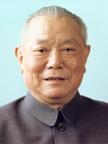
On June 18, 1983 after the new 1982 constitution makes the position largely ceremonial, the Red Chinese parliament elects economics and financial specialist Li Xiannian (1909-92) as pres. #3 of the People's Repub. of China (until Apr. 8, 1988) (first nat. pres. since 1969), going on to become a main architect of China's economic policy and one of the Eight Elders (Immortals) of the Communist Party of China incl. Den Xiaoping, Chen Yun, Peng Zhen, Yang Shangkun, Bo Yibo, Wang Zhen, and Song Renqiong.
In Apr. 1984 Pres. Reagan visits China; Pres. Li Xiannian, an outspoken critic of the U.S. is the official host, but this is just window dressing as Deng Xiaoping, who calls the real shots is busy softening hardline Maoism and introducing Western capitalist ideas to save China's economy; Xiannian discusses the Taiwan situation with Reagan.
In Apr. 1984 the first Weifang Internat. Kite Festival is held in the kite capital of China in the Shandong Peninsula.
On Oct. 20, 1984 China announces economic reforms incl. a plan to lift govt. price subsidies, promises to relax party control over enterprises, and extension of the incentive system granted to farmers in 1979 to cities, with wages and bonuses linked to job performance, along with increased independence of enterprises, officially embracing the Capitalist commodity economy.
Merry Christmas, sucka? On Dec. 19, 1984 after signing an initial agreement on Sept. 26, British PM Margaret Thatcher and Chinese PM Zhao Ziyang sign the Sino-British Joint Declaration, effective Sept. 17, 1985, agreeing to return Hong Kong to Chinese sovereignty on July 1, 1997; China pledges to grant Hong Kong a high degree of autonomy and allow it to retain its capitalist system for 50 years.
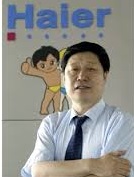
In Dec. 1984 in China Zhang Ruimin (1949-) takes over the helm of the Haier Group, a failing refrigerator manufacturer in the port city of Qingdao, and turns it around, going on to become the world's 4th largest white appliances co.
In Apr. 1985 the British rock duo Wham!, consisting of George Michael (Georgios Kyriacos Panayiotou) (1963-2016) and Andrew Ridgeley (1963-) tours China, becoming the first visit by a Western pop act, boosting their popularity; they split in 1986 and go solo.
On May 27, 1985 in a brief ceremony in Beijing, reps. of Britain and China exchange instruments of ratification on the pact returning Hong Kong to the Chinese in 1997.
On July 8, 1985 China permits marketing of tampons for the first time - don't ask don' tell?

On July 23, 1985 People's Repub. of China pres. #3 (1983-8) Li Xiannian (1909-92) meets with U.S. Pres. Reagan to negotiate a pact for sale of U.S. nuclear equipment, becoming the first official visit by a PRC head of state.

On Nov. 23, 1985 retired CIA analyst Larry Wu-tai Chin (1922-86) is arrested and accused of spying for Red China over a 37-year career (since 1948); after proudly confessing to his massive treason, he commits suicide next Feb. 22 with a paper bag two weeks after his conviction on 17 counts; he tipped the Chinese govt. to Pres. Nixon's decision to reestablish diplomatic relations two years before he did it?
On Feb. 21/22, 1986 (night) Larry Wu-tai Chin (b. 1922), the first American found guilty of spying for China kills himself in his jail cell in Va.
On June 22, 1986 two buses carrying factory workers plunge 800 ft. on Wutai Mountain in Shanxi, China, killing 31 and injuring 35.
In Sept. 1986 China's first stock market opens in Shanghai.
On Oct. 8, 1986 a tourist bus plunges 100 ft. down a valley onto a river bank outside Taichung, Taiwan, killing 39.

On Dec. 10-30 in China thousands of students, led by astrophysicist Fang Li-Zhi (Lizhi) (1936-), husband of physicist Li Shuxian begin protesting for democracy in Shanghai, and the demonstrations spread to Beijing, with Li-Zhi calling on China to embrace "science, democracy, creativity and independence" a la the May 4 Movement in 1919; on Dec. 21 500K Chinese students gather in Shanghai's People's Square calling for dem. reforms, just begging the govt. to get them for behaving badly; Denx Xiaoping storms a meeting of Communist Party leaders fuming about Li-Zhi, saying, that he's "so arrogant" and that he wants to "remold the Communist Party", and getting him expelled from the party for a 2nd time (first 1957), dismissed from his univ. post and reassigned to Peking Observatory to get him out of the way; it was Deng who rehabilitated and readmitted him in 1978.
On Jan. 7-9, 1987 a Chinese-Vietnamese border fight in Vi Xueyen District, Ha Tuyen Province kills 1.5K Chinese troops.
On Mar. 29, 1987 a bus plunges off a cliff in Shanxi Province, China, killing 19 and injuring 28.
On Oct. 25, 1987 in China Deng Xiaoping steps down from all but the top military post.
On Oct. 29, 1987 Zhao Ziyang admits that only 50% of China's economy is under govt. control; by 1990 that figure drops to 30%; on Nov 1. 83-y.-o. Chinese leader Deng Xiaoping retires from the Communist Party's Central Committee and other key posts "to make way for younger leaders", and on Nov. 2 is succeeded by young whippersnapper Zhao Ziyang.

On Jan. 13, 1988 Lee Teng-hui (1923-) becomes pres. of the Repub. of China (Taiwan) (until May 20, 2000), going on to consolidate his power as chmn. of the Kuomintang.
On Jan. 18, 1988 China Southwest Airlines Flight 4146 crashes near Chongqing (Chungking) in SW China, killing all 108 aboard.
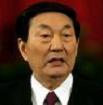
In Apr. 1988 Zhu Rongji (1928-) becomes mayor of Shanghai, China (until 1991), going on to fight corruption and streamline the govt. process of approving business deals, earning him the nickname "One-Chop Zhu", overseeing the development of Special Economic Zone Pudong.
On Aug. 31, 1988 Chinese CAAC Flight 301 (Hawker Siddeley Trident 2E) undershoots its landing in Hong Kong, China, killing seven of 78 passengers and 11 crew.
On Oct. 12, 1988 a bus crashes into a ditch and burns in Shaanxi, China, killing 43 and injuring 40.
On Nov. 12-15, 1988 the Palestine Nat. Council, the legislative body of the PLO meets in Algiers, and its delegates proclaim an independent Palestinian state; on Nov. 20 Egypt and Red China recognize it.
On Jan. 23, 1989 an earthquake rocks landlocked mountainous Tajikistan in C Asia between Afghanistan, Kyrgyzstan, Uzbekistan, and China, killing 272.
On Feb. 4, 1989 Soviet foreign minister Eduard Shevardnadze wraps up four days of high-level talks in China, becoming the first visit by a Soviet foreign minister in three decades.

On Feb. 24, 1989 a state funeral is held in Japan for Emperor Hirohito (b. 1901), who died on Jan. 7; on Feb. 25 Pres. Bush leaves Japan, where he had attended the funeral, and arrives in China for a 3-day visit, which is marred on Feb. 26 by the refusal of Chinese authorities to allow its #1 dissident, astrophysicist ("China's Andrei Sakharov") Fang Li-Zhi (Lizhi) (1936-) to attend a banquet hosted by Bush; he later flees to the U.S. embassy after the 1989 Tiananmen Square Massacre.

On Mar. 29, 1989 Chinese dissident Wei Jingsheng (1950-) is arrested in the crackdown on the Democracy Wall pro-democracy movement and sentenced to 15 years for writing articles questioning the regime; the Commie bastards ruin his teeth and give him heart problems.
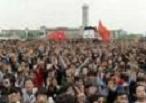

The Chinese Spring ends in the Tank Man? On Apr. 15, 1989 in China former party chief Hu Yaobang dies, and thousands of students in Shanghai and Beijing take to the streets to mourn him; on Apr. 18 they try to storm the Communist Party HQ in Beijing; by Apr. 21 tens of thousands crowd Tiananmen Square, waving banners demanding greater political freedoms, with "black hand" Liu Xiaobo (1955-) leading the fight for multiparty democracy, then persuading students to leave the square before the troops massacre them, for which he is awarded the 2010 Nobel Peace Prize; by Apr. 27 there are 150K protesters (10% of the pop. of Beijing), and 300K army troops are called in (first time since Communism took over?), but the rural troops are easily loved-up by the privileged (children of the elite) students, and disperse within four days sans bloodshed inside the square, although troops fire on protesters outside the center of Beijing en route to the square, and some tracer bullets are fired into the square - my, my, black-eyed pea?
On Apr. 29, 1989 China's govt. conducts informal talks with leaders of the democracy protests, and then televises the discussions - after heavy editing; they won't make that mistake again?
On May 13, 1989 4K students begin a hunger strike for democracy in Tiananmen Square; on May 15-16 Mikhail Gorbachev visits Beijing for the first Sino-Soviet summit since the Sino-Soviet rift 30 years earier; on May 17 1M swarm into C Beijing to express support for the fasting Chinese students.

On May 18, 1989 (a.m.) Chinese PM Li Peng meets with student hunger protesters at the Great Hall of the People in Beijing. On May 19, 1989 after Chinese pro-democracy protests cause Beijing officials to declare martial law, they order CBS and CNN to end their live on-scene reports; on May 21 thousands of native Chinese march in Hong Kong, Paris, Tokyo and scores of other cities in a worldwide show of support for the pro-democracy demonstrators in Beijing; on May 22 100+ top Chinese military leaders vow to refrain from entering Beijing to suppress pro-democracy demonstrations; on May 23 1M in Beijing and tens of thousands in other Chinese cities march to demand that hardliner PM Li Peng resign; on May 24 China's top army command pub. a letter strongly supporting him; on May 30 student demonstrators in Tiananmen Square erect a 33-ft. statue called the Goddess of Democracy, resembling the U.S. Statue of Liberty, complete with blazing torch - their fate's sealed now, give them a week at most?

As Russia's Communism thaws out, China's hardens? On June 3, 1989 (night) peaceful student protests in China for democracy by the Chinese Democracy Movement are ended by govt. violence in the Tiananmen Square Massacre (June Fourth Incident), as troops obey an order to disperse them by 6 a.m.; unknown numbers (180 to 10,454) are killed, and tens of thousands arrested, followed by endless show trials; mention of the date June 4 becomes so taboo that people begin to refer to it as May 35; on June 5 as the army has control of Beijing a lone man (worker not a student?) carrying shopping bags single-handedly confronts and stops a column of tanks while Western journalists secretly film him, dubbing him Tank Man (19-y.-o. Wang Wei Lin?); he is then whisked away by four civilians, who are probably state security personnel (might be pro-democracy people?), and is never identified or seen again, except for rumors of his execution; his example helps cause the Soviet regime to fall faster?; astrophysicist Fang Lizhi (1936-2012) is named China's most-wanted counterrev. criminal by the authorities, and seeks asylum in the U.S. Embassy in Beijing for a year before fleeing to the West; Chinese student Yu Dongyue (1967-) is arrested along with two friends for hurling eggs filled with red paint at the famous Big Painting of Mao (based on a 1950 portrait); he is released in 2006 after being tortured and going insane in prison; the Chinese govt. never permits political freedom, but it inexplicably opens the gates to capitalism, causing a boom leading to a 200M-member middle class within 15 years, incl. 110M Internet users, although China still has 750M poverty-striken, nearly illiterate peasants to worry about, incl. 150M who live on $1 or less a day, and 300K held in reeducation-through-labor camps without trial, and a 99.7% conviction rate?
On June 8, 1989 Chinese PM Li Peng appears on Chinese TV praising a group of Red Army soldiers for crushing pro-democracy protests.

On June 24, 1989 Chinese Communist Party general secy. Zhao Ziyang is ousted for allegedly supporting the democracy protests, and is replaced by Jiang Zemin (1926-2022), who becomes gen. secy. of the Communist Party of China (until Nov. 15, 2002), calling protesters a "counterrevolutionary rebellion" on June 26 and vowing no mercy.
On June 29, 1989 after Repubs. break with Pres. Bush and join Dems., the U.S. House of Reps. unanimously (418-0) votes in favor of new sanctions against Red China to punish its crackdown on the pro-democracy movement; China's trade status as a most-favored nation isn't rescinded.
On Mar. 15, 1990 Jiang Zemin of China visits North Korea to meet with Kim Il-sung.
On Mar. 21, 1990 the Wild Lily student democracy movement in Taiwan culminates in a sit-in demonstration by 300K in Memorial Square, Taipei, calling for direct elections; surprisingly, dictator pres. Lee Teng-hui mellows and invites some of them into his pres. office for talks, pledging to support full democracy, causing the date to begin to be annually celebrated; on Mar. 23, 1996 Lee becomes the first democratically elected pres. of Taiwan with 54%.
On May 10, 1990 the govt. of China announces the release of 211 dissidents who had been involved in pro-democracy demonstrations a year earlier.
In Dec. 1990 China opens the A share capital market for Chinese citizens.
On Mar. 28, 1991 a petition signed by 110 U.S. congressmen is presented to Chinese PM Li Peng by a group of visiting congressmen seeking the release of 77 people imprisoned because of violating the law requiring worship only in state-supervised churches; the list incl. Roman Catholic bishops and priests.
On Mar. 31, 1991 Soviet foreign minister Alexander Alexandrovich Bessmertnykh (1933-) visits Beijing for a summit of the Soviet and Chinese Communist Parties.
On May 23, 1991 China celebrates the 40th anniv. of the "peaceful liberation" of Tibet; despite virtual martial law, independence demonstrations break out in three parts of Lhasa on May 26.
On June 24, 1991 state councilor Wang Fang calls for a "people's war" against drug addiction in China, claiming that narcotics use is the worst since the early 1950s.
On July 9, 1991 after large amounts of rainfall in E China begin on May 18, flooding the Huai, Chu, and Yantze Rivers in the Anhui, Jiangsu, and Henen Provinces, causing soldiers to be overwhelmed and call for internat. aid, at least 978 are announced killed by flooding in the Yangtze River Basin in China; by mid-May the toll rises to 1,700; next Jan. the New York Times claims a death toll of 3K.
On Nov. 16-30, 1991 the first 1991 FIFA Women's World Cup of Soccer in Guangdong, China, attended by 510K (19.6K per match) is won by the U.S., followed by Norway, Sweden, and Germany.

On May 13, 1992 Chinese martial arts master Li Hongzhi (1952-) founds the Falun Gong (Dafa) (Dharma Wheel Practice) at the Fifth Middle School in Changchun City, China, going on to travel throughout China making 70M converts, er, disciples, er, students by 1999, finally pissing-off the paranoid govt. and causing them to persecute it beginning on July 20, 1999.
On July 31, 1992 a China Gen. Aviation Yak-42D overruns the runway in Jiangsu Province, China, killing 108 of 136 aboard.
On Nov. 24, 1992 a China Southern Airlines 737 hits high ground during approach in Guangzhou (Canton), China, killing all 133 passengers and eight crew.

On Mar. 27, 1993 Jiang Zemin (1926-2022) is elected pres. #5 of the People's Repub. of China by the Nat. People's Congress (until Mar. 15, 2003).
On Apr. 6, 1993 a China Eastern Airlines MD11 accidentally deploys the leading edge slats while cruising near the Aleutian Islands, killing two of 248 passengers during violent maneuvers.
On July 23, 1993 a China Northwest BAe146 overruns the runway in Yinchuan, China, killing 54 of 108 passengers and one of five crew.
On Oct. 26, 1993 a China Eastern MD82 goes off the end of the runway in a rainstorm in Fuzhou, China, killing two of 71 passengers; on Nov. 13 a China Northern MD82 crashes 1 mi. short of the runway in Urumqui, China during approach in dense fog, killing four of 92 passengers and four of eight crew.
On Apr. 26, 1994 China Airlines Flight 140 (Airbus A300) en route from Taipei, Taiwan stalls and crashes as it approaches the runway in Nagoya, Japan, killing 264 of 256 pssengers and crew aboard.
On May 7, 1994 Japanese justice minister Shigeto Nagano is forced to resign for denying that the Japanese Army massacred Chinese civilians at Nanjing in 1937 and that Japan was an aggressor in WWII; on Aug. 12 environment minister Shin Sakurai also denies Japan's aggression in WWII and is also forced to resign; on Aug. 14 PM Tomiichi Murayama apologizes for the "tragic sacrifices" which Japan inflicted on other countries during the war.
On Aug. 20-21, 1994 Super Typhoon Fred (Typhoon Susang) (formed Aug. 12) pounds the coastal region of Zhejiang Province in China, killing 700+ and causing $1.6B in damage; most of the casualties occur in the city of Wenzhou.
On Dec. 8, 1994 a fire breaks out in a crowded cinema in Karamay, China in the NW region of Xinjiang, and the 1000 students and teachers are ordered to remain seated until Communist Party officials exit, killing 288 schoolchildren and 37 teachers.

On July 21, 1995 the Third Taiwan Strait Crisis begins when Red China accuses Taiwan pres. (since Jan. 13, 1988) Lee Teng-hui (1923-) of independence sentiments by accepting an invitation to speak at his alma mater Cornell U. on "Taiwan's Democratization Experience", causing Red China to conduct missile tests on July 21-26 60 km. N of Pengjia Islet and mobilize forces in Fujian, followed by live ammo tests on Aug. 15-25, naval exercises in Aug., and amphibious assault exercises in Nov., causing the U.S. to respond with the biggest display of military might in Asia since the Vietnam War, causing China to acknowledge inability to stop them but announce that reelection of Teng-hui on Mar. 23 will mean war, pissing-off the Taiwanese, who reelect him with a bigger margin (54% vs. 49%), after which the Red Chinese back down after firing test missiles into the Taiwan Strait on Mar. 7 and launching military exercises there on Mar. 12.

On Feb. 19, 1997 Chinese leader Deng Xiaoping (b. 1904), last of China's major Communist revolutionaries dies of Parkinson's disease after allowing grassroots democracy and a semi-capitalist market economy to grow, leaving Jiang Zemin in control of China; luckily, hardliner Peng Zhen (b. 1902), who helped oust reformer party chief Hu Yaobang in 1987 followed by his successor Zhao Ziyan in 1989 after he refused to suppress pro-democracy demonstrations in Tiananmen Square dies on Apr. 26; on Sept. 18 Jiang Zemin gets his rival Qiao Shi (Jiang Zhitong) (1924-2015) ousted from the Communist Central Committee.
On May 8, 1997 a China Southern Airlines Boeing 737 crash-lands in heavy rain in Shenzhen-Huangtian, China, veering off the runway and breaking up and catching fire, killing 33 of 65 passengers and two of nine crew.

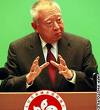

On July 1, 1997 Hong Kong reverts to Chinese Communist rule after 156 years as a British colony, causing the first Hong Kong July 1 March; Christopher Francis "Chris" Patten (1944-) becomes the last (28th) British gov. of Hong Kong (since July 9, 1992); Chinese pres. Jiang Zemin promises to continue Deng Xiapong's 1982 policy of "one country, two systems" and let them keep their capitalist system, despite an Apr. 9 announcement that public protest and rights of association will be restricted; shipping magnate Tung Chee-hwa (1937-) becomes the first Chinese gov. of Hong Kong (until Mar. 12, 2005), gaining the nickname "Old Confused Tung" for his track record; meanwhile on Nov. 16 Beijing releases dissident Wei Jingsheng (1950-) from prison (since 1979), and allows him to fly to Detroit, Mich. for medical treatment.
You may leave the temple, Grasshopper, and go right to the doctor's office? On July 2, 1997 Thailand's currency, the baht suddenly collapses after the govt. spends $60B to prop it up in vain, triggering the 1997 Asian financial crisis after "Asian tigers" had overborrowed throughout the decade to overbuild their manufacturing capacity; by July 16 the currencies in Malaysia (ringgit), Singapore and the Philippines also plunge, followed by Indonesia (rupiah) on Aug. 14; in Aug. the Dow Jones Industrial Avg. soars to 8.2K, then plunges a record 554.26 points on Oct. 27 to close at 7161.15 after the baht drops 35% and the Hong Kong stock market falls 13.7% in 1 day (40% for the mo.); in Nov. PM Chavalit Yongchaiyudh resigns, and former PM (1992-5) Chuan Leekpai becomes PM (until 2001), saying that Thailand will need at least until the year 2000 to recover; in Nov. the South Korean won begins collapsing, causing calls for help from the IMF.

On Mar. 17, 1998 1st vice PM (since Mar. 29, 1993) Zhu Rongji (1928-), known for his success in managing large economic projects is selected by the Nat. People's Congress as People's Repub. of China PM #5 (until Mar. 16, 2003), going on to push privatization and reduce the size of the state bureaucracy and resist calls to devalue the yuan, presiding over the spectacular double-digit growth of the Chinese economy and new presence in internat. affairs.
On Feb. 24, 1999 a China Southwest Airlines Tupolev-154 en route from Chengdu to Wenzhou explodes and crashes near Ruian, China 12 mi. from its destination, killing all 50 passengers and 11 crew.
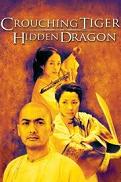
On July 6, 2000 Ang Lee's Crouching Tiger, Hidden Dragon (Wo Hu Cang Long) (Production Asia) (Sony Pictures) debuts, starring Yun-Fat Chow (Taiwan) and Michelle Yeoh (Malaysia), and introducing Beijing-born Chinese actress Zhang Ziyi (1979-) on wires; it goes on to become the top-grossing foreign language film to date ($213.5M on a $17M budget); Zhang later approaches Steven Spielberg about starring in his "Memoirs of a Geisha", giving him the only line in English she knew: "Hire me!"
On July 20, 1999 the Chinese govt. under market reform Chinese Communist Party (CCP) gen. secy. (1989-2002) Jiang Zemin bans the apparently harmless Falun Gong meditation cult just for having so many members that it just might threaten their power; they go on to put millions of followers into reeducation labor camps and prisons, torturing to death at least 2K by 2009, causing the CCP to sink to a level so low it may never recover? - keep banging and they'll set you on fire?
On Jan. 23, 2001 in China five people believed to be members of Falun Gong set themselves on fire in Tiananmen Square; one dies.


On Nov. 15, 2002 Hu Jintao (1942-) becomes gen. secy. of the Communist Party of China; On Mar. 15, 2003 Hu Jintao (1942-) becomes pres. #6 of the People's Repub. of China (until Mar. 14, 2013), replacing pres. (since Jar. 27, 1993) Jiang Zemin; on Mar. 16 Wen Jiabao (1942-) becomes PM #6 of the People's Repub. of China (until Mar. 15, 203) - hu, wen, jin, jia, and bao?
In Dec. 2003 a woman in Harbin, China runs over and kills a peasant who had scratched her Mercedes with his vegetable cart, and escapes charges, causing people to think she had govt. ties because she had an expensive license plate filled with lucky number 8s; the stink causes the officials to put license plates up for auction with the proceeds going to accident victims.
As of 2005 the world consumes 84M barrels of oil a day, while oil fields produce 85M, leaving only 1M barrels of "excess capacity"; meanwhile China is motorizing at jet speed, causing a tug of war with the U.S., which consumes 25% of the world's energy with just 5% of the pop., and imports 10M barrels a day, half from OPEC (35% domestic, 11% Canada, 10% Mexico, 9% Saudi Arabia, 8% Venezuela, 7% Nigeria, 20% other); world reserves of oil total 1.1T barrels (.9T previously consumed), enough for 40 years.
In 2005 after 14 consecutive years of double-digit increases in its military budget, China has the 2nd biggest in the world ($65B), with 2.5M soldiers; it targets 600 missiles at Taiwan, adding 75 more each year.
China shows how Big Brother and the Internet can coexist? In 2005 after investing $138B in infrastructure over five years, China now has 94M Internet users, compared to 24M for India; online revenue is $1.1B, compared to $93M for India; in Aug. Yahoo.com pays $1B for a 40% stake in Alibaba.com, China's biggest online commerce firm; in 2003 it invested $120M in a Chinese search engine, and in 2004 bought a controlling stake in online auction site 1pai.com.cn; Chinese web sites are prohibited from containing content that "divulges state secrets, subverts the govt. or undermines national unity", and in 1997 this was announced to incl. "feudalistic" and "supersitious" content, incl. astrology, fortune-telling and numerology; there are Internet police depts. in over 700 cities and provinces; Microsoft Corp. draws criticism for implementing software for China which kow-tows to these demands, warning bloggers not to use words like "democracy", "freedom", "liberty", "demonstration", "separatism", "capitalism", "human rights"; China also bans Wikipedia, the 2.3M article 100-language free online user-supported hit-miss encyclopedia.
In Apr. 2005 the World Bank Food Programme approves a $3.8B loan for hungry Zambia, and announces that it will stop food aid shipments to China at the end of the year; China becomes the world's 3rd largest food aid donor by 2009.
On July 23-28, 2005 81-y.-o. Pres. Robert Mugabe of platinum-rich Zimbabwe visits China as part of his "Look East" policy to switch from Britain to China for its economic support, with his human rights abuses not an issue there, incl. a life expectancy drop since 1988 from 62 to 38 years.
On Jan. 14, 2006 the Pitchfork Rebellion in China begins when 1K villagers in Panlong in Guangdong Province (S China) begin a protest of the govt.'s decision to seize communal farmland and lease it to a foreign investor, and police attack them with electric batons, injuring 20 and killing a 13-y.-o. girl; the 900M farmers are getting more and more disgruntled at the so-called Commies selling out to Western capitalism and creating a wealthy urban elite while leaving them behind?
On Feb. 15, 2006 members of the U.S. Congress pillory execs of Yahoo, Google, Microsoft, and Cisco Systems after Billy Goat, er, Microsoft responds to a Chinese request to shut down the blog site of Chinese journalist Michael Anti (1964-) and provides the Commies with censoring software, and Yahoo stinks itself up by providing info. to help the Commies track down and imprison dissidents Shi Tao (10 years), Li Zhi (8 years), and Jiang Lijun (4 years); a grassroots Internet Boycott Yahoo campaign begins; Google has actually done nothing objectionable, offering the Chinkfaces a censored version of its search engine but keeping its uncensored version available?
On Apr. 20, 2006 Pres. Bush meets with Chinese Pres. Hu Jintai in Washington, D.C., and Hu is interrupted in a speech by Wenyi Wang (1958-), who shouts at him to stop persecuting the Falun Gong, causing Bush to apologize for her brief freedom of speech before she is manhandled and her mouth cupped by Secret Service agents and taken to jail like in er, Commie China on trumped-up charges of intimidating foreign officials?; when Bush later asks Hu when China will become a democracy with free elections, he responds, "I don't know what you mean by a democracy... we always believe in China that if there is no democracy, there will be no modernization" - whose achievement of rhetorical B.S. is greater, East or West?
On May 9, 2006 Cuba, Saudi Arabia, China, and Russia become the 44th through 47th members of the new U.N. Human Rights Council, which replaces the politicized Human Rights Commission known for allowing members with bad records; 64 of the 191 U.N. member states submitted candidacies, which must be approved by a majority of the states; Venezuela and Iran are rejected; the U.S. didn't apply.
In May 2006 the 525-ft. Star of Nanchang opens in Nanchang, Jiangxi Province, China, becoming the tallest operating Ferris wheel in the world (until Feb. 2008).
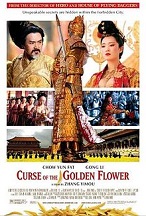
On Dec. 21, 2006 Zhang Yimou's Curse of the Golden Flower (A Whole City Clothed in Golden Armor) (Sony Pictures) debuts, set in 928 C.E. Tang China, starring Chow Yun-fat as Chinese Tang emperor Ping, and Gong Li as his empress, whom he's slowly poisoning with a Persian fungus, causing her to plot a coup, steeped in lushly colorful opulence and back-stabbing; most expensive Chinese film to date ($45M); does $78.5M box office.
In 2007 China admits that it has 60M obese people; meanwhile it permits parents with surnames Zhou and Zhu to name their children Zhou, Zhu, Zhouzhu or Zhuzhou to ease the confusion of only about 100 family names in the whole nation.
As of 2007 nine countries have nukes: U.S., Russia, Britain, France, China, Israel (unacknowledged), India, Pakistan, North Korea; Iran is suspected of pursuing them; Indonesia is suspected of pursuing them in the 1960s after China's 1964 nuclear test; South Africa had them but gave them up in 1991; Egypt is pursuing a nuclear power program; Sweden has been a question mark since the 1950s; Japan has an official anti-nuke policy; more than 30 countries without nukes possess the materials and capabilities to make them using plutonium produced by a total of 435 operating nuclear power reactors worldwide; the U.S. and Russia possess 95% of the 27K known nukes; the original 1980s calculation of nuclear winter conditions only used 100 Hiroshima-sized 15K-ton A-bombs.
On Jan. 23, 2007 China confirms that it sent men into orbit and launched dozens of satellites to test a new satellite-killing weapon.
In Mar. 2007 a rash of deaths from eating pet food in the U.S. traced to Menu Foods "cuts and gravy" style is traced to rat poison in wheat gluten from China, but scientists later switch to melamine, a chemical from coal used to make plastics, which China had been putting into animal feed as a fake protein; 60M pet food containers of 100 brands are recalled, and 14K pets are reported sick; on Apr. 26 the U.S. Dept. of Agriculture orders 6K hogs quarantined or slaughtered after melamine is found in hog feed; on Apr. 26 China accedes to demands and bans it.
On May 12, 2008 the 7.9 Chengdu Earthquake strikes W China along the Longmenshan Fault separating the Sichuan Basin from the Tibetan Plateau, killing 70K (incl. 19K students) and leaving 4M homeless; reports of faulty construction of schools, which left thousands of children dead cause angry parents to protest in Dujiangyan on June 3, causing a police crackdown; 9-y.-o. Mao Mao, a prime breeding female panda is killed in the Wolong sanctuary in Sichuan Province; the Chinese govt. exempts their 1979 policy to allow another child to qualifying parents.
On May 5, 2007 an explosion in the Pudeng Coal Mine in C China kills 15 miners and traps 30; an avg. of 13 miners die each day in mining accidents in China.
On Dec. 28, 2008 a bomb in the backpack of Li Yan explodes prematurely as he is about to plant it in a coffee shop in Kunming, SW China owned by two Americans and frequented by Westerners.
On Mar. 13, 2009 (Fri.) Wall Street has its best week of 2009, with a 3-day rally after reports that the U.S. trade gap narrowed in Jan. to $36B (lowest since Oct. 2002), Bank of Am. reports profits in Jan. and Feb., and Citigroup claims its best quarter since 2007; the Dow gains 53 points (.9%) to close at 7,223, and Nasdaq gains 5 points to 1,431; on Mar. 17 the Dow is up 849 points (13%); the rally continues until ?; meanwhile Chinese PM (since 2003) Wen Jibao (1942-) utters the soundbyte: "We have loaned a huge amount of money to the United States. Of course, we are concerned about the safety of our assets. To be honest, I'm a little bit worried. I would like for you [a Western reporter] to call on the United States to honor its word and stay a credible nation and ensure the safety of Chinese assets"; China has $2T in foreign reserves and is the #1 creditor of the U.S., holding $1T of its debt; he also outlines a $585B stimulus plan for China, claiming that the Chinese economy will grow by 8% this year - mighty capitalist of him?
On Dec. 7, 2009 the U.S. Environmental Protection Admin. (EPA) announces that greenhouse gases endanger public health and welfare, opening the way for the Obama admin. to impose its own curbs on emissions with or without approval from Congress. On Dec. 7 the Hopenhagen.org Web site sponsored by Coca-Cola, Siemens, and SAP corps. opens, inviting the world's citizens to sign a petition demanding world leaders draft binding agreements on climate changes; meanwhile Europe has its coldest winter in 50 years, snowing uninterruptedly starting on Dec. 13; Coca-Cola spearheads a coalition of 100+ cos. pushing a U.N. climate treaty, which commits the world's wealthiest nations to $10T in foreign aid, and possible create an internat. "super-grid" for regulating and distributing electric power; on Dec. 7-18 the 2009 U.N. Climate Change Conference attended by 15K reps from 192 nations is held in Copenhagen, Denmark to attempt to reach an internat. agreement to curb greenhouse gas emissions, with U.N. Climate Change Secretariat head Yvo de Boer uttering the soundbyte: "The clock has ticked down to zero. After two years of negotiations the time has come to deliver"; developing nations will be offered aid to cut emissions; on Dec. 8 a leaked document showing that world leaders will be asked to sign an agreement handing more power to rich countries and sidelining the U.N.'s role in all future climate negotiations causes an uproar, after which African reps. walk out on Dec. 14; on Dec. 14 Al Gore gives a speech, claiming that polar ice may vanish in 5-7 years (summer 2014), rather than in 2030 like other scientists estimate, citing Wieslav Maslowski, who later disclaims it; on Dec. 18 Pres. Obama visits it, originally planning to pledge a 17% emissions cut by 2020, and 83% by 2050, but ending up frantically trying to rescue it from a stalemate after China balks at a real deal, getting snubbed by the Chinese PM then crashing a meeting to work a last-minute toothless deal in order to claim a V; the last day of the conference is blanked with 4 in. of snow; Christopher Monckton, former science adviser to British PM Margaret Thatcher claims that the real purpose of the conference is to lay the foundation for a OWG, but since it was a dud he must have been mistaken?; on Dec. 12 Danish police arrest 968 of 100K pro-global-warming protesters in Copenhagen; next July U.N. climate chief Yvo de Boer resigns.
In 2009 due to the 2008 global recession, world wealth drops 11.7% to $92.4T; bailouts received: Bank of America $45B, AIG $180B, Citigroup $50B, Gen. Motors $50.4B, Chrysler $12.5B, GMAC $12.5B, Chrysler $1.5B; China surpasses the U.S. as the largest consumer of the automobile, with sales of 12.8M cars and light trucks vs. 10.3M in the U.S., up by 40% since 2008. The percentage of Americans in poverty rises to 14.3%, worst in decades.
In 2009 more than half of the U.S. Treasury Dept. is owned by foreign lenders, who also own a third of U.S. corporate bonds and a sixth of U.S. corporate assets; the percentage of U.S. treasury notes purchased by China and Hong Kong drops to 9% from a high of 55% in 2006; China's banking system has 25x the reserves of the U.S. Federal Reserves, vs. (1/2.5)x in 1990; the U.S. dollar comprises 19% of the world's money supply vs. 100% at the end of WWII; the U.S. income gap between rich and poor is the widest since 1917, with the top 10% receiving 49.7%; meanwhile China's economy grows 8.7% this year, and China has 130 billionaires, up from 101 in 2008 and zero in 2003, making it #2 after the U.S.
On Aug. 20, 2009 (8:30 p.m.) millions in China claim to see two huge rotating glowing mist-shrouded saucer-shaped UFOs.
On Sept. 6, 2009 Li Zhi, secy. of the Communist Party in Urumqi, China is removed after reports of bizarre needle attacks amid the mob violence.
On Sept. 20, 2009 the nat. flag of the Communist People's Repub. of China is hoisted on the South Lawn of the White House to celebrate Red China's 60th anniv.; on Sept. 22 Pres. Obama meets with Chinese pres. Hu Jintao in New York City to discuss the new U.S. tariffs on Chinese tires - and we intend to stay?
On Jan. 1, 2010 China announces that it arrested 5,394 in 2009 for Internet porn, vowing to increase the crackdown.
On Jan. 12, 2010 China successfully tests an anti-missile system; meanwhile the People's Bank of China surprises investors by raising the required reserves of banks to tighten its monetary policy.
On Jan. 13, 2010 Google Inc. announces that it discovered a massive attempt to hack into its email accounts of Chinese dissidents, and is responding by stopping its censoring of search results in China; China censors the news of it, after which on Jan. 14 its official spokesperson Jiang Yu claims that "China's Internet is open", and that the govt. prohibits e-mail hacking; on Jan. 21 U.S. secy. of state Hillary Clinton gives a Speech on Internet Freedom, singling out China, drew analogies between the Iron Curtain and the free and unfree Internet, pissing them off and causing them on Jan. 22 to tell the U.S. govt. "to respect the truth and to stop using the co-called Internet freedom question to level baseless accusations", then on Jan. 24 they pub. an article in People's Daily accusing the U.S. of controlling the Internet in the name of Internet freedom and mounting a "hacker brigade" to foment unrest in Iran; on Mar. 22 after a Chinese official Googles himself and finds material critical of himself, ordering a crackdown, another official claims China can live without Google, and they get into a mini-war for 2 mo., Google announces that it's closing its China-based Web site and redirecting traffic to an uncensored site in Hong Kong, which the Chinese will censor; on July 9 China gives Google a green light to keep its search page.
On May 17, 2011 a U.N. Report on China claims that for more than a decade China has been aiding Iran and North Korea in developing ballistic missiles and nukes and getting around sanctions.

On Aug. 16, 2011 Seattle, Wash.-born former Dem. Wash. gov. #21 (1997-2005) Gary Faye Locke (1950-) becomes U.S. ambassador to China #10 (until Mar. 1, 2014).
On Aug. 16, 2011 the Obama admin. denies to Taiwan its request for new Lockheed Martin F-16C/Ds, instead forcing them to retrofit older F-16A/Bs.
In 2012 the U.S. exports $110B worth of goods to Red China, which exports $425B to the U.S., becoming the largest trade deficit one nation has with another so far in history (until ?); the merchandise trade deficit with Red China tops $300B, continuing until ? after a peak of $418.2B in 2018.
On Jan. 4, 2012 Chinese pres. Hu Jintao pub. an article complaining that Red China and the West are engaged in an escalating culture war, containing the soundbyte: "We must clearly see that international hostile forces are intensifying the strategic plot of westernizing and dividing China."
On Jan. 4, 2012 a bus slips off an icy bridge in Guizhou Province, China, killing 18 and injuring 37 of 57 aboard.
On Jan. 14-19, 2012 Chinese PM Wen Jiabao visits Saudi Arabia (first trip by a Chinese PM in two decades), Qatar (first-ever), and the UAE (first-ever); on Jan. 15 Jiabao meets with Ekmeleddin Ihsanoglu, secy.-gen. of the Org. of Islamic Cooperation (OIC), announcing an agreement on strategic relations between China and the Muslim World; China is thinking of ending its long relationship with Iran and getting a new oil source?
On Jan. 19, 2012 Pres. Obama rejects TransCanada's application for the 1.7K mi. Keystone Oil XL Pipeline, blaming the Repub.-controlled Congress for an "abritrary deadline" that didn't give the State Dept. enough time to gather info.; Canada announces that it may turn to China instead.
On Jan. 31, 2012 China claims that 29 of its citizens were abducted while working on a construction project in Sudan, asking the govt. of South Sudan for help on Feb. 2; they are released on Feb. 7.
In Jan. 2012 the U.S. begins phasing-out incandescent light bulbs, starting with the 100-watt bulb this year, followed by the 40-watt bulb in 2014; too bad, compact fluorescent lights (CFLs) are labor-intensive to manufacture, causing U.S. plants to shut down and Chinese plants to expand.
On Feb. 1, 2012 25 Chinese cement factory workers held captive in Sinai, Egypt are released one day after being taking hostage by Bedouin tribesmen.
On Feb. 3, 2012 the Syrian Observatory for Human Rights claims 100+ were killed by shelling in Homs, causing the U.N. Security Security Council on Feb. 4 to vote on an Arab League proposal, which is veoted by China and Russia; meanwhile on Feb. 4 Tunisia withdraws recognition of the Syrian govt., the Arab Parliament calls for Arab countries to do ditto, 12 are arrested at the Syrian embassy in London, and more protests are staged at Syrian embassies in Germany, Australia, Greece, Kuwait, and Egypt.

On Feb. 6, 2012 the Wang Lijung Incident sees Chongqing vice-mayor Wang Lijun attempt to defect at the U.S. consulate in Chengdu, leading to the downfall of his up-and-coming boss Bo Xilai (1949-) (Communist Party secy. of Chongqing since Nov. 2007) (son of Communist Party founder Bo Yibo), who is removed as Chongqing party chief in Mar. and suspended from the Politburo in Apr., then expelled from the Communist Party; next Sept. 22 he is found guilty of corruption, stripped of all assets, and sentenced to life in prison.
On Feb. 9, 2012 Canadian PM Stephen Harper visits China, signing $3B in trade agreements.
On Feb. 12, 2012 18-y.-o. Tibetan Buddhist nun Tenzin Choedon (b. 1993) immolates herself in Suchian Province, China in protest against Chinese rule; a Tibetan monk does ditto in W China on Feb. 14.
On Feb. 13, 2012 Chinese vice-pres. Xi Jinping meets with Pres. Obama in the White House.
On Feb. 18, 2012 a funeral procession in Damascus, Syria for those killed in protests is fired on by security forces; meanwhile China urges all sides to end the violence.
On Feb. 18-20, 2012 Chinese vice-pres. Xi Jinping visits Ireland, signing trade pacts.
On Feb. 21, 2012 a blast at a steel plant in Liaoning, China kills 13 and injures 17.
On Feb. 29, 2012 separatist riots in Xingjiang, China kill 20.
On Mar. 24, 2012 China announces that it is phasing-out its practice of selling organs from executed prisoners in 3-5 years.
On Mar. 26, 2012 Chinese pres. Hu Jintao visits New Delhi, India; Tibetan protester Jampa Yeshi immolates himself before he arrives.
On Mar. 29, 2012 an explosion in a coal mine near Baishan, China kills 28; another explosion on Apr. 1 kills six more.
On Mar. 31, 2012 Chinese police arrest six and shut down 16 Web sites for spreading rumors of military vehicles on the streets of Beijing in a coup.
On Apr. 5, 2012 a Chinese co. stops insuring tankers carrying Iranian oil as part of world sanctions.
On Apr. 9, 2012 North Korea positions a rocket on a launch pad, drawing protests from the West, who claim it might be a ballistic missile; on On Apr. 13 (centenary of the birth of Kim Il-sung) North Korean Earth observation satellite Kwangmyongsong-3 explodes 90 sec. after launch; on Apr. 15 new North Korean Dear Leader Kim Jong-un gives his first public speech in Kim Il-sung Square in Pyongyang, calling for "final victory"; on Apr. 19 North Korea vows retaliation after the U.S. scraps food aid over the failed rocket launch, claiming that it's no longer bound by a bilateral agreement to halt testing of nuclear missiles and long-range missiles; on Apr. 23 North Korea threatens to reduce South Korea "to ashes"; on Apr. 23 China stops deporting North Korean defectors; on Apr. 24 U.S. defense secy. Leon Panetta warns North Korea against "any further provocations" against South Korea, saying that another nuclear test would create "greater instability in a dangerous part of the world".
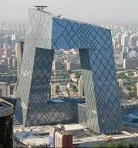
On May 16, 2012 the bizarre 44-story Central China TV HQ (begun June 1, 2004) in Beijing opens; in Feb. 2016 the China State Council announces that it will no longer approve "bizarre architecture".

On July 27-Aug. 12, 2012 the XXX (30th) Summer Olympics are held in London, England; 10,820 athletes from 204 countries participate; the games are opened by Queen Elizabeth II; Los Angeles Philharmonic conductor (since 1992) Esa-Pekka Salonen carries the Olympic Flame; Saudi Arabia, Qatar, and Brunei enter female athletes for the first time; women's boxing makes its debut, making it the first Olympics at which every sport has female competitors; the U.S. wins 104 medals, followed by China (88), Russia (82), the U.K. (65), and Germany (44); Michael Phelps of the U.S. wins his 22nd medal, becoming the most decorated Olympic athlete ever (until ?); the World Shakespeare Festival, produced by the Royal Shakespeare Co. accompanies the games; South African sprinter Oscar Leonard Carl Pistorius (1986-) becomes the first double-leg amputee to participate in the Olympics.


On Nov. 15, 2012 Xi Jinping (1953-) becomes gen. secy. of the Chinese Communist Party; on Mar. 14, 2013 he becomes pres. #7 of the People's Repub. of China (until ?); on Mar. 15, 2013 former Young Communists leader Li Keqiang (1955-) becomes PM #7 of China (until ?); Jinping goes on to consolidate power in the party's hands, announcing a reorg. in late Mar. 2018 transferring control of key govt. bureaus to party organs, undoing the party-state divide set up by Den Xiaoping in the 1980s, and cracking down on univs., increasing ideological control with a 2016 directive from the ministry of education calling for more "patriotic education"; in 2017 he urges overseas Chinese students to set up Communist party cells.
In Dec. 2012 China pulls even with the U.S. on oil imports at 6M barrels a day.
On Feb. 3, 2013 Lobsang Namgyal (b. 1975) commits Tibet's 100th self-immolation since 2009 in W Tibet in a protest against Red Chinese occupation.
On Feb. 5, 2013 Pakistan agrees to hand control over the deepwater port of Gwadar, Pakistan 250 mi. from the Strait of Hormuz to China.
On Feb. 13, 2013 a Tibetan monk shouting anti-Chinese slogans self-immolates on the street in Katmandu, Nepal.
On Feb. 20, 2013 U.S. Rep. Mike Rogers, chmn. of the House Select Committee on Intelligence utters the soundbyte "I can't tell you how serious" the threat of Chinese hackers are to the security of the U.S., calling it "breathtaking, it's serious, and it will cost us the next generation of prosperity if we don't do something about it".
In Feb. 2013 Japanese military forces engage in Operation Iron Fist in response to increasing aggressiveness by China, shifting further away from pacifism.
On Mar. 22, 2013 new humble Pope Francis I gives his first foreign policy address, calling for a dialogue with Islam and offering an olive branch to China.
On Mar. 22-24, 2013 new Chinese pres. Xi Jinpig makes his first official foreign visit to Russia to highlight strengthening ties; his wife Peng Liyuan becomes China's Michelle Obama.
On Mar. 28, 2013 the Red Chinese People's Daily pub. an article blasting Apple Computer Inc., with the headline "Destroy Apple's Unparalleled Arrogance", accusing it of "Westerners' traditional sense of superiority" in its policies towards China for only having a 1-year warranty instead of a 2-year warranty.
On Apr. 2, 2013 North Korea announces the intention to resume activities in the Youngbyon Nuclear Complex, which has been closed since 2007; U.S. officials announce concerns that pesky North Korea can explode a nuke over the U.S. with their "space launch vehicle", positioning warships closer to North Korea, and also reveal that China has been increasing its military presence on the North Korean border since mid-Mar. along with naval drills in the Yellow Sea, while experts reveal that the 2013 North Korean nuclear test may have been conducted with a uranium nuke rather than a plutonium one.

On Apr. 12, 2013 5'8" Chinese amateur golfer Guan Tianlang (1998-) becomes the youngest player to make the cut in PGA history in the 2013 Masters.
On Apr. 16, 2013 the price of gold falls below $1.4K, sparking a buying frenzy in India and China.
On Apr. 19, 2013 a 7.0 earthquake in Sichuan, China kills 156 and injures 5.5K.
On May 12, 2013 an explosion at the Taozigou Mine in Luzhou, China kills 27 and injures 16.
On May 14, 2013 the Internat. Energy Agency (IEA) releases its 2013 Medium-Term Oil Market Report (MTOMR), saying that the surge in North Am. oil production is creating a supply shock that will transform the market over the next five years as much as the rise of Chinese demand over the last 15 years.
On May 18, 2013 hundreds of Muslims storm the office of Chinese man Lee Ping in Pakistani-administered Kashmir for allegedly desecrating a Quran by throwing it on the ground, causing his arrest.
On May 20, 2013 a report by the U.S. State Dept. says that countries around the world have been using laws against blasphemy and apostasy to suppress political opposition, singling out China, Eritrea, Iran, Myanmar (Burma), North Korea, Saudi Arabia, Sudan, and Uzbekistan.
On May 25, 2013 a mother flushes her newborn baby ("Baby 59") down a squat toilet in Pujiang County, Zhejiang Province, China, and is rescued by the authorities; on May 30 the boy is released into the custody of his maternal grandparents; the mother is not charged.
On May 29, 2013 the U.S.-based Uighur Human Rights Project pub. a study that claims that China has imposed a "bewildering" array of regulations on the practice of Islam by its minority Uighur pop.
In May 2013 Chinese PM Li Keqiang gives a speech announcing that the govt. is going to allow private businesses and market forces to play a larger role in the economy to improve living conditions for the middle class and increase global competitiveness.
On June 7-8, 2013 Pres. Obama and new Chinese Pres. Xi Jingping have a summit at Sunnylands Retreat in Palm Springs, Calif.; Obama urges Jingping to cooperate on cybersecurity.
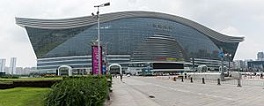
On July 1, 2013 the 328 ft. x 1,640 ft. x 1,312 ft. New Century Global Center in Chengu, China (begun 2010) opens, becoming the bldg. with the most floor space on Earth (420 acres).
In early July 2013 Red China and Russia hold massive war games.
On July 5, 2013 China and Pakistan sign an Economic Corridor Agreement linking NW China to the Arabian Sea.
On July 22, 2013 (7:45 a.m. local time) two earthquakes (5.6, 5.9) in Dingxi, Gansu, C China kill 95 and injure 2.3K.
On Aug. 29, 2013 Edward Snowden releases a document to the Washington Post exposing the funding of the huge U.S. spy network, which spies on Russia, Cuba, Red China, Iran, and yes, Israel.
On Sept. 16-20, 2013 the Workshop on Human Space Technology is organized by the China Manned Space Agency and U.N. Office for Outer Space Affairs.
On Sept. 25, 2013 the Chinese Communist Global Times newspaper announces that China has the military capability to strike anywhere in the W Pacific incl. Japan, SE Asia, and Australia.
On Oct. 1, 2013 a mortar shell lands near the Chinese embassy in Damascus, Syria, injuring one, pissing-off the Chinese govt.
On Oct. 4, 2013 Chinese state media announce that the govt. employs 2M people to monitor microblogs.
On Oct. 6, 2013 a protest in Biru, Tibet is shut down by Chinese police, who fire on the crowd and use tear gas.
On Oct. 10, 2013 the EU signs a 45B Euro currency swap agreement with China.
On Oct. 28, 2013 (12:05 p.m.) a possible terrorist attack in Tiananmen Square in Beijing, China kills five and injures 38; Uighur Muslims are suspected.
In Oct. 2013 China surpasses the U.S. as the world's largest importer of crude oil; on Oct. 12 Bernhard Zand pub. an article in Der Spiegel calling on China to "take on responsibility as a world power".
On Nov. 12, 2013 the U.S. Army hosts the Chinese Red Army in Hawaii for "simulating humanitarian assistance and disaster relief to a fictional third country".
On Nov. 12, 2013 the U.N. Gen. Assembly elects China, Russia, Saudi Arabia, Vietnam, Cuba, and 9 others to 3-year terms to the 47-member Human Rights Council, causing a firestorm of controversy - the fox guarding the henhouse?
On Nov. 12, 2013 the Chinese Communist Party Central Committee votes to give the market a "decisive role" in their economy, and to consolidate new decision-making authority in the hands of reformer (wannabe Gorbachev?) pres. Xi Jinping.
On Nov. 15, 2013 China announces a loosening of its 1979 one-child policy, allowing couples in which at least one parent is an only child to have to offspring.
On Nov. 16, 2013 a group of nine Muslim jihadists armed with axes and knives attack a police station in Serikbuya, China, killing two and injuring two.
On Nov. 23, 2013 China declares the East Asian Air Defense Zone, its first ever, threatening war with the U.S. and Japan.
On Dec. 2, 2013 (1:30 a.m.) China launches its Chang'e-3 lunar probe, which incl. the Yutu or Jade Rabbit buggy.
On Dec. 5, 2013 while observing the maiden voyage of China's new aircraft carrier Liaoning, USS Cowpens almost collides with a Chinese vessel, becoming the most serious U.S.-Chinese naval incident since 2009.
On Dec. 5, 2013 Ukrainian pres. Viktor Yanukovych and Chinese pres. Xi Jinping sign a bilateral treaty proclaiming that they're "strategic partners", with China promising to protect Ukraine under its nuclear umbrella.
On Dec. 15, 2013 Muslims riot in Xinjiang, China, causing the police to kill 14.
On Dec. 28, 2013 China votes to abolish its infamous 4-year Communist reeducation labor camps.
On Dec. 30, 2013 (6:30 a.m.) nine Muslim terrorists attack a police station in Xinjiang, China, killing eight.
In 2014 China surpasses the U.S. in GDP based on purchasing power parity (PPP), becoming #1, with $17.6T vs $17.4T GDP, and 16.48% vs. 16.28% PPP.
On Jan. 12, 2014 Iran and six major powers (U.S., U.K., Russia, France, Germany, China) reach an agreement to implement a Nov. 24 nuclear agreement, curtailing Iran's nuclear activities for a 6-mo. period starting on Jan. 20 in exchange for sanctions relief; meanwhile U.S. Senate majority leader Harry Reid blocks a sanction bill from being voted on; on Jan. 13 U.S. vice-pres. Joe Biden assures Israeli PM Benjamin Netanyahu that the U.S. is committed to enforcing its "sanctions architecture"; on Jan. 14 Iranian pres. Hassan Rouhani tweets the soundbyte that "world powers" incl. the U.S. have "surrendered" to the "Iranian nation's will"; a secret 30-page document attached to the deal that the West won't acknowledge the existence of stirs concerns that Pres. Obama has allowed Iran to proceed with nuke production.
On Jan. 20, 2014 Russian deputy defense minister Gen. Pavel Popov warns that war can be expected to erupt between the U.S., China, and Japan "within weeks" due to a power struggle "exploding" within the Communist Party of China (CPC).
On Jan. 24, 2014 Chinese pres. Xi Jinping is named chmn. of the nat. security commission, giving him ever-greater powah over the gigantic police state.
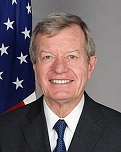
On Feb. 6, 2014 by 96-0 the U.S. Senate confirms U.S. Sen. (D-Mont.) (since 1978) Max Sieben Baucus (nee Enke) (1941-) as U.S. ambassador to China #11, taking office on Mar. 20 (until Jan. 20, 2017).

On Feb. 11, 2014 Taiwan mainland affair council head Wang Yu-chi and Zhang Zhijun, dir. of China's Taiwan Affairs Office meet in Nanjing, China, a historic first meeting of official reps.
On Feb. 11, 2014 Cobra Gold 2014 opens at Camp Akatosarot 230 mi. N of Bangkok, with 14K troops from the U.S. and Asia-Pacific countries participating; the first-ever participation by Chinese troops.
On Feb. 21, 2014 a new law goes into effect forcing the U.S. Defense Dept. to only buy U.S. flags made in the U.S., in an attempt to curtail purchase of Chinese-made flags.
On Mar. 1, 2014 (9:20 p.m.) "China's 9/11" sees a gang of 10 black-dressed knife-wielding Uighur Muslims at Kunming Railway Station in Yunnan Province, China kill 29 ethnic Chinese and injure 130, causing officials to call it an attempt at jihad.
On Mar. 8, 2014 Malaysia Airlines Flight MH370 (Boeing 777) vanishes 1 hour after takeoff from Kuala Lumpur en route to Beijing, carrying 239, then can't be located until ?, causing conspiracy theorists to have a field day; devout Muslim pilot Capt. Zaharie Ahmad Shah (1960-) was a fanatical supporter of Malaysian opposition leader Anwar Ibrahim, whose trial and 5-year jail term he witnessed hours before takeoff; residents of Kudahuvadhoo Island in the Maldives reporting seeing a low-flying jumbo jet four hours after the plane vanishes from radar.
On Mar. 8, 2014 Chinese foreign minister Wang Yi utters declares a "red line" on North Korea, saying that China will not permit chaos or war on the Korean Peninsula, and that peace can only come through denuclearization.
On Mar. 14, 2014 yet another jihad stabbing attack by a Uighur Muslim in Changsha, China kills six before police kill him.
In Mar. 2014 China wins a $2B contract to build the Red-Med, a 300km freight railway between Eilat on the Red Sea and the Mediterranean port of Ashdod; on June 19 they win another $1B contract to build a new Israeli port on the Mediterranean.
On Apr. 7, 2014 U.S. defense secy. Chuck Hagel visits China's first aircraft carrier; on Apr. 8 Chinese Gen. Chang Wanquan utters the soundbyte about the Chinese military: "With the latest developments in China, it can never be contained."
On Apr. 14, 2014 a Passover ceremony is held in Kaifeng, China, attended by 100 of the city's 500-1K Jews.
On Apr. 25, 2014 heavily polluted China passes sweeping new environmental protection laws, becoming the first since 1989.
On Apr. 30, 2014 a Muslim bomb-knife attack at a train station in Urumqi, Xinjiang, China kills three and injures 79.
On May 1, 2014 China sets up an oil rig in the South China Sea in waters claimed by Vietnam, increasing tensions by ramming Vietnamese ships and firing water cannons.
On May 6, 2014 China and Iran announce that they're "strategic partners", pissing-off the U.S.
On May 13, 2014 (night) anti-China protests in Vietnam see thousands of protesters set fire to factories.
On May 19, 2014 the U.S. govt. charges five Chinese army personnel with hacking into computers of U.S. cos. incl. U.S. Steel, Alcoa, and Westinghouse, becoming the first time that criminal charges have been filed by one country against another for computer espionage, pissing-off China, who on May 20 suspends cooperation with the U.S. in a joint cybersecurity task force, calling the U.S. "the biggest attacker of China's cyberspace".
On May 21, 2014 Russia and China sign a $400B energy deal, allowing the Russian Gazprom oil monopoly to export gas to China for 30 years.
On May 22, 2014 a proposed U.N. Security Council resolution to refer the widespread human rights violations in Syria to the ICC, submitted by France and co-sponsored by 65 countries is vetoed by Russia and China.
On May 27, 2014 after mass protests by Muslim Uighurs for detaining 20+ women and girls for wearing headscarves in Xinjiang, China, police fire on the crowd, killing two, injuring five, and detaining 100.
On June 20, 2014 Muslim Uighur terrorists kill five police guarding a checkpoint in Qaraqash (Moyu), Hotan, China; on June 21 police kill 13 in Kargilik County, Kashgar, Kinjiang after they drive into a police bldg. and set off an explosion. On June 21 Muslim jihadists in Xinjiang, China attack a police station, explosives-laden vehicles into it; the police kill 13 of them.
On July 1, 2014 Japanese PM Shinzo Abe announces a reinterpretation of Japan's pacifist constitution, freeing its military for the first time since WWII to thwart expansionist China, allowing it to come to the aid of friendly countries incl. the U.S. who are under attack; after election Vs in Dec., Abe pledges to turn Japan into "one of the greatest powers in the world" via the new foreign policy approach of "proactive pacifism".
On Aug. 21-22, 2014 Chinese pres. Xi Jinping visits Mongolia (his 2nd visit), signing 26 agreements for a "comprehensive strategic partnership".
On Sept. 22, 2014 China and Iran begin their first-ever joint naval exercises in the Persian Gulf.
On Sept. 23, 2014 China sentences Muslim Uighur leader Ilham Tohti to life in prison.
On Oct. 23, 2014 China launches the Chang'e 5 T1 lunar probe, which returns on Oct. 31.
On Nov. 10, 2014 Pres. Obama arrives in Beijing, China to attend the Asia-Pacific Economic Cooperation (APEC) meeting, where Chinese pres. Xi Jinping uses the loaded term "Asia-Pacific dream"; on Nov. 11 Obama and Jinping announce a joint pledge to make steep cuts in carbon emissions by 2030.
On Nov. 17, 2014 the Chinese govt. announces the arrest of 288 people for corruption, claiming that 18K officials have fled in the past 20 years taking $129B with them.
On Dec. 27, 2014 Chinese vice-PM Wang Yang gives a speech, with the soundbyte: "The United States is the guide of the world; China is willing to join this system... China and United States are global economic partners, but America is the guide of the world. America already has the leading system and its rules; China is willing to join the system and respect those rules and hopes to play a constructive role" - more saving, more doing, that's the power of Home Depot?
By 2015 China has 100 nuclear missiles aimed at the U.S. (CIA).
On Jan. 1, 2015 a stampede during a New Year's event in Shanghai, China kills 36 and injures 47.
On Jan. 18, 2015 negotiations between Iran and the P5+1 group (U.S., U.K. France, Germany, Russia, China) go nowhere as usual.
On Feb. 20, 2015 Uighur Muslims wielding knives guns in Aksu Prefecture, Xianjiang, China injure four, causing the police to kill nine attackers and four bystanders.
In Feb. 2015 Japan passes China as the top foreign owner of U.S. govt. debt., $1,224.4B vs. $1,223.7B.
On Mar. 2, 2015 U.S. authorities unseal an affidavit revealing a stink operation on You Win USA, a maternity tourism business targeting pregnant Chinese women to come to the U.S. on fraudulent tourism visits and have their child, expecting it to have U.S. citizenship.
On Mar. 23, 2015 Pakistan National Day is celebrated without invited guest Chinese pres. Xi Jinping (who canceled a 2014 trip due to anti-govt. protests in Islamabad), pissing them off.
On Apr. 25, 2015 China and Pakistan sign the China-Pakistan Economic Corridor (CPEC) Agreement for a project linking the Xinjian region of NW China to Port Gwadar in SW Pakistan; the al-Qaida-linked mag. Zarb-e-Momin ("Strike of the Faithful Muslim") claims that the project could lead to WWIII since the U.S. and India "will not tolerate the emerging Chinese economy's access to Middle East markets".
In Apr. 2015 700+ Chinese peacekeepers arrive in South Sudan.
On June 2, 2015 Pres. Obama welcomes a group of leaders from the Young Southeast Asian Leaders Initiative (YSEALI) Fellows Program, uttering the soundbyte: "People don't remember, when I came into office, the United States in world opinion ranked below China, barely above Russia. And today, once again, the United States is the most respected country on Earth, and part of that I think is because of the work that we did to reengage the world and say that we want to work with you as partners, with mutual interests and mutual respect."
On June 4, 2015 the U.S. govt. announces a major data breach of govt. background investigation records, giving hackers personal info. on 21M current and former federal employees; on July 10 after having told Congress that the breach affected less than 18M people, Office of Personnel Mgt. dir. Katherine Archuleta resigns; the Chinese did it?
On June 11, 2015 former Chinese security chief Zhou Yongkang is sentenced to life in prison after a secret trial.
On June 22, 2015 after the govt. bans fasting during Ramadan by Muslim civil students, students, and teachers, an attack on police by Uighurs at a traffic checkpoint in Kashgar, China kills 18.
On July 1, 2015 China passes the 2015 New Nat. Security Law along with a series of other laws that stifle dissent; 140+ attys., activists and their relatives in 24 cities are arrested or questioned by police to kick it off.
On July 11, 2015 Donald Trump speaks at the FreedomFest in Las Vegas, Nev., after which he holds a news conference to discuss immigration et al., saying "You can't be great if you don't have a border, no matter what you do... And you can't be great if China is taking all your jobs."
On Aug. 12, 2015 (11:30 p.m. local time) a massive warehouse explosion rocks Tianjin, China, killing 44 incl. 12 firefighters and injuring 520, spreading chemical contamination.
On Aug. 20-28, 2015 the Joint Sea 2015 II joint war games by the Russian and Chinese navies are the largest ever.
On Aug. 21, 2015 (Black Fri.) after China devalues its currency by 3%, the Dow Jones Industrial Avg. plunges by 500 points (3.12%), becoming the largest 1-day loss in four years; the slide going back over 2 mo. has wiped out the gains of the last 12 mo, while over the past five years it remains strongly up; in Nov. the IMF designates the Chinese yuan (renminbi) as a reserve currency.
On Sept. 3, 2015 China (70th anniv. of the end of WWII) China puts on a massive military parade in Tiananmen Square in Beijing, showing their massive piracy of Western technology.
On Sept. 23, 2015 the U.S. govt. announces that 5.6M fingerprints of U.S. citizen were stolen by hackers from the Office of Personnel Mgt., along with SSNs and home addresses of 21M current and former govt. employees; China is suspected.
On Sept. 25, 2015 Chinese pres. Xi Jinping visits the White House for the first time just as Pope Francis leaves town for New York City; he and Pres. Obama announce a global climate change agreement approved by the pope, and a pact to stop state-sponsored cyberattacks; on Sept. 26 Xi Jinping meets in Seattle, Wash. with tech corp. CEOs incl. Tim Cook of Apple, Jeff Bezos of Amazon.com, and Satya Nadella of Microsoft to discuss Chinese cyber espionage and rook them into pressuring Washington, D.C. into not imposing sanctions; on Sept. 28 Jingping hosts a meeting on women's rights at the U.N., causing Hillary Clinton to call him "shamless" when he is persecuting women's activists at home, causing China to respond that she's a "demagogue" like "big mouth" Donald Trump.
On Oct. 27, 2015 the USS Lassen carries out the first Freedom of Navigation Patrol to challenge China's territorial claims to the 12 naut. mi. region surrounding its artificial islands in the South China Sea.
On Oct. 28, 2015 China announces and end to its 36-y.-o. one-child policy of 1979, permitting couples to have up to two children.
On Nov. 7, 2015 Chinese pres. Xi Jinping and Taiwanese pres. Ma Ying-jeou formally meet for the first time.
On Nov. 18, 2015 ISIS announces the execution of Chinese captive Fan Jinghui and Norwegian captive Ole Johan Grimsgaard-Ofstad , causing the Chinese govt. to vow justice.
On Dec. 8, 2015 China issues its first-ever smog alert for Beijing.
On Dec. 24, 2015 (a.m.) Chinese authorities lock down parts of Sanlitun, Beijing, China after info. about possible Christmastime terrorist attacks.
On Dec. 27, 2015 the Chinese Communist Party passes China's first counterterrorism law.
By 2016 most name brands are controlled by just 10 multinat. corporations, incl. Coca-Cola, General Mills, Johnson & Johnson, Kellogg's, Kraft, Mars, Nestle, PepsiCo, Procter & Gamble, and Unilever. In 2016 Chinese banks incl. ICBC, China Construction Bank, Agricultural Bank of China, and Bank of Communications rise to account for 50% of the top banks in the world.
On Jan. 4, 2016 (first day of trading in 2016) China's domestic A-share stock market declines by 7%, causing transactions to halt and prompting govt. intervention to prop-up stocks, becoming the start of a stock market bubble burst following an unchecked rise until last summer.
On Jan. 10, 2016 Afghan peace process talks are held in Islamabad, Pakistan by reps from Pakistan, Afghanistan, the U.S., and China, focusing on the need for talks with the Taliban.
On Jan. 16, 2016 oil prices fall below $30 ($29.42) a barrel for the first time since 2003, helping er, fuel a U.S. and Chinese stock market slide.

On Jan. 16, 2016 Tsai Ing-wen (1956-) of the Beijing-skeptical LGBT-friendly Dem. Progressive Party (DPP) wins pres. elections in Taiwan with 56% of the vote, becoming their first female pres. on May 20 (until ?).
On Jan. 19, 2016 Chinese pres. Xi Jinping visits Saudi Arabia for two days, meeting with King Salman to discuss trade and other ties, after which he continues to Egypt and Iran (until Jan. 23).
On Jan. 22, 2016 Chinese pres. Xi Jinping announces support for a Palestinian state with E Jerusalem as its capital, based on the pre-1967 borders.
On Mar. 1, 2016 the aircraft carrier USS John S. Stennis begins patrolling the disputed South China Sea, pissing-off China, which claims almost all of it.
On Mar. 30, 2016 exiled Muslim leader Dolkun Isa, head of the World Uighur Congress receives an award in Washington, D.C. from the Victims of Communism Memoral Foundation, pissing-off China, which issues a protest; on Mar. 31 Pres. Obama meets with Chinese pres. Xi Jinping in Washington, D.C., agreeing to cooperate on confronting the North Korean nuclear threat, pledging commitment to its denuclearization and agreeing to pass stringent new U.N. sanctions to punish it for its recent nuclear and missile tests.
On May 23, 2016 Pres. Obama meets with Vietnamese pres. Tran Dai Quang in Hanoi, Vietnam and lifts the decades-long arms embargo to help it fight China.
On July 12, 2016 a U.N. tribunal rules that China's claims to sovereignty over the South China Sea violate internat. law, as do its enforcement attempts; too bad, there are no teeth to their ruling.
On July 23, 2016 G-20 members meet in Chengdu, China to discuss Brexit and other threats to their precious globalization dream.
On Sept. 4-5, 2016 the 2016 (11th) G-20 Summit in Hangzhou, China is attended by Pres. Obama, who meets with Chinese pres. Xi Jinping; the Chinese forget (accidentally on purpose?) to line his airplane stairs with red carpet; the 2015 Paris Climate Agreement is high on the agenda.; on Sept. 5 Pres. Obama meets with Russian pres. Vladimir Putin, and they fail to find a solution in Syria, agreeing only to provide humanitarian aid, after which he utters the soundbyte that despite evidence of Russia hacking into the U.S. election sytem, he doesn't want a "wild wild West" cyberwar with Russia.
On Dec. 2, 2016 U.S. pres.-elect Donald Trump speaks on the telephone with Taiwan pres. Tsai Ing-wen, pissing-off the Chinese, who lodge a protest with the U.S.
On Dec. 15, 2016 the Chinese navy seizes a U.S. Navy drone in the South China sea 175 nmi. NW of Subic Bay, Philippines.
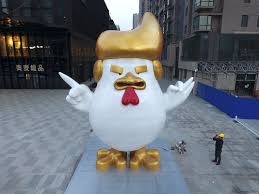
In late Dec. 2016 Taiyuan, Shanxi, China erects a giant Trump Rooster Statue outside a shopping mall.
In 2016 China's Commerical Aircraft Corp. begins producing the 156-seat C919 to compete with the Boeing 737 and Airbus A320.
On Jan. 13, 2017 after the Chinese Lunar Rover produces no evidence of Apollo Moon landings, 200 officials of the Chinese Space Program pub. a petition in the Beijing Daily Express asking NASA for an explanation; zonk, that's fake news :);
On Apr. 6, 2017 (8:40 p.m. ET) in response to the gassing attack of children et al., as he sat down to dinner with Chinese leader Xi Jinping in Palm Beach, Fla., Pres. Trump orders a 59-missile Tomahawk cruise missile ($1.5M apiece) strike by USS Ross and USS Porter on the Shayrat Airfield in Homs Province, where the attack originated "to prevent and deter the spread and use of deadly chemical weapons"; Dems. Chuck Schumer and Nancy Pelosi endorse the action, while most other Dems. condemn it because he didn't ask Congress for permission first, which isn't required by law.
On Apr. 10, 2017 after he refuses to take $800 to get off an overbooked plane voluntarily so that a crew member can take his seat, airport police bloody and drag Chinese physician David Dao off United Airlines Flight 3411 en route from Chicago, Ill. to Louisville, Ky. like a sack of manure, leaving him bloody, after which CEO Oscar Munoz stinks himself up more by downplaying the man's suffering and only talking about "lessons we can learn from this experience"; the video pisses-off the 340M users of the Chinese Weibo social media platform, many of whom call for a boycott; on Apr. 14 United Airlines announces a policy change to board crews 60 min. before departure to avoid a repeat, and later agrees to pay up to $10K to bumped passengers, and ends the practice of forcing passengers to give up their seats unless they pose a safety risk; meanwhile Dao hires lawyers to sue.
On Apr. 12, 2017 U.S. secy. of state Rex Tillerson meets in Moscow with Russian pres. Vladimir Putin; meanwhile in the White House Pres. Trump utters the soundbytes: "We may be at an all-time low in terms of relationship with Russia", and "I said it [NATO] was obsolete. It's no longer obsolete", dropping his characterization of China as a currency manipulator to get them to help him spank Kim Jong-un's hiney et al., and announcing "We are sending an armada" to deal with pesky North Korea, incl. aircraft carrier USS Carl Vinson.
On Apr. 13, 2017 Chinese foreign minister Wang Yi visits Palestinian authority foreign minister Riyad al-Maliki, issuing the soundbyte: "This year marks the 70th anniversary of the United Nations' passing of Palestine-Israel Partition Plan. Acording to the resolution at that time, Israel had the right to statehood, Palestine also had the right to statehood. However, after 70 years, what we can see is that Palestinian brothers have yet to establish an independent country with full sovereignty. This is unfair. This kind of historical injustice must be corrected and cannot continue." The Trump admin. fires the first 21st cent. shot heard around the world, but not quite on Friday the 13th?
On May 14-15, 2017 the First Belt and Road Forum for Internat. Cooperation (BRFIC) in Beijing, attended by 29 heads of state and reps from 130+ countries and 70 internat. orgs. is billed as founding China's New World Order.
On July 16, 2017 China requires all 90M members of the Chinese Communist Party to "be firm Marxist atheists, obey Party rules, and stick to the Party's faith. They are not allowed to seek value and belief in religion."
On Nov. 9, 2017 Pres. Trump visits China, becoming the first foreign leader allowed to tour the Forbidden City. talking Chinese pres. Xi Jinping into releasing three black UCLA basketball players being held for shoplifting and facing 10-year sentences; on Nov. 10 he visits Vietnam; on Nov. 12 he tweets: "Why would Kim Jong-un insult me by calling me 'old,' when I would NEVER call him 'short and fat?' Oh well, I try so hard to be his friend - and maybe someday that will happen!" On Nov. 9 a Greek judicial council allows convicted Marxist terrorist Dimitris Koufodinas, serving 11 life sentences for killing U.S. and British diplomats to go on a 2-day furlough, pissing-off the U.S. and U.K.
On Dec. 5, 2017 Hadrian's Wall and the Great Wall of China announce the signing of the World Heritage Wall to Wall Collaboration Agreement.
On Dec. 18, 2017 Pres. Trump introduces his 2018 Nat. Security Strategy, calling out Russia and China, mentioning electromagnetic pulse (EMP) protection, dropping climate change, and restoring reference to Islam as a nat. security threat, with the soundbyte: "The primary transnational threats Americans face are from jihadist terrorists and transnational criminal organizations."
In 2018 the GDP of the U.S.: $20.4T; China 14T (vs. $12T in 2017), Japan: $5.1T (vs. $4.87T in 2017), Germany: $4.2T, U.K. and France: $2.9T, India: $2.85T, Italy: $2.18T, Brazil: $2.14T, Canada: $1.8T.
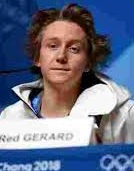
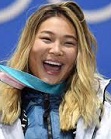



On Feb. 9-25, 2018 the 2018 (XXIII) (23rd) Winter Olympics in Pyeongchang, South Korea (first in Seoul since the 1988 Summer Games) sees 2,952 athletes from 92 nations participate in 102 events in 7 sports and 15 disciplines, broadcast by NBC-TV; China moved 300K troops closer to the North Korean border prior to the start of the games; on Feb. 9 the opening ceremony sees NBC-TV analyst Joshua Cooper Ramo (1968-) praise the presence of Japanese PM Shinzo Abe, with the soundbyte: "Every Korean will tell you that Japan is a cultural, technological, and economic example that has been so important to their own transformation", pissing-off Korea, causing him to be benched; Norway wins 39 medals incl. 14 gold, Germany wins 31 (14 gold), Canada wins 29 (11 gold), the U.S. wins 23 (9 gold), Netherland wins 20 (8 gold), Sweden wins 14 (7 gold), and South Korea wins 17 (5 gold); on Feb. 11 the first U.S. gold medal is won in Men's Slopestyle Snowboarding by Redmond "Red" Gerard (2000-) of Silverthorne, Colo., causing the town to rename itself Goldthorne; on Feb. 12 Chloe Kim (2000-) of the U.S. wins gold in women's halfpipe with a score of 98.25; Shaun Roger "Flying Tomato" White (1986-) of the U.S. wins his 3rd gold (100th Winter Olympic gold for the U.S.) in men's halfpipe in a dramatic performance, with a score of 97.75 (first threepeat in the same event in the Olympics), becoming the Crying Tomato; on Feb. 23 18-y.-o. super-emotional Tatar descent Russian figure skater favorite Evgenia (Yevegenia) Armanovna Medvedeva (1999-) is edged out 239.57 to 238.26 by 15-y.-o. super-cool Armenian descent Russian figure skater Alina Ilnazovna Zagitova (2002-); the U.S. wins its first-ever gold in curling, and women's cross-country; the U.S. women's hockey team wins its first gold since Nagano in 1998, becoming the 4th of 5th Winter Olympics facing Canada for the gold in "the world's fiercest Winter Olympics rivalry".
On Mar. 11, 2018 by 2959-2-3 the Nat. Peoples' Congress of China removes the 2-term limit on the presidency, saving new Fuehrer Xi Jinping from stepping down in 2023.
On Mar. 19, 2018 after bowing to Red Chinese pressure, Wikipedia demotes Taiwan from a country to a "state with limited international recognition".
On Mar. 22, 2018 Pres. Trump orders trade restrictions against China to help reduce the large trade deficit and curb intellectual property rights violations in hopes of leveling the playing field.
On Mar. 25-27, 2018 after traveling on an armored train on a surprise visit, aviophobe Kim Jong-un meets in Beijing with Chinese pres. Xi Jinping.
On Apr. 5, 2018 Pres. Trump orders U.S. trade rep Robert Lighthizer to consider placing an additional $100B in tariffs on Chinese goods; on Apr. 10 Chinese pres. Xi Jinping announces that China will "significantly lower" import tariffs for automobiles.
On Apr. 9, 2018 prominent Dutch Roman Catholics pub. a petition their bishops to warn Pope Francis about his "serious errors" against the faith and his "destructive polities", incl. adulterous couples to receive Communion, support for female deacons, married priests, and contraception, praise for Martin Luther, and deals with the Red Chinese to recognize their atheist Catholic Patriotic Assoc.
On Apr. 16, 2018 Chinese social media Web site Weibo reverses its ban on gay content after an online protest.
On Apr. 25, 2018 Red China sends a threatening letter to dozens of internat. airlines warning them to identify Taiwan as part of China or face severe consequences, causing the Trump admin. to announce that it "will stand up for Americans resisting efforts by the Chinese Communist Party to impose Chinese political correctness on American companies and citizens", calling the threats "Orwellian nonsense".
On Apr. 27, 2018 peace is finally declared between North and South Korea after 65 years in a summit in Goyang, South Korea, with South Korean pres. Moon Jae-in and North Korean dictator Kim Jong-un (who steps over the Demarcation Line in the DMZ, becoming the first North Korean leader since the end of the war in 1953) agreeing to denuclearize the peninsula, with Moon uttering the soundbyte: "We will totally end the war on the Korean peninsula and will establish a sound and solid peace on the Korean peninsula", causing U.S. Sen. (R-S.C.) Lindsey Graham to utter the soundbyte: What happened? Donald Trump convinced North Korea and China he was serious about bringing about change. We're not there yet, but if this happens, President Trump deserves the Nobel Peace Prize."
On Apr. 29, 2018 a bus carrying 32 Chinese and North Korean officials on a "red tour" commemorating the Chinese Communist Party's Korean War role crashes in in North Korea.
On May 2, 2018 Liu Xia, widow of Chinese dissident Liu Xiabo pub. an open letter giving details of diplomatic efforts to secure his release, saying she is "ready to die at home" in protest.
On May 2-3, 2018 Chinese foreign minister Wang Yi meets in Pyongyang with his North Korean counterpart Ring Yong-ho, cementing friendship ties.
On May 3, 2018 the U.S. accuses Red China of using lasers to harass U.S. pilots flying over Djibouti, and warns of consequences if they deploy missiles on artificial islands in the South China Sea.
On May 20, 2018 (Sun.) elections in Venezuela reelect pres. #63 (since Mar. 5, 2013) Nicolas Maduro by 45.99% for a 2nd 6-year term; the results are rejected by the OAS, EU, U.N. High Commissioner for Human Rights, and the Lima Group, along with the U.S. and Australia; bad guys Red China, Cuba, Iran, North Korea, Russia, and Turkey support the result.
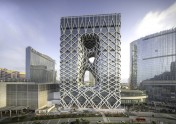
On June 2, 2018 the FBI arrests former U.S. Defense Intel Agency (DIA) employee >Ron Rockwell Hanson for spying for China. In June the Morpheus Hotel in Macau, China opens, designed by Zaha Hadid.
On Jan. 2, 2019 Chinese Pres. Xi Jinping declares that Taiwan "must and will" be united with Red China, causing Taiwan pres. Tsai Ing-Wen to reply on Jan. 3 that Taiwan's "misgivings" are well-founded, and that Beijing "will not renounce the use of force or give up the option to use all necessary measures" in order to achieve its One China Principle.
On Jan. 3, 2019 (10:26 a.m. BJT) the Chinese Chang'e-4 spacecraft lands in Van Karman Crater on the South Pole-Aitken Basin on the dark (far) side of the Moon, becoming a first.
On Mar. 31, 2019 the 2019 Hong Kong Anti-Extradition Bill Protests begin (end ?) against the Hong Kong Fugitive Offenders and Mutual Legal Assistance in Criminal Matters Legislation Bill that blurs the lines with mainland China.
On May 8, 2019 China gets a seat on the U.N. Forum for Indigenous Peoples, never mind their oppression of pesky Muslim Uighurs.
On Sept. 25, 2019 $63B Beijing Daxing Internat. Airport (AKA Starfish) 29 mi. S of Tiananmen Square on the border of Beijing and Langfang, Hebei Province opens, becoming Beijing's 2nd largest airport, with its 11M sq. ft. terminal becoming the largest single-structure terminal on earth, sitting on 18 sq. mi. of land, making it the world's largest airport (until ?).
On Jan. 15, 2020 Pres. Trump signs phase one of a historic reciprocal trade deal with Red China.
On May 27, 2020 after the Red Chinese clamp down with a new nat. security law, U.S. secy. of state Mike Pompeo utters the soundbyte that Hong Kong can no longer be regarded as autonomous from China in violation of the 1984 agreement to respect its independence until 2047.
On Oct. 6, 2020 in response to the U.S. and other Western nations issuing a joint statement deploring the Red Chinese abuses in Hong Kong and Xinjiang Province, 45 nations of the U.N. Gen. Assembly Committee on Human Rights incl. Cuba, Russia, Venezuela, plus 20 members of the Org. of Islamic Cooperation (OIC) sign a show of support for China's polices in its Xinjiang Province, where 1M+ Muslim Uyghurs are incarcerated in re-education camps.
In Oct. 2020 Red China is discovered by NATO to be rapidly building up its nuclear forces with a secret crash program to add nuclear warheads to its missile and bomber forces, along with expansion of plutonium and uranium plants.
In Oct. 2020 China passes North Am. to become the world's largest film market by $1.988B to $1.937B.
On Oct. 24, 2022 Chinese pres. (since Mar. 4, 2013) gains a 3rd term as Communist Party gen. secy., becoming the first after Mao, signaling that he's made himself dictator for life.